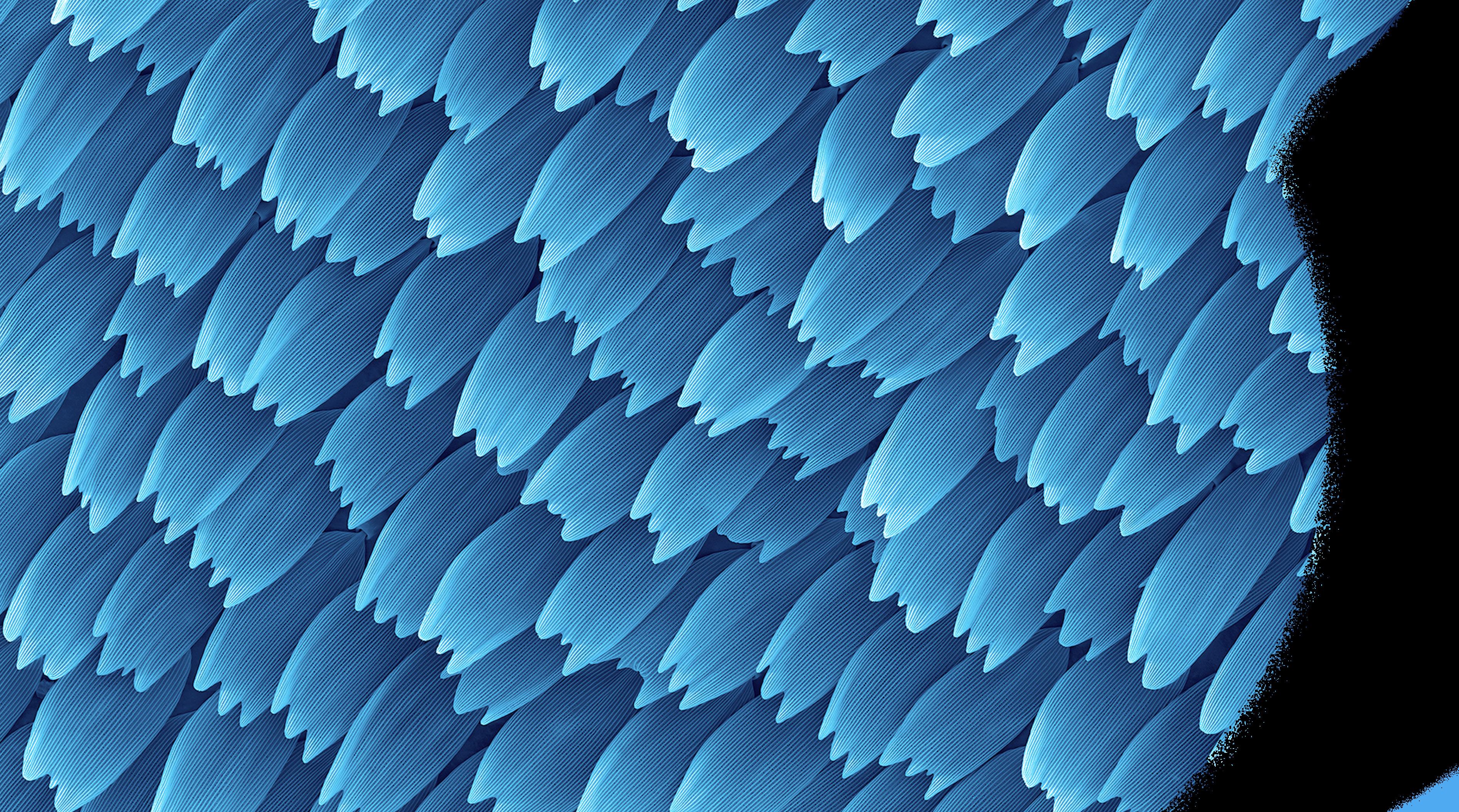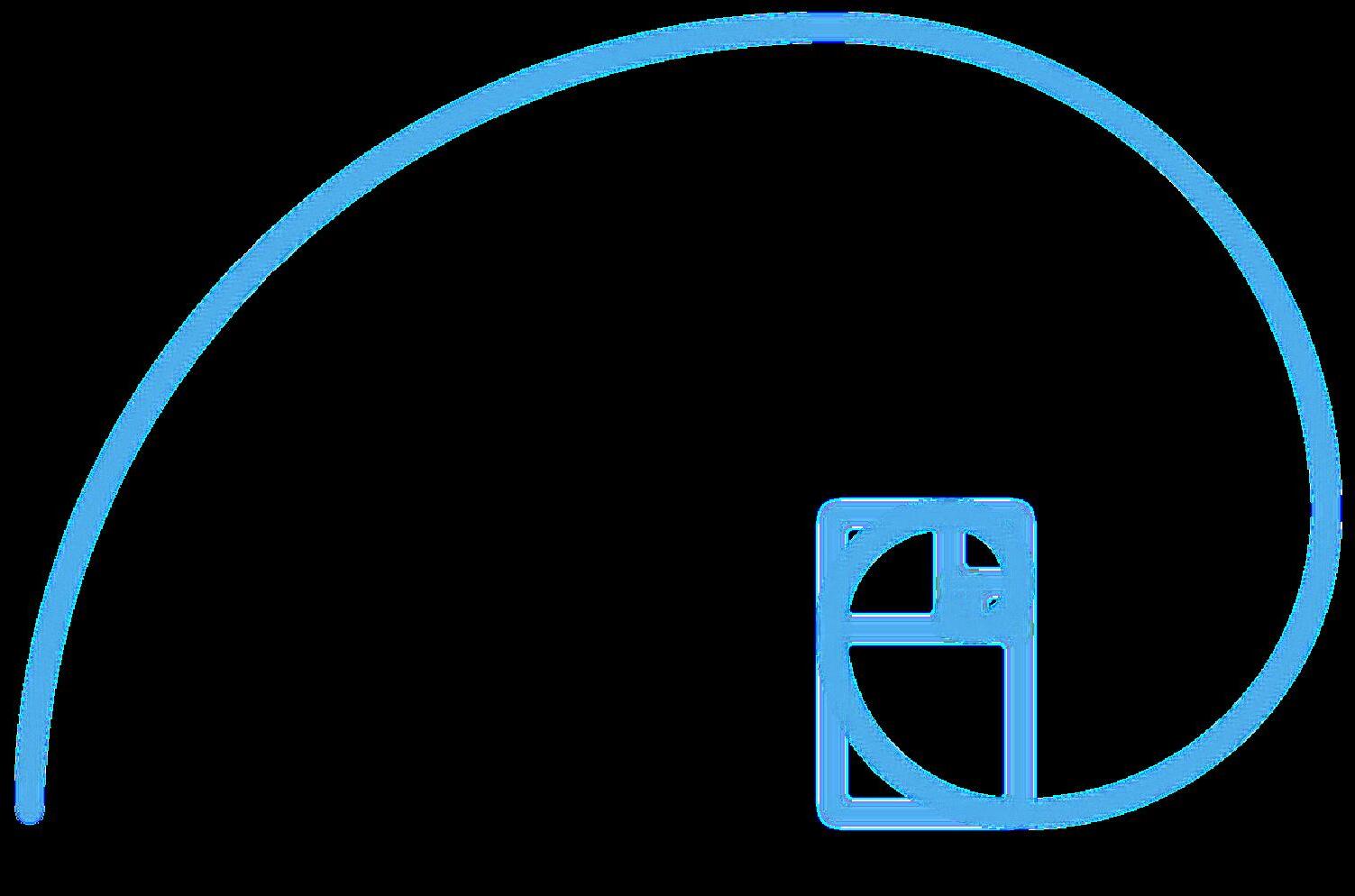
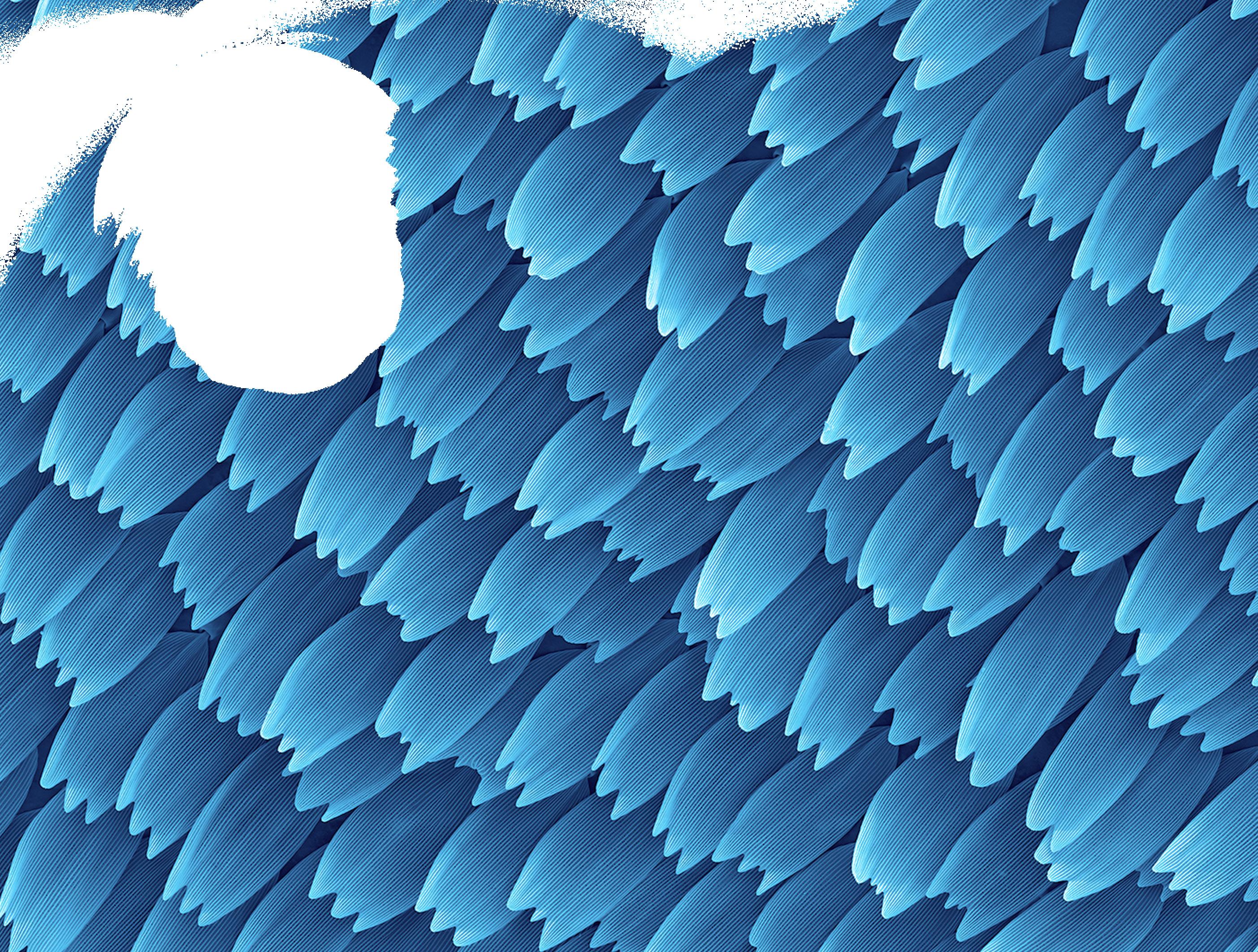




Nature has the answers to the world’s big problems. But Nature needs assistance.
At the Wyss Institute, we believe only a force of Nature focused on human and planetary health – an organization of passionate people driven by genius, impatience, hope, and biologically inspired engineering – can help.

We are that force of Nature.


The past year has been another remarkable chapter for the Wyss Institute, marked by both unprecedented challenges and exciting new directions. The actions of the Trump administration caused tremendous angst at Harvard, and particularly among our community of international scientists who are the engine of scientific innovation at research universities and hospitals across our nation. Yet across nearly every front, we have seen progress, from advancing our technologies toward real-world applications for patients and the planet, to witnessing breakthroughs at our startups that once seemed almost unimaginable.
Over the past year, we launched the Diagnostics for Human and Planetary Health Platform, a bold new initiative addressing urgent challenges in healthcare and the environment. At the same time, we welcomed Natalie Artzi as our first-ever Associate Institute Director, along with new Associate Faculty members Di Feng and Ahmad (Mo) Khalil, expanding the leadership and expertise that will shape our future.
Our startups also advanced at an extraordinary pace. Prapela earned FDA clearance for its neonatal opioid withdrawal device, a first of its kind. Gameto’s technology achieved its first live birth, a milestone for reproductive medicine. Unravel Biosciences received approval for its first human trial in Rett syndrome. eGenesis cleared the way for expanded clinical trials in xenotransplantation. And Emulate’s Organ Chip technology was cited by the FDA as an example of how it plans to replace animal testing in drug development over the next five years. These successes embody the Wyss Effect: transforming visionary ideas into tangible impact.
Even as we celebrated these achievements, the Wyss was impacted by the federal government’s April 14th funding pause, which froze more than $2 billion in research across Harvard University. At the Wyss, tens of millions of dollars in critical funding were abruptly halted, putting groundbreaking projects, from radiation countermeasures to early ALS detection, on hold. For patients awaiting solutions, these delays are measured not in dollars but in time and lives.
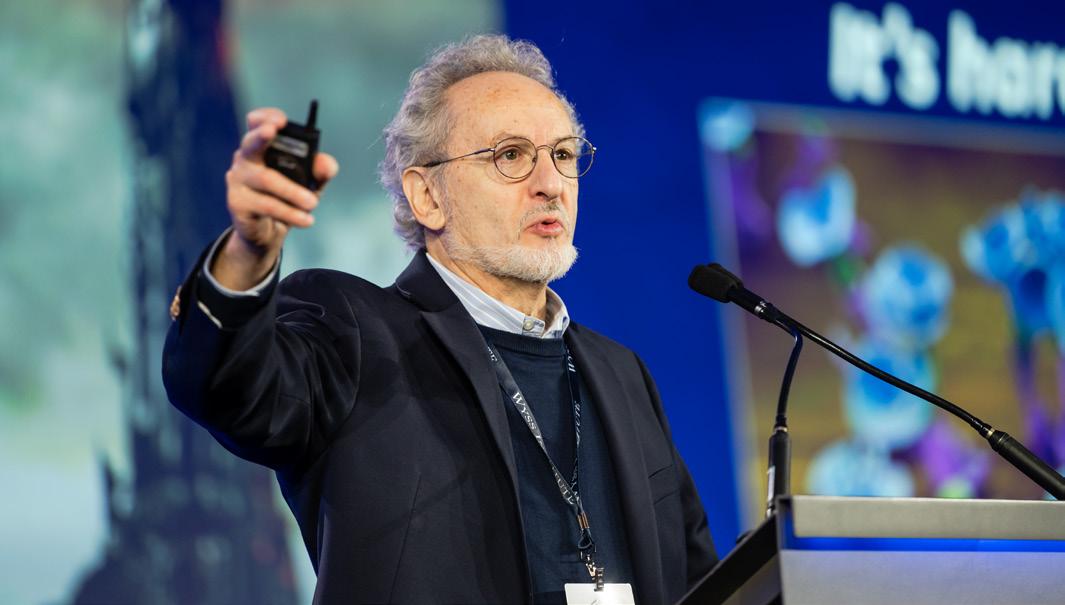
This pause underscored a painful truth: scientific progress is fragile when public trust and public investment waver. Research momentum cannot simply be turned off and on again. Yet it also revealed the extraordinary resilience of our community.
In the face of uncertainty, we spoke out forcefully about what was at stake – for science, for U.S. competitiveness, and most importantly, for patients. And the message was clear: we will not stop innovating.
The Wyss community and our supporters responded with urgency and generosity, stepping up to sustain critical work and affirming that the future of science rests on collective commitment. Their belief in us strengthens our resolution: that the world cannot wait for life-changing solutions.
This year has reaffirmed the mission on which the Wyss Institute was founded – to harness the power of science and engineering to transform medicine and enable sustainability. It has also reminded us that progress is not inevitable. It requires resolve, creativity, perseverance, and the support of people who share our vision.
To all who believe in this mission, we thank you. Your partnership makes it possible for us to dream boldly, act decisively, and keep pushing the boundaries of what’s possible for patients and the planet.
Together, we will not only endure, but lead.
Sincerely,

Don Ingber, M.D., Ph.D.
Founding
Director
and Core Faculty Member, Wyss Institute; Judah Folkman Professor of Vascular Biology, Harvard Medical School and Boston Children’s Hospital; Hansjörg Wyss Professor of Biologically Inspired Engineering, Harvard John A. Paulson School of Engineering and Applied Sciences

The Wyss Institute powers core scientific breakthroughs that move science forward to create a positive impact for life on earth. Breakthroughs that redefine what’s possible in the world. We see direct impact through the great work of our startups and technologies, and indirect impact as our innovation helps drive the science of others.
That innovation becomes a catalyst for a cascade of advances in science, engineering, and technology, which is further magnified by our faculty who have committed their lives to helping shape new scientists and engineers who will transform our world.

Prapela has already helped treat more than 386 babies
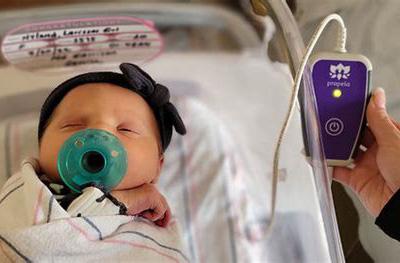
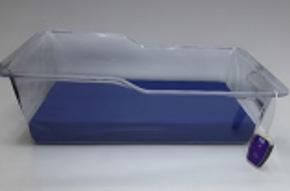
2018
Prapela Launched
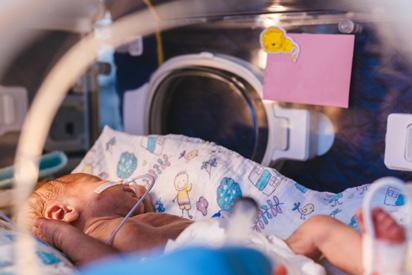

2015
John Konsin, former Wyss startup advisor, co-founded Prapela with Paydarfar and Jim Niemi, Wyss Staff Engineer.
Clinical Collaboration
After receiving NIH funding, Wyss team demonstrated therapeutic effects through clinical studies at UMass Medical Center and BIDMC. UMass study showed technology could aid infants born with neonatal opioid withdrawal syndrome (NOWS).
2023
Breakthrough Device
Prapela obtained FDA Breakthrough Device Designation to help infants with apnea. Additional trials at five hospitals demonstrate improved outcomes in infants with NOWS.

2025
FDA Clearance
Prapela’s SVS hospital bassinet pad granted FDA De Novo clearance as first medical device to treat NOWS.
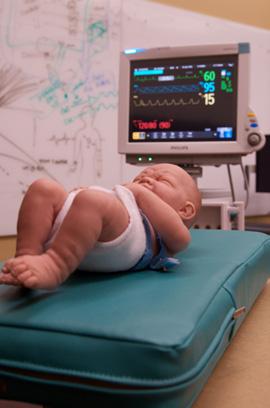
2009
Project Initiation
David Paydarfar, former Wyss Faculty, led an interdisciplinary team to develop “stochastic resonance” vibrating mattress prototype to treat infant apnea.

Dear Friends and Colleagues,
It is a privilege to write to you for the first time as Associate Institute Director of the Wyss Institute. I stepped into this role at a time when the Institute, like many research organizations, is navigating a complex funding environment and natural cycles of change. What has stood out most to me in my first few months in this new role is the strength, creativity, and resilience of our entire community.
This resolve from the entire Wyss ecosystem has deepened my commitment to fostering collaboration, mentorship, and impact. It has also opened opportunities to strengthen partnerships across academia and industry, attract resources, and broaden our reach.
In these first months, we began building programs in targeted drug and nucleic acid delivery, initiating conversations with additional pharmaceutical partners, and taken steps toward new cross-disciplinary collaborations. In the near future, I will be reaching out to many of you to enlist your help in these activities, and I hope I can count on your support and participation.
I invite partners from all sectors to join us in addressing critical medical, technological, and sustainability challenges. Together, we can turn bold ideas into reality and create a healthier, more sustainable future.
With gratitude,

Natalie Artzi, Ph.D.
Associate Institute Director
and Core
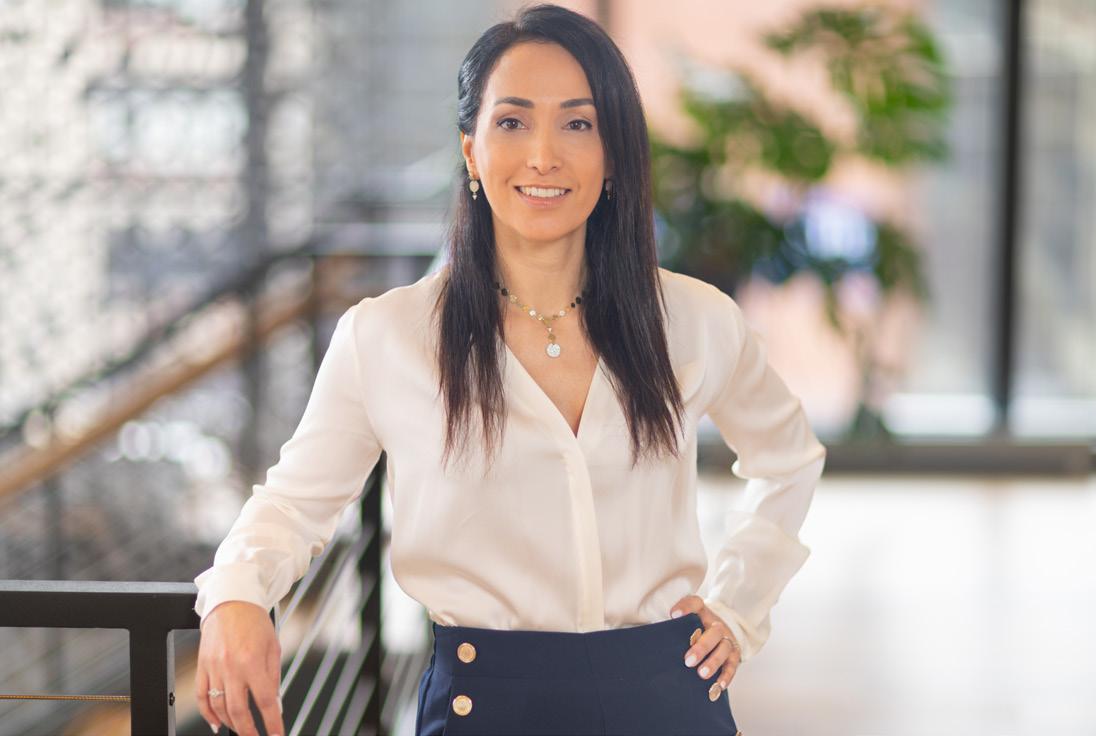
This year, Natalie Artzi and Core Faculty member Samir Mitragotri, along with Senior Director, Translational R&D Ken Carlson, and Senior Scientist Dima TerOvanesyan, founded the Targeted Nucleic Acid Delivery Working Group. The new forum brings together investigators from across the Wyss community, spanning biomaterials, bioengineering, immunology, and computational biology, to integrate the Institute’s expanding arsenal of tissue-specific and systemic structural nanomedicines with emerging therapeutic modalities such as mRNA, CRISPR, and next-generation immunotherapies.
Faculty,
Wyss Institute at Harvard University; Hansjörg Wyss Professor of Biologically Inspired Engineering, Department of Medicine, Harvard Medical School and Brigham and Women’s Hospital
In addition to identifying promising delivery–payload matches for specific disease applications, the group is forging connections with industry and engaging external leaders, including Kevin Fitzgerald, CSO of Alnylam, and Art Krieg, CEO of Zola Therapeutics, who joined a focused breakout session at the 2025 Wyss Retreat. Looking ahead, the Working Group plans to launch collaborative seed projects and host a seminar series with thought leaders in the field, further positioning the Wyss as a driver of innovation and translation in nucleic acid therapeutics.
The past year has been another remarkable chapter for the Wyss Institute, marked by both operational shifts and exciting new directions. Across nearly every front, we’ve seen progress – from advancing our technologies toward real-world applications for patients and the planet into the marketplace, to witnessing breakthroughs at our startups that once seemed almost unimaginable. The following highlights showcase some of the most significant developments from a dynamic year.
The Institute launched the new Diagnostics for Human and Planetary Health Platform to address and help solve important healthcare and environmental challenges.
Natalie Artzi was appointed as the first-ever Associate Institute Director of the Wyss Institute. Di Feng and Ahmad (Mo) Khalil were appointed as new Associate Faculty members.
Prapela’s SVS hospital bassinet pad was granted FDA De Novo clearance as the first medical device to treat neonatal opioid withdrawal syndrome. (Page 5)
Gameto achieved the first live birth using Fertilo. The technology was cleared for use in six countries, and the FDA granted clearance for Phase 3 clinical trials. (Page 14)
After a third successful kidney xenotransplant, eGenesis received FDA clearance for an expanded
Unravel Biosciences
its first human clinical trial modifying drug for Rett Syndrome. (Page 24)
Wyss startups and received regulatory approval the FDA announced plans to phase out animal testing over the next 3–5 years, citing the success of the Emulate Liver Chip as a paradigm for the future of biomedical research. (Page 46)

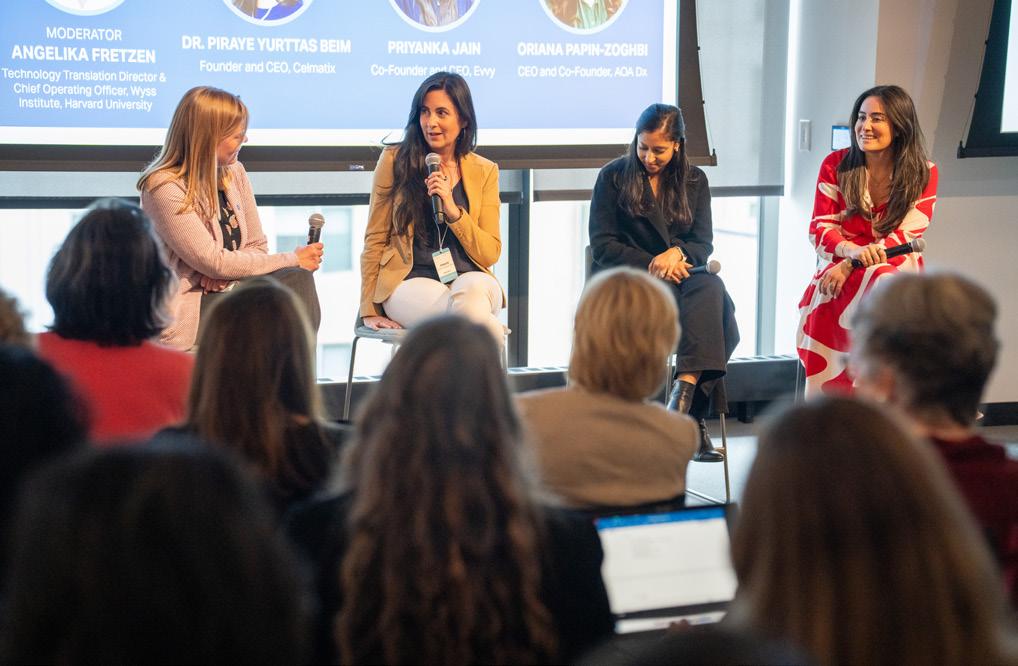
The Wyss hosted the Women’s Health Access Matters (WHAM) Spring Forum, fostering a community of researchers, industry leaders, investors, and advocates aligned to advance women’s health innovation. (Page 19)
ARPA-H awarded funding through its Sprint for Women’s Health to Wyss researchers developing iNodes, implantable lymphoid organs made from a patient’s own cells, to treat ovarian cancer. (Page 17)

launched, with initial philanthropic investment from The Colossal Foundation, to support the development of breakthrough therapies able to delay, or even reverse, age-related conditions. (Page 23)
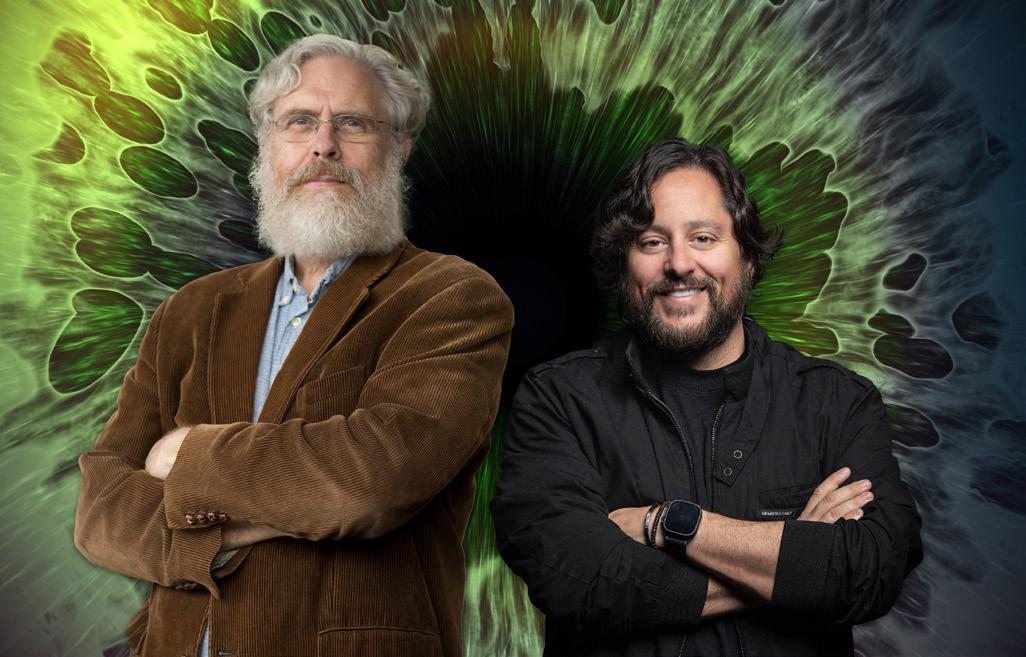
With support from Sanofi, a Wyss DxA-formed team initiated an asthma biomarker discovery effort to enable timely diagnosis in difficult patient populations. (Page 23)
Brain transport shuttles developed by the Wyss Brain Targeting Program that efficiently deliver therapeutics across the blood-brain barrier were licensed to five major companies in the field. Building on this success, the Brain Targeting Program is launching its Brain-Targeted Therapeutics Catalyst to leverage these shuttles to develop novel brain-targeted drugs and make them broadly available to industry, academia, and government. (Pages 25 & 27)
A multidisciplinary Wyss team, supported by a DARPA-ABC contract, initiated work to develop anesthetics that can be administered in the field without an anesthesiologist. (Page 26)
A Wyss team, supported by the Robert Packard Center for ALS Research at Johns Hopkins, The Michael J. Fox Foundation for Parkinson’s Research, and Open Philanthropy, is developing a highly sensitive test to detect rare genetic signals of ALS early, before major symptoms manifest. (Page 27)
The DARPA SHIELD program awarded funds to create a treatment that could whisk away pathogens circulating in the blood before they can become life-threatening. (Page 28)
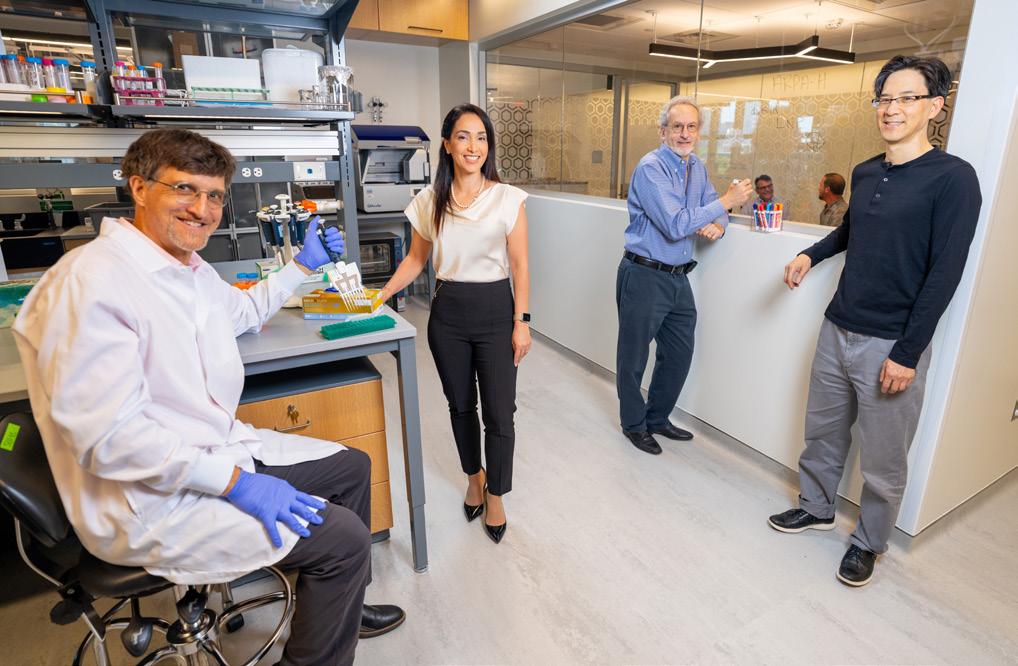
A team led by Wyss faculty and staff, with support from ARPA-H, is developing a novel disease-agnostic RNA immunotherapy that powerfully activates the innate immune system to attack many cancers and multiple viral infections. (Page 30)
Patient-specific Esophageal Organ Chips actionably predicted patients’ chemotherapy responses, opening an entirely new approach to personalized medicine. (Page 31)
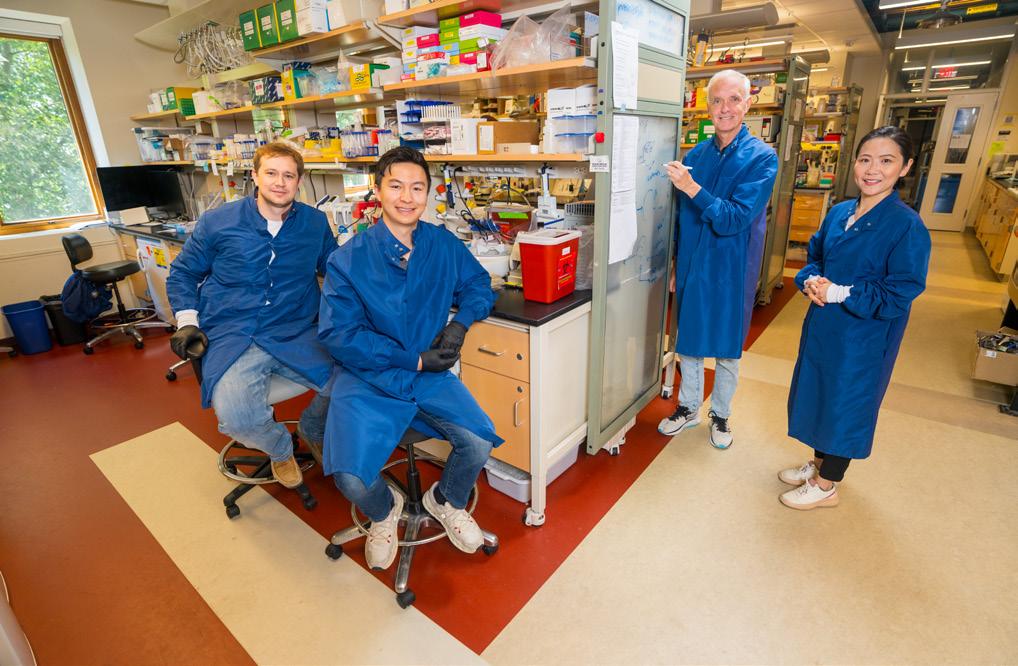
Gerstner Philanthropies committed funding to SPEEDR, a platform that uses engineered microbes to degrade commonly used PET plastic and convert it into a fully compostable bioplastic. (Page 35)
Project Air, the first technology team supported through the Wyss alliance with the Collaborative Fund, is working to commercialize SNIFFIA, a bioinspired air-monitoring system. (Page 35)
Through our alliance model, Northpond Ventures supported our Lab-on-a-Molecule and AminoX teams, advancing them towards commercialization. (Page 36)
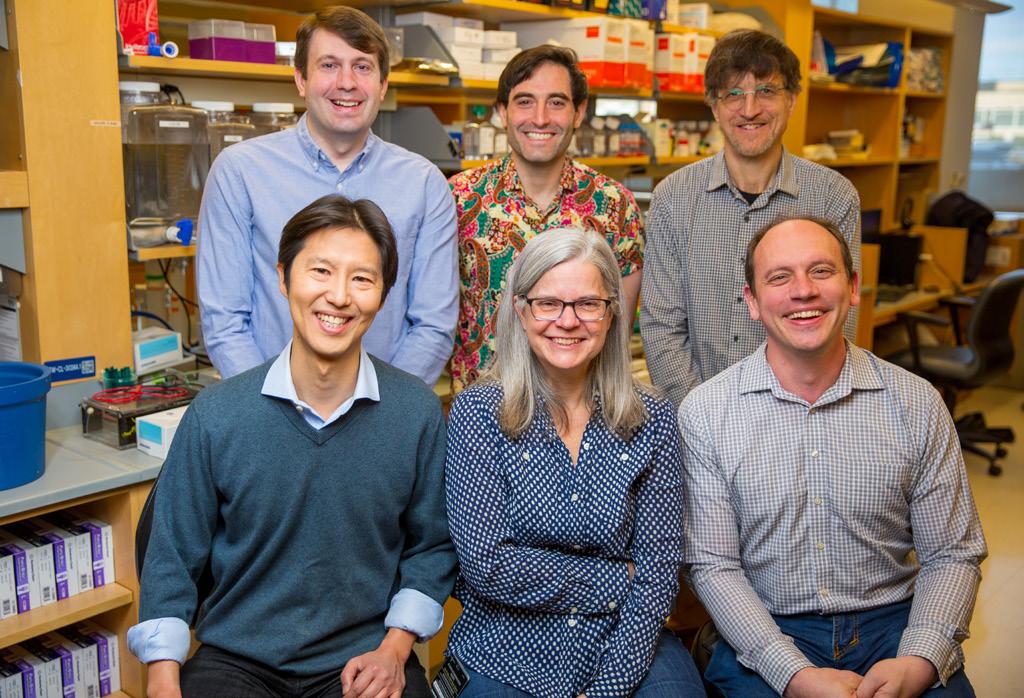
Three Spark Awards are powering early-stage Wyss research to improve patient outcomes in endometriosis, childhood cancer, and tuberculosis. (Page 40)
The newly launched AI DataHub enables life science companies to develop and validate AI tools using AI algorithms and richly annotated, translational datasets created at the Wyss. (Page 43)
The Institute provided Validation Project funding to 14 teams to further develop, validate, and de-risk innovations with potential for realworld impact. (Page 45)

Natalie Artzi, 2025 Alexander M. Cruickshank Lectureship Award, Gordon Research Conference
Elliot Chaikof, 2025 Elected Fellow, American Academy of Arts and Sciences
Jennifer Lewis, 2025 James Prize in Science and Technology Integration, Council of the National Academy of Sciences
Samir Mitragotri, 2025 Elected Fellow, American Academy of Arts and Sciences
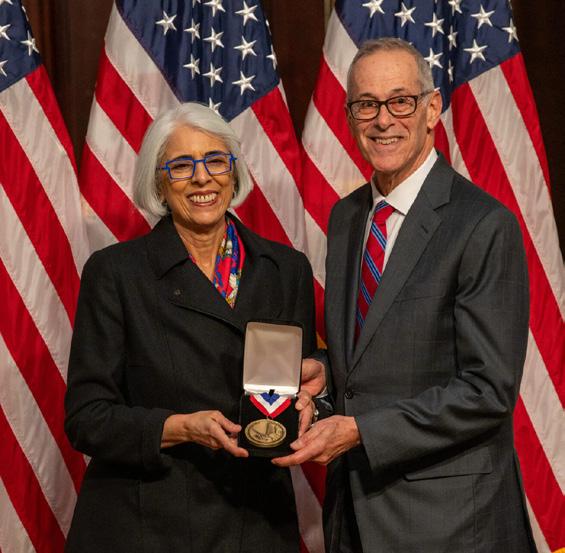
David Walt, 2024 National Medal of Technology and Innovation, National Science Foundation

On Friday, April 11, we at the Wyss Institute welcomed more than 550 researchers, clinicians, entrepreneurs, and industry leaders to our Annual Retreat, celebrating breakthrough scientific and engineering advances. The following Monday, the U.S. government issued a sweeping pause on new and existing federal contracts and grants to Harvard University.
In an instant, more than $20 million that were funding programs housed at the Wyss, and more across Harvard, were abruptly halted without cause, regardless of progress, promise, or urgency. Over the following weeks, additional cuts resulted in cessation of more than $2 billion in research funding across the University. At the Wyss, active projects were locked in limbo. Tragically, as a result, future patients who stood to benefit from transformative breakthroughs would have to wait even longer.
to study the effects of microgravity and radiation. Another project, led by David Walt, in partnership with the National Institute of Health (NIH), aimed to detect elusive RNA signatures in patients with ALS and frontotemporal dementia using single-molecule imaging. This platform could have enabled earlier diagnosis, better monitoring, and faster development of therapeutics.
The consequences cascade outward. For those exposed to radiation – civilians or military – the lack of countermeasures could mean the difference between life and death. For those with ALS, every delay in diagnosis narrows the window for intervention. These are not hypothetical projects; our teams were diligently working, scaling, and moving toward applications – until they weren’t.
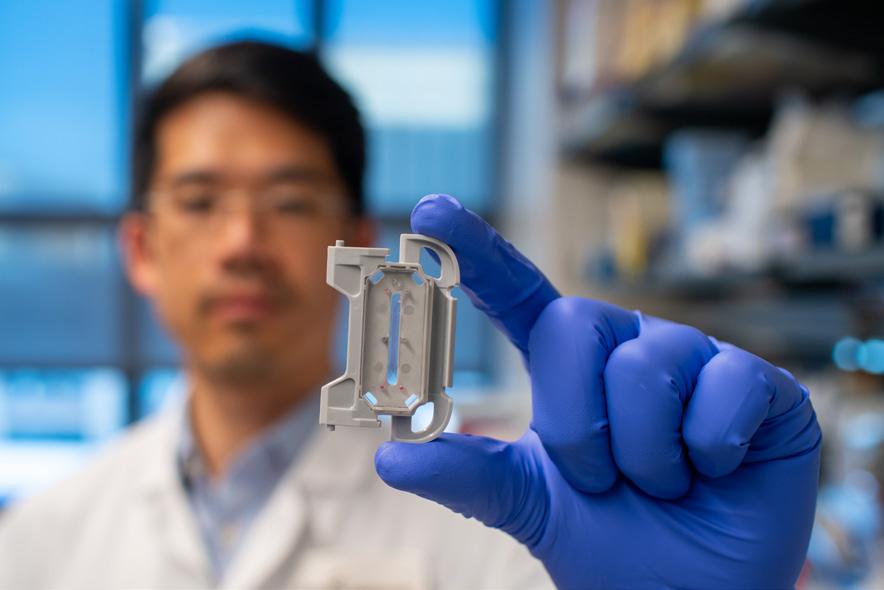
Additional government funding was also paused, impacting areas as diverse as synthetic biology approaches to cancer microbiota, the ex vivo engineering of transplantable kidneys, and real-time imaging of brain tissue. Existing collaborations between the Wyss, Dana-Farber Cancer Institute, and Mass General Hospital to engineer biomaterials that supercharge the immune system’s ability to fight cancer were halted.
Among the hardest-hit projects were three that addressed life-altering conditions. Two projects, carried out by a team led by Don Ingber and supported by BARDA, used human Organ Chips to model radiation injury in the body and develop countermeasure therapeutics that are vital for national security, cancer treatments, and space travel. As part of one of the projects, which was also supported by NASA, the team was to build bone marrow chips with cells from astronauts on the upcoming ARTEMIS II mission, and then to fly alongside them to the moon as personal avatars
There is no practical way to rewind and simply press play from where we left off; scientific progress is not a switch to flip back on. Cells die. Teams and know-how disperse. Experiments lose momentum. This is not just a funding lapse; it’s a breakdown of the publicacademic pact that propelled America’s leadership in science, engineering, and medicine. Leadership that has powered our economic engine for more than half a century, which is now in jeopardy. Most importantly, it means delayed treatments and care for patients who cannot afford to wait.
When federal funding was paused, Wyss Institute leadership and supporters didn’t wait. Their reaction was swift and direct, underscoring not only what’s at stake, but also what’s possible.
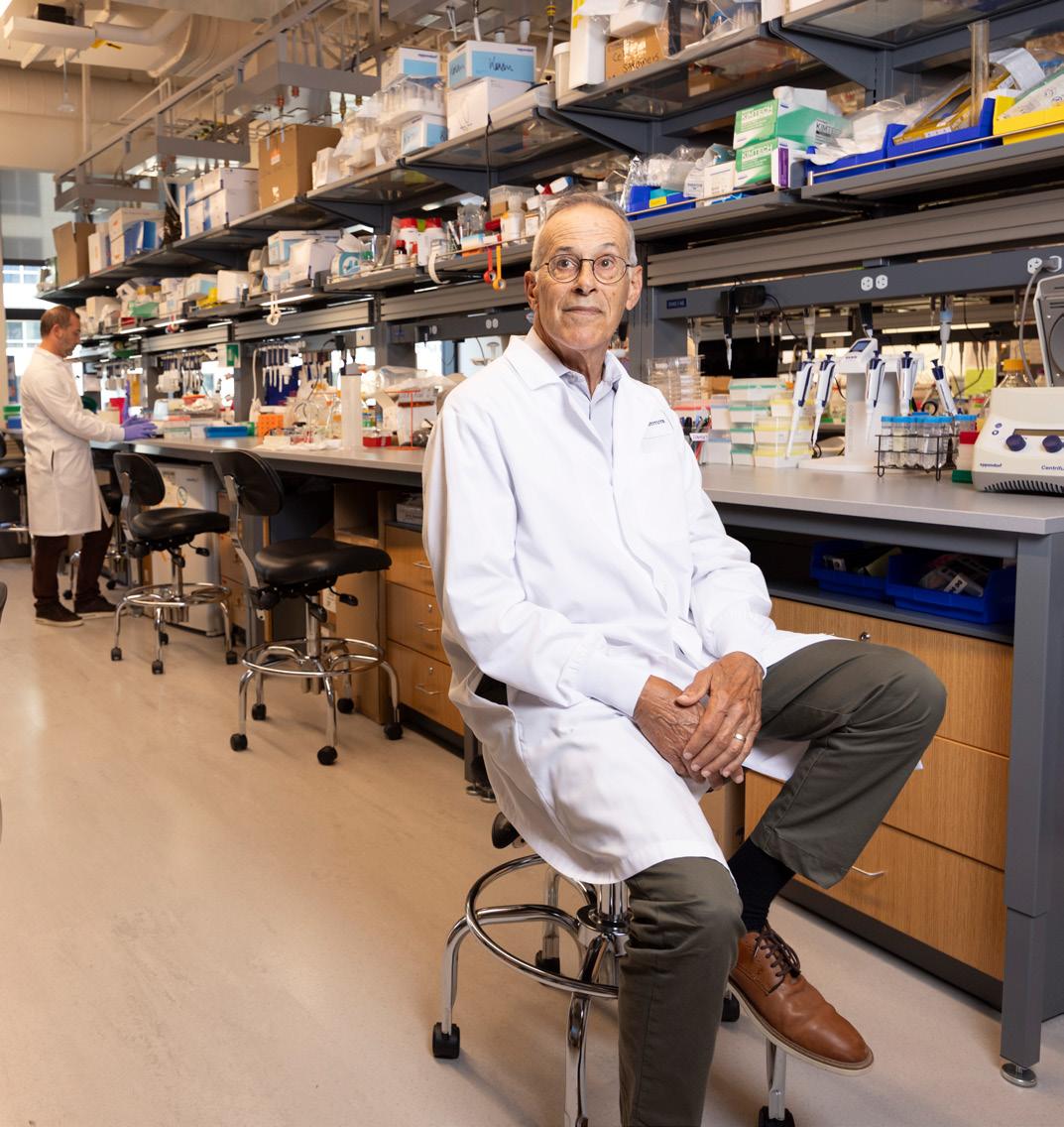
“These cancellations will cost lives that could potentially have been saved in the future if medical research was allowed to continue.”
DAVID WALT CNN, April 16, 2025
In the wake of the funding freeze, Wyss leaders Don Ingber, David Walt, and Angelika Fretzen spoke out forcefully about its cascading consequences – not just for scientific discovery, U.S. competitiveness, national security, or our economy, but for the patients whose hope depends on timely innovation. Their voices underscore a simple truth: Defunding of science will only make us work harder because we’re committed to creating innovation to improve peoples’ lives.

Despite the disruption, the Wyss Institute witnessed an outpouring of support from individuals and foundations who stepped up in this moment of uncertainty. Their generosity is a powerful reminder that the future of science remains bright because people believe in it, invest in it, and refuse to let progress stall. We’re still working, thanks to you.
MEET THE MOMENT
2025 has shown us that we must have unwavering resolve to continue our pursuit of applied research to transform bold scientific breakthroughs into reality.
Join the conversation and explore how you can help shape the future with the Wyss Institute. Because the world can’t wait.
CONTACT: Jonelle Prill-Tate Director of Strategic Engagement jonelle.prill-tate@wyss.harvard.edu
SINCE 2009 STARTUPS ENABLED
We are a collaborative non-profit Institute committed to enabling impact that will improve the lives of people and protect our planet.
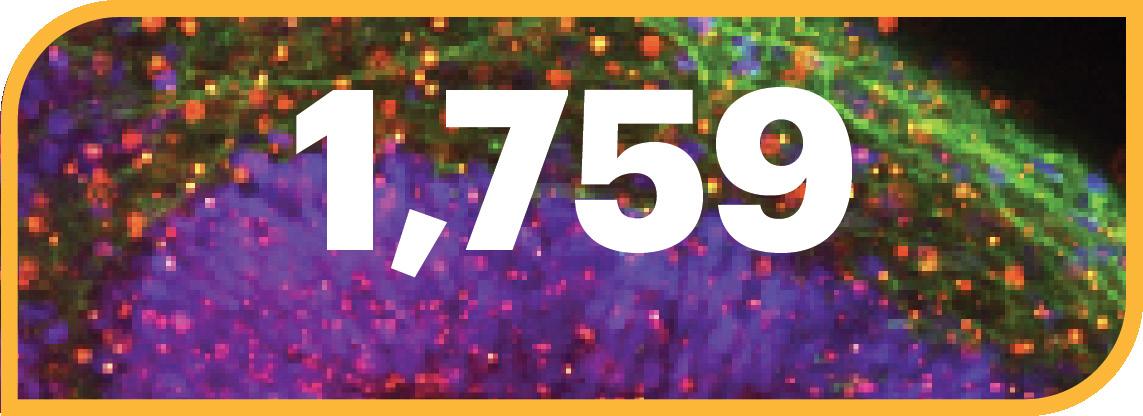
PATENTS ISSUED
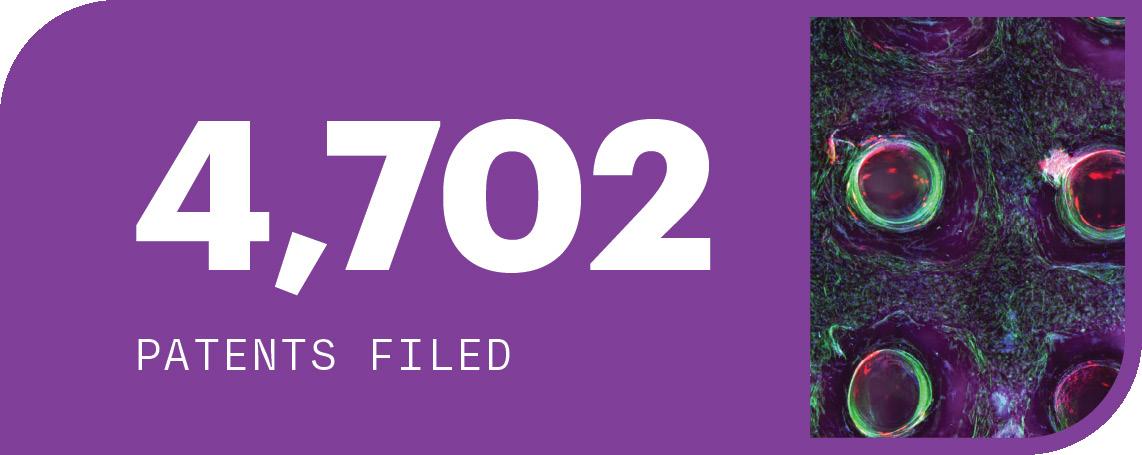
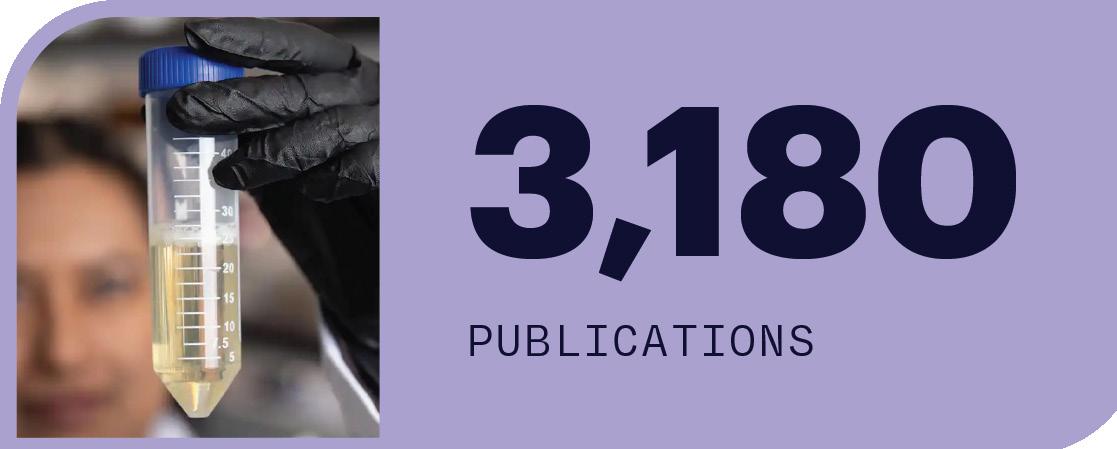
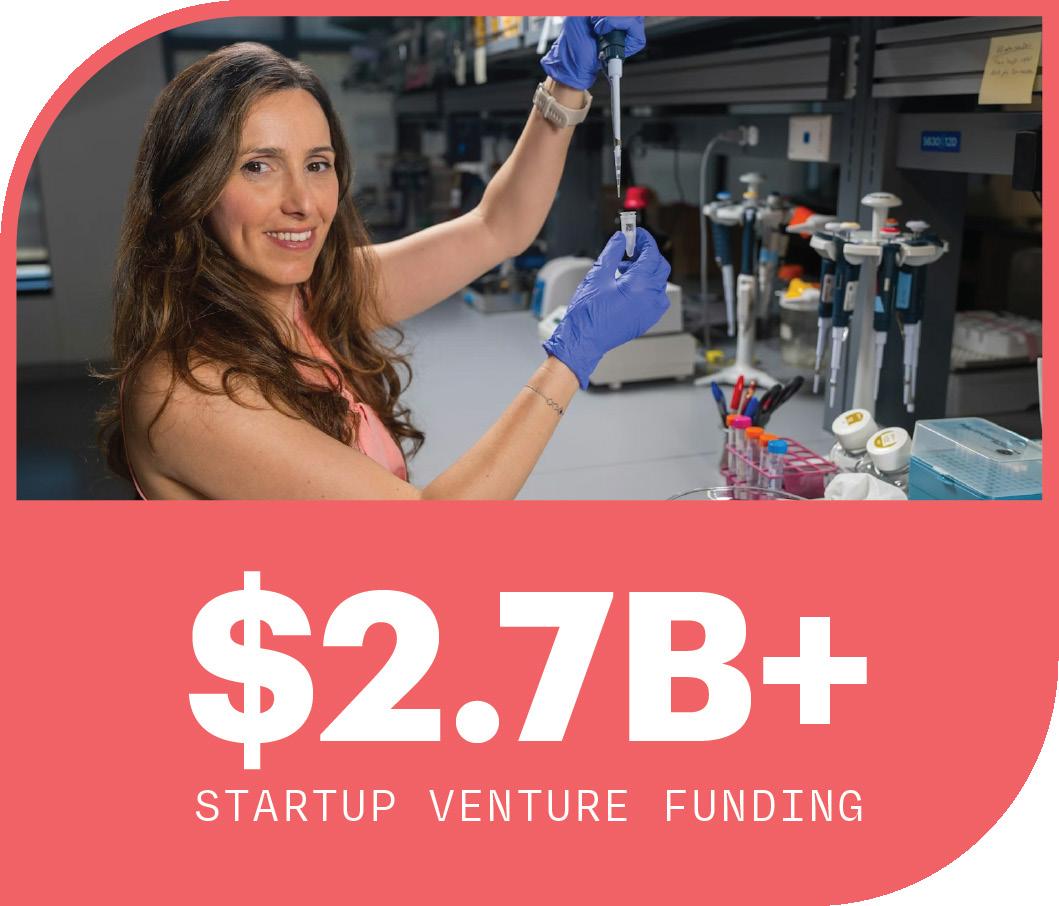
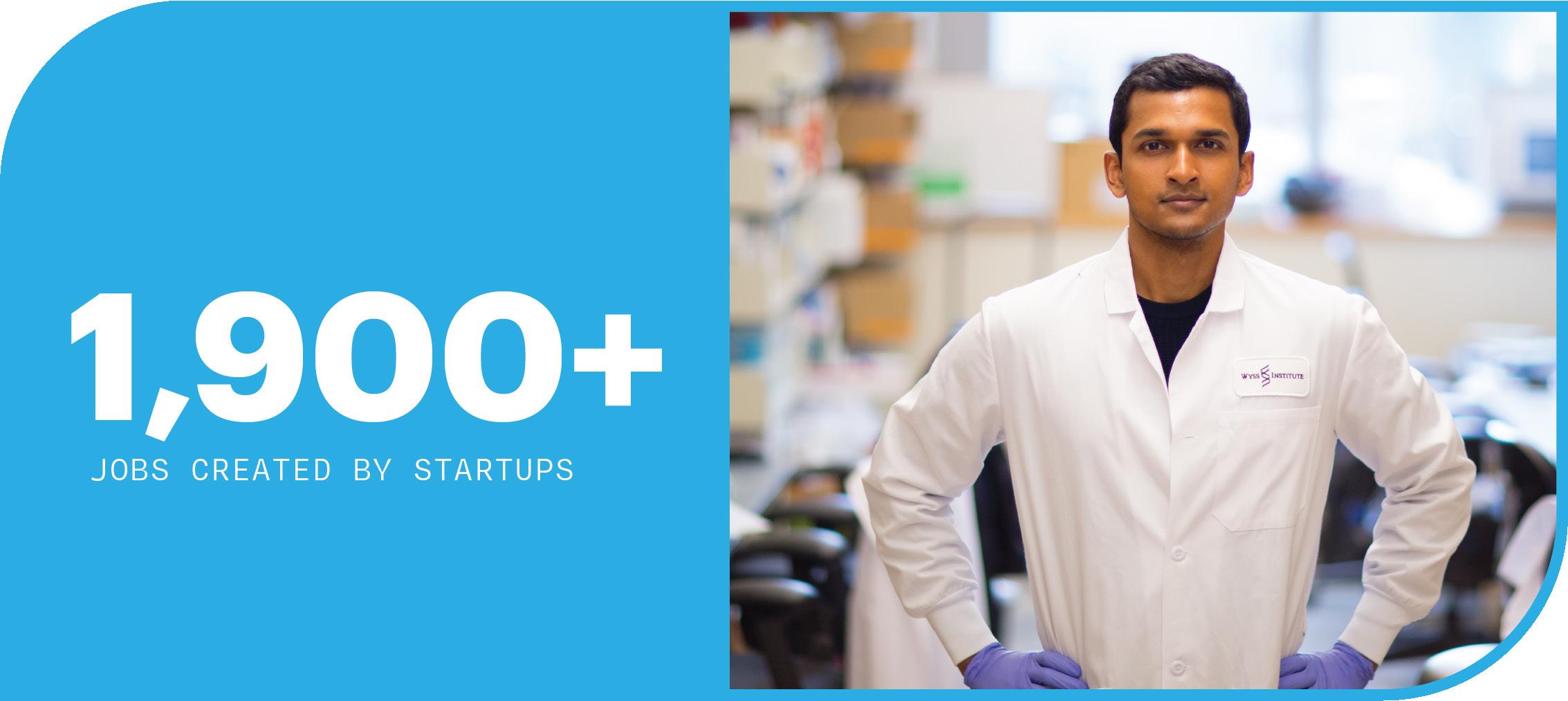



At the Wyss Institute, a singular mission drives us: to confront humanity’s most pressing challenges with bold science, transformative technologies, and collaborations that transcend traditional boundaries. From advancing fundamental discoveries to delivering real-world solutions, our community thrives at the intersection of innovation and impact.
Recognizing the urgent challenges and momentum in women’s health, the Wyss Women’s Health Catalyst organized three different symposia, uniting scientists, clinicians, industry experts, and philanthropists to drive towards better health outcomes. By prioritizing disease areas that are either unique to women, affect women differently, or in disproportional numbers, we are working towards unlocking breakthroughs in therapeutics, diagnostics, and beyond. We can build on powerful capabilities and foster new collaborations to advance women’s health, and we seek new philanthropic partnerships that fuel discovery, empower young scientists, and support the next generation of leaders who want to invent a healthy future for girls and women at all ages.
As this Impact Reports illustrates, one of our greatest strengths at the Wyss is our ability to act as a collaborative hub by linking academia, hospitals, government, regulatory agencies, philanthropic organizations, and industry. With this expansive perspective, we pursue shared goals of addressing the world’s most pressing challenges and hold ourselves accountable for creating transformative solutions. By combining diverse viewpoints with a community of collaborators and a vast toolkit of technological capabilities, we can draw from limitless workflows to meet society’s greatest unmet needs.
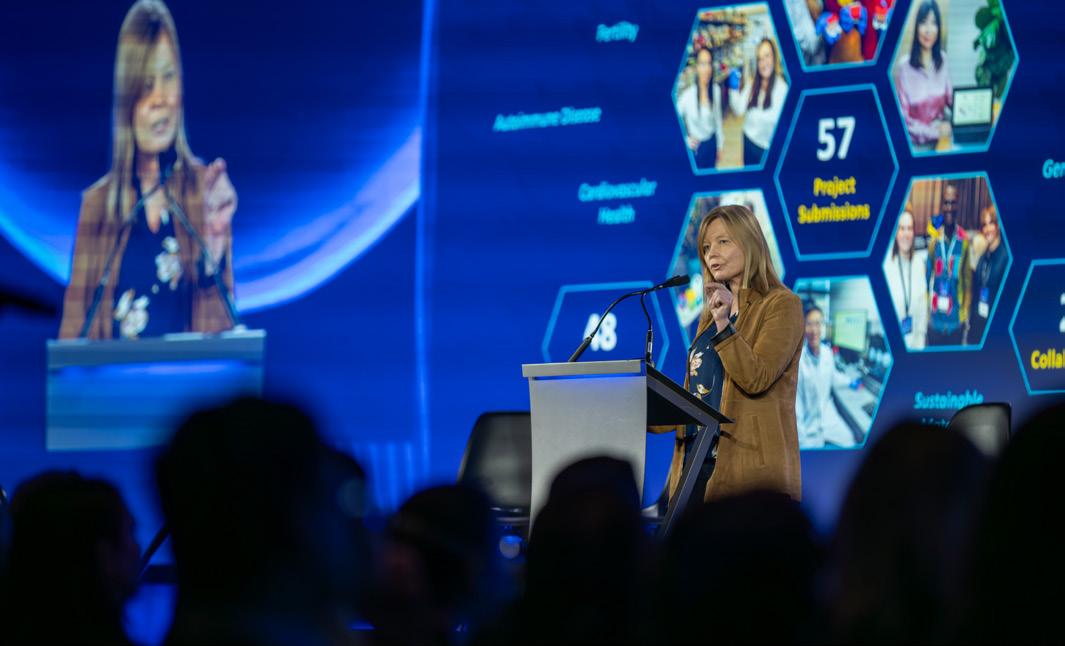
We are committed to growing our partnerships and broadening the range of expertise required to solve problems once thought impossible – all while driven by a profound sense of urgency. I invite you to join us as partners on this electrifying journey. Together, we can achieve shared successes and shape a future we are all proud of: a future full of promise for every person and for our planet.
What Hansjörg Wyss and our ecosystem has enabled is not only groundbreaking science, but also the ingenuity to bring together diverse voices and important insights. I am profoundly grateful to our community – faculty, staff, students, postdoctoral and clinical fellows, industry, and philanthropic partners such as Collaborative Fund and Northpond Ventures, and our wider network of collaborators across Boston-Cambridge and around the globe. Each one of you inspires, challenges, and pushes us toward real and lasting change.
With your partnership, the promise of a healthier and more hopeful tomorrow is within our reach.
Sincerely,

Angelika Fretzen, Ph.D., M.B.A. Chief Operating Officer & Technology Translation Director, Wyss Institute at Harvard University

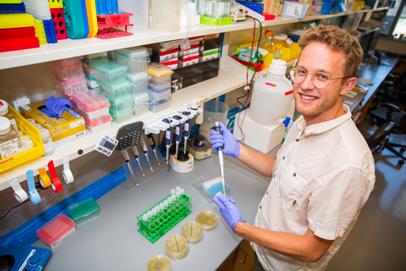


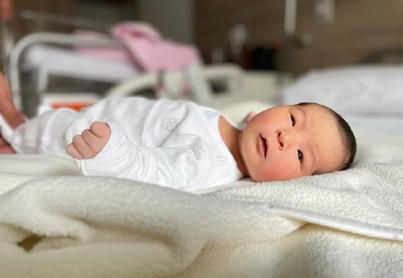
2022
First License Executed through Harvard OTD.
Gameto-Wyss Collaborative Research
Gameto founders worked with Church team to create lab-grown ovarian organoids capable of supporting human egg cell maturation.
Gameto Launched George Church’s team realized that for an egg to develop in vitro, it’s crucial to provide it with its native supporting environment.
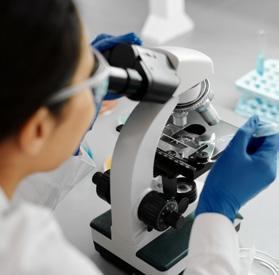

First Live Birth
Gameto achieved the first live birth using Fertilo, which matures eggs outside the body.
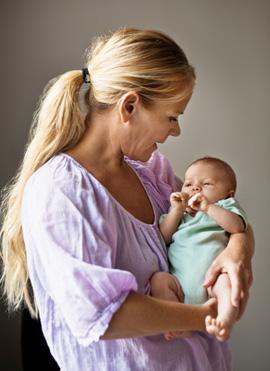
Fertilo Cleared for Use in Six Countries Gameto received FDA clearance to enter Phase 3 clinical trials. 2025
Project Initiation
Harvard and MIT researchers collaborated to generate human eggs from skin cells in vitro.

Women experience disease, manifest symptoms, and respond to drugs differently than men, yet research into women’s health remains deprioritized, underfunded, and sidelined. With top talent, deep commitment, and urgency, we aim to regain lost ground and keep women’s health at the forefront of science and medicine.
The Women’s Health Catalyst at the Wyss Institute was founded to support the research and innovation needed to address critical gaps in therapeutics, diagnostics, and medical devices for women’s healthcare. Women’s health affects every part of the body and every stage of life, so it needs a comprehensive, collaborative approach to make real progress. The Women’s Health Catalyst brings together philanthropy, venture capital, and industry partners to spark breakthrough innovations and move them quickly into clinics and to market.
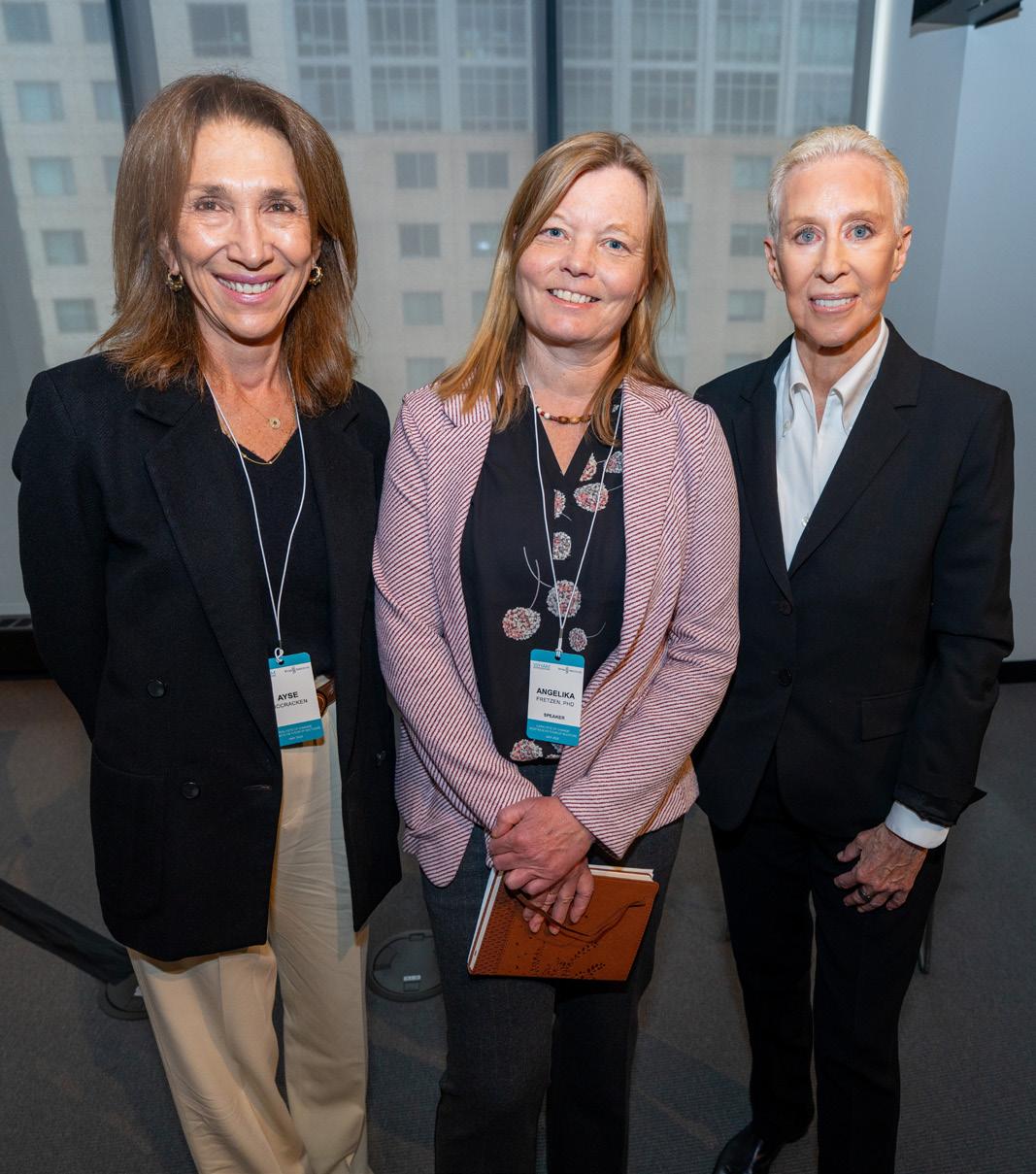

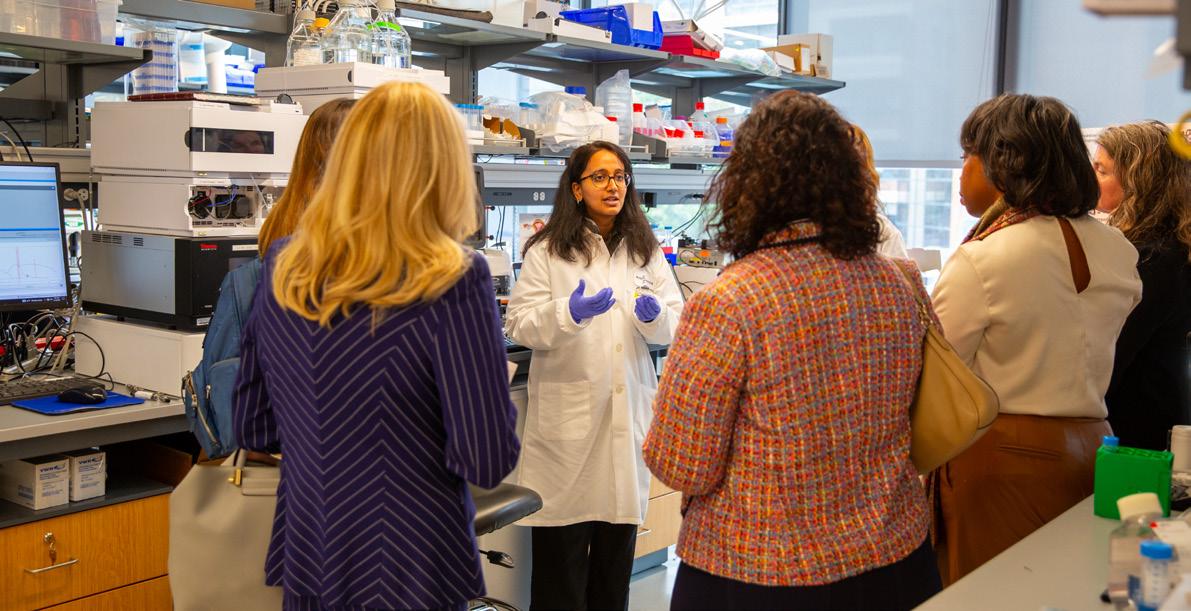
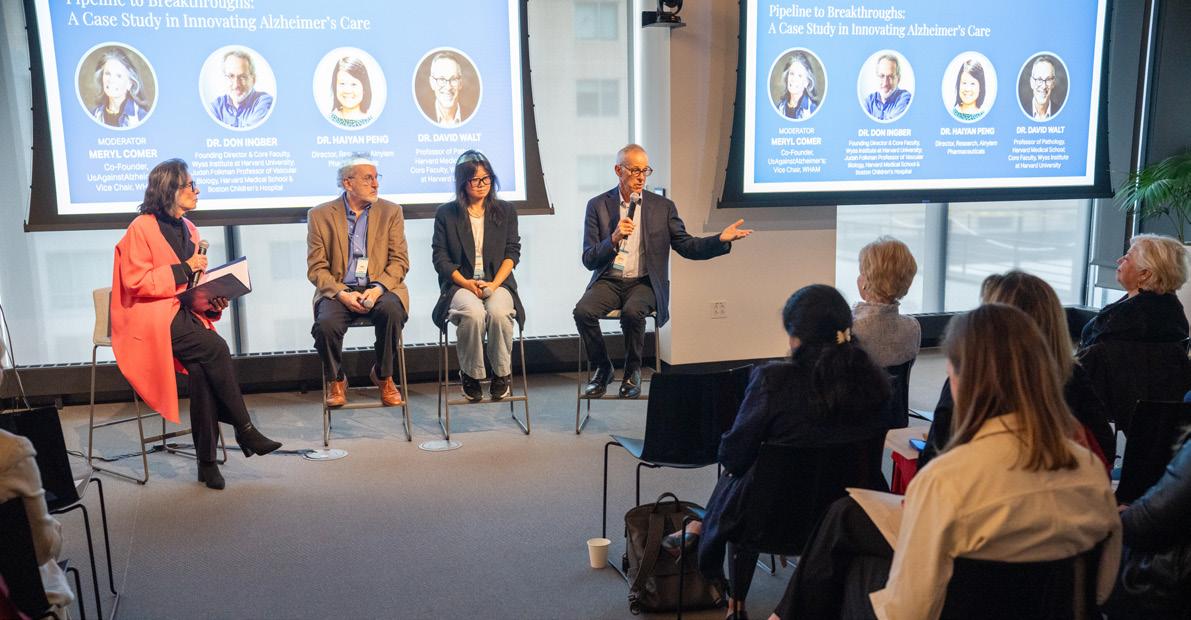

Limited research on female reproductive organs has left many women without answers for debilitating conditions. The balance between a woman’s microbiome and reproductive tract environment is vital for vaginal health, with disruptions linked to HIV, bacterial vaginosis, miscarriage, and preterm birth. Current research tools fall short of replicating these dependencies. The Wyss’ Organ Chip team, led by Founding Director Don Ingber, devised living tissue models for different parts of the female reproductive tract, such as a Cervix Chip and Vagina Chip, which, used singly or in combination, accurately mimic the physiological and molecular changes women experience with infections and hormone cycles, and are used by the team to evaluate new treatments.
Gynecological cancers are among the most lethal cancers, yet they receive a smaller share of research funding. Our teams are developing injectable immune organs to treat ovarian cancer and creating platforms to improve women’s lymphatic function. We want to make cancers affecting women as treatable as prostate cancer is for men.
Women’s cardiac and vascular systems are different from men’s, and women suffer disproportionately from many heart conditions. We are working to develop personalized medical implants tailored to a woman’s unique anatomy that can be implanted through noninvasive procedures to improve cardiovascular health outcomes.
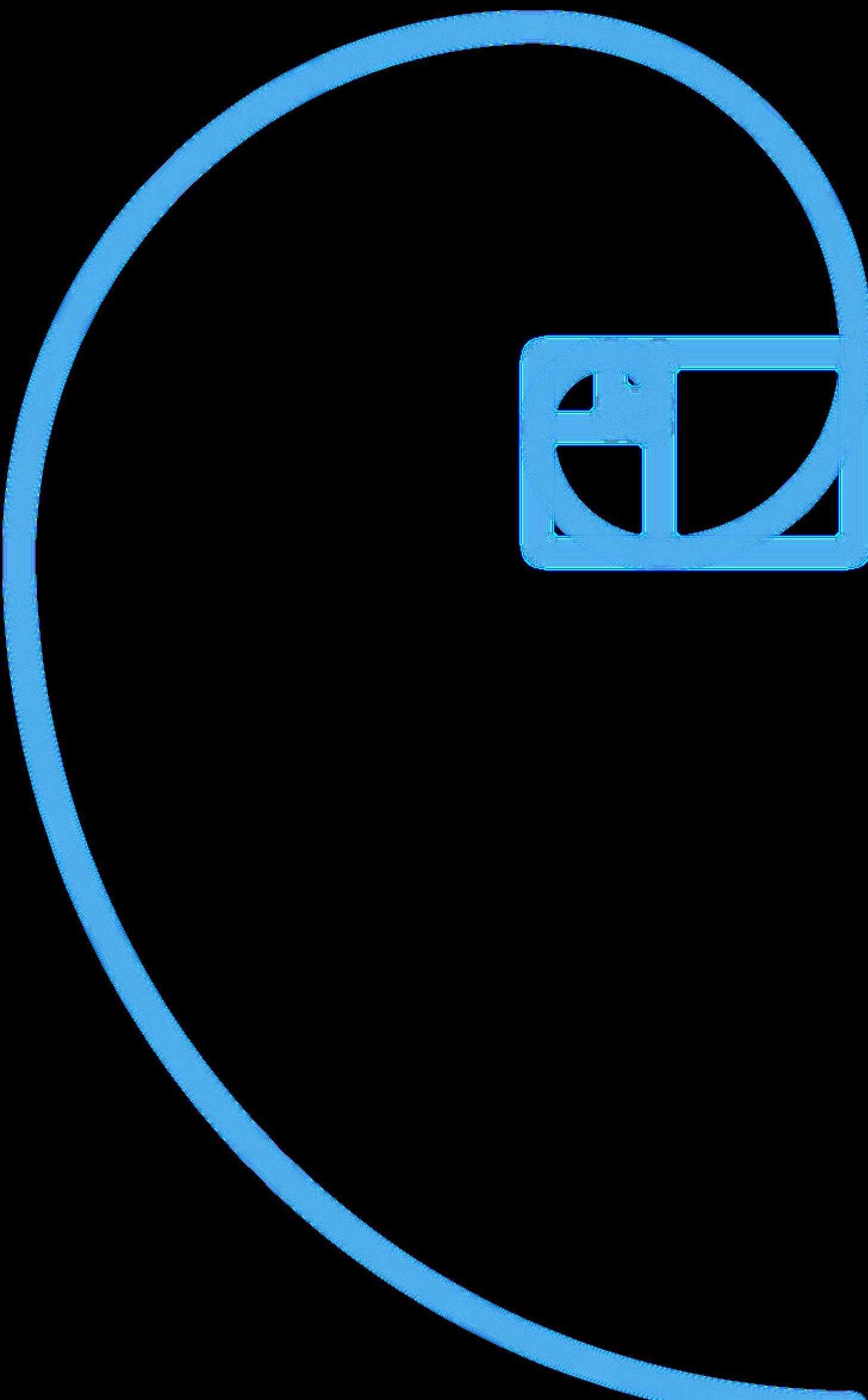
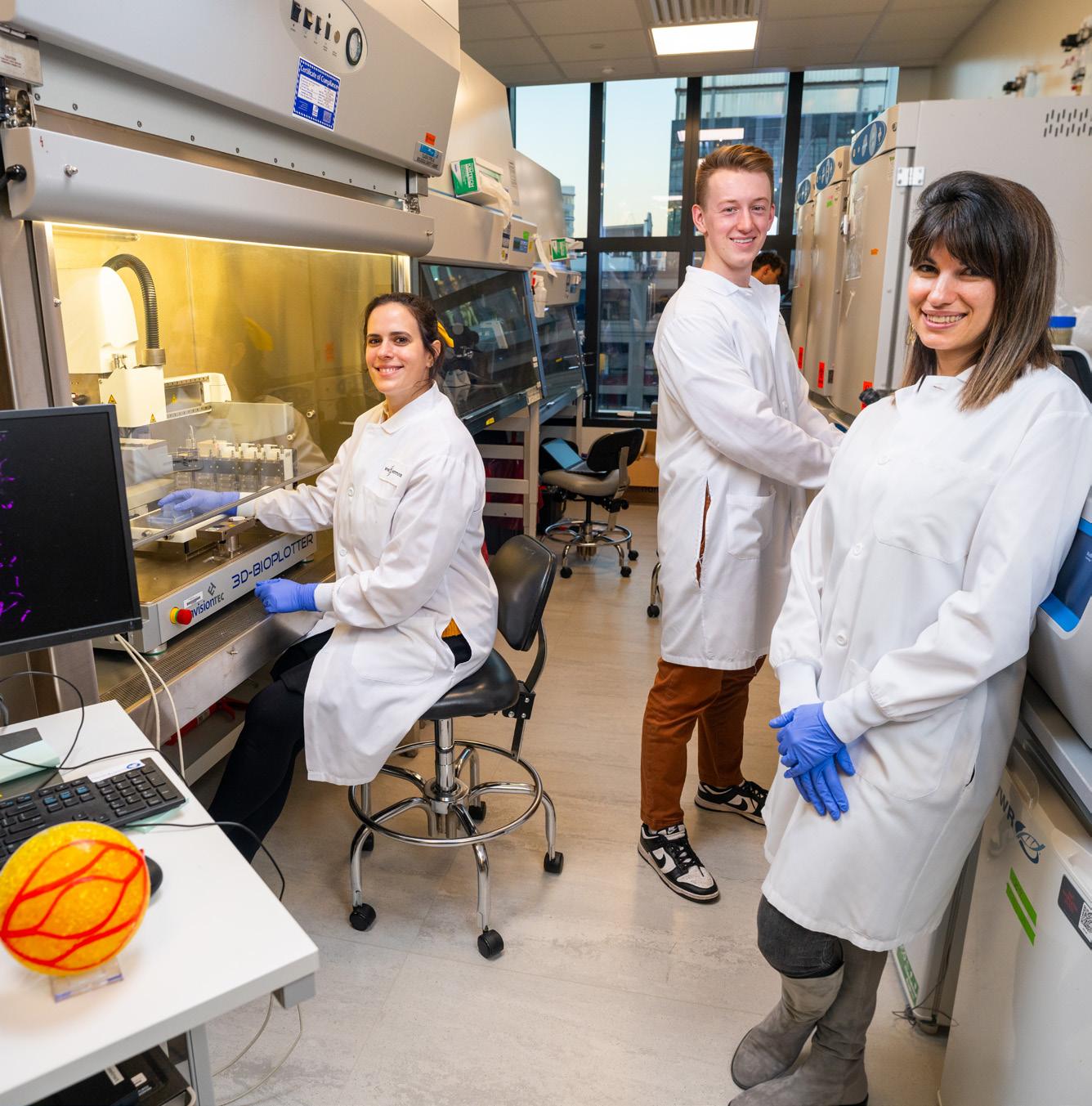
Women are disproportionately affected by Alzheimer’s, migraines, anxiety, and depression, along with other diseases that attack brain function. We are accelerating new, more effective approaches for targeted drug delivery to help increase the uptake of drugs into the brain.
Treating breast cancer that has metastasized to the brain is an extreme challenge because most drugs are not able to cross the bloodbrain barrier (BBB). About one in three patients with HER2+ or triple-negative breast cancer will develop brain metastases. There is currently no effective, systemic treatment to prevent this progression. We are developing a therapy using Wyss “brain shuttles” to enhance the delivery of FDA-approved HER2+ breast cancer drugs across the BBB by more than tenfold, promising rapid clinical advances in treating brain metastases.
Ovarian cancer is the deadliest cancer of the female reproductive system, with over 12,700 U.S. deaths expected in 2025 due to limited treatment options; it is often diagnosed late because early tumors are hard to detect, and symptoms mimic less serious conditions. By the time of diagnosis, 80% of patients have metastatic disease, and half will not survive five years. To address this urgent need, ARPA-H has awarded the Wyss funding through its Sprint for Women’s Health to develop “iNodes” – implantable lymphoid organs made from patients’ own immune cells – as a new form of personalized immunotherapy, led by Principal Scientist Girija Goyal. By mimicking naturally occurring immune structures found in longterm survivors, iNodes train the immune system to attack tumors and prevent recurrence.
Eighty percent of autoimmune disease patients are women, yet women’s unique immune systems remain dramatically under-researched. The Autograph team, supported as a Wyss Validation Project, is developing a point-of-need diagnostic and monitoring platform to enable earlier interventions for systemic lupus erythematosus (SLE), a chronic and often debilitating disease that disproportionately affects women.

Led by Wyss Founding Director Don Ingber and Postdoctoral Fellow Joshua Rainbow, the team is advancing a biomarker-specific device for both athome and in-clinic use that could make more timely treatment possible.
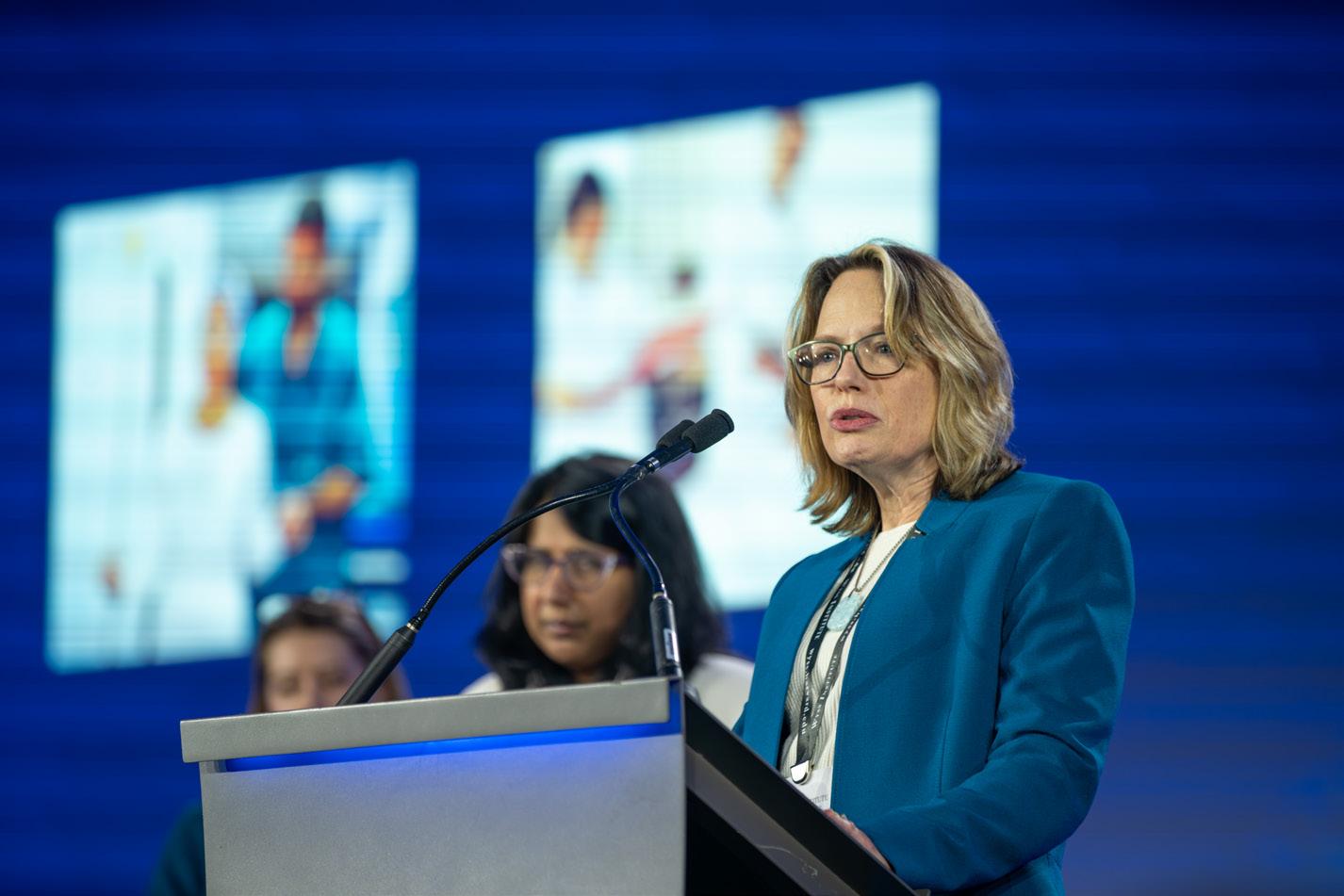

The Wyss was awarded funding from Wellcome Leap’s The Missed Vital Sign program, which seeks to transform how menstruation is understood and treated. The team will use its pioneering Organ Chip technology to create the first human model of heavy menstrual bleeding (HMB), a condition that affects one in three women of reproductive age yet remains underdiagnosed, undertreated, and poorly understood. The new Organ Chip model will allow researchers to uncover the causal factors and early biomarkers of HMB progression and identify potential non-hormonal therapeutics by combining multi-omics analysis with artificial intelligence (AI)-driven computational approaches. This aims to shorten the time women wait for effective treatment from an average of five years to just five months.
COLLABORATION
Endometriosis remains a profoundly underdiagnosed and undertreated condition, especially among girls and adolescents, who often endure years of pain, stigma, and developmental problems before receiving a diagnosis or effective care. Our multidisciplinary team, led by Wyss Scientists Sandy Elmehrath and Adama Sesay, are developing solutions designed to catalyze real change for young girls, adolescents, and adult women. The technologies at the heart of our program – biomarker discovery, advanced 3D disease modeling, sensitive diagnostics and biosensors, and targeted therapeutics – are

Sandy Elmehrath is too familiar with the consequences of the gender health gap. Her great-aunt endured many years of pain only to be diagnosed with cancer after it was too late. Knowing that stories like this are too common, Sandy decided to channel her curiosity and background in chemistry and material science to design and customize drug delivery platforms to address diagnostic and therapeutic challenges in women’s health, starting with endometriosis.
Learn more about Sandy and her work in this Humans of the Wyss on our website RESEARCHER PERSPECTIVE
developed with the explicit goal of reducing suffering, promoting autonomy, and ensuring that no girl is left behind due to lack of access, awareness, or tailored care.
Want to support the Endometriosis Solutions Program? Get in touch with Gretchen Fougere, Senior Director of Business Development, to learn more.
CONTACT: gretchen.fougere@wyss.harvard.edu
The Women’s Health Catalyst hosted an event spotlighting leading voices in endometriosis research and care. Marc R. Laufer (Boston Children’s Hospital, Boston Center for Endometriosis), Emily Parent (Beth Israel Deaconess Medical Center), and Michael S. Rogers (Boston Children’s Hospital Vascular Biology Program) shared insights on treatment advances, patient-centered care, and cuttingedge research. A panel discussion moderated by Wyss Scientist Sandy Elmehrath explored the challenges patients face and the muchneeded innovations to help transform care for this overlooked patient population.
Wyss
This past year, the Wyss Institute hosted two major gatherings advancing women’s health: the Women’s Health Symposium in September and the Women’s Health Access Matters (WHAM) Spring Forum in May. The September Symposium convened leaders across investment, medicine, research, and advocacy, with opening remarks by Wyss COO and Technology Translation Director Angelika Fretzen and a panel featuring Carolee Lee (WHAM), Jessica Federer (NYSE Women’s Health Investor Summit), and Christina Isacson (Lightstone Ventures), who emphasized the lack of a dedicated medical specialty for women’s health, slow progress despite inclusion mandates, and the neglect of major conditions like Alzheimer’s and heart disease. Wyss Faculty stressed that transformative technologies already exist, but must be applied with a gender-specific lens, while Fretzen closed with a rallying call: “Even helping one woman avoid one day of pain is worth it.”
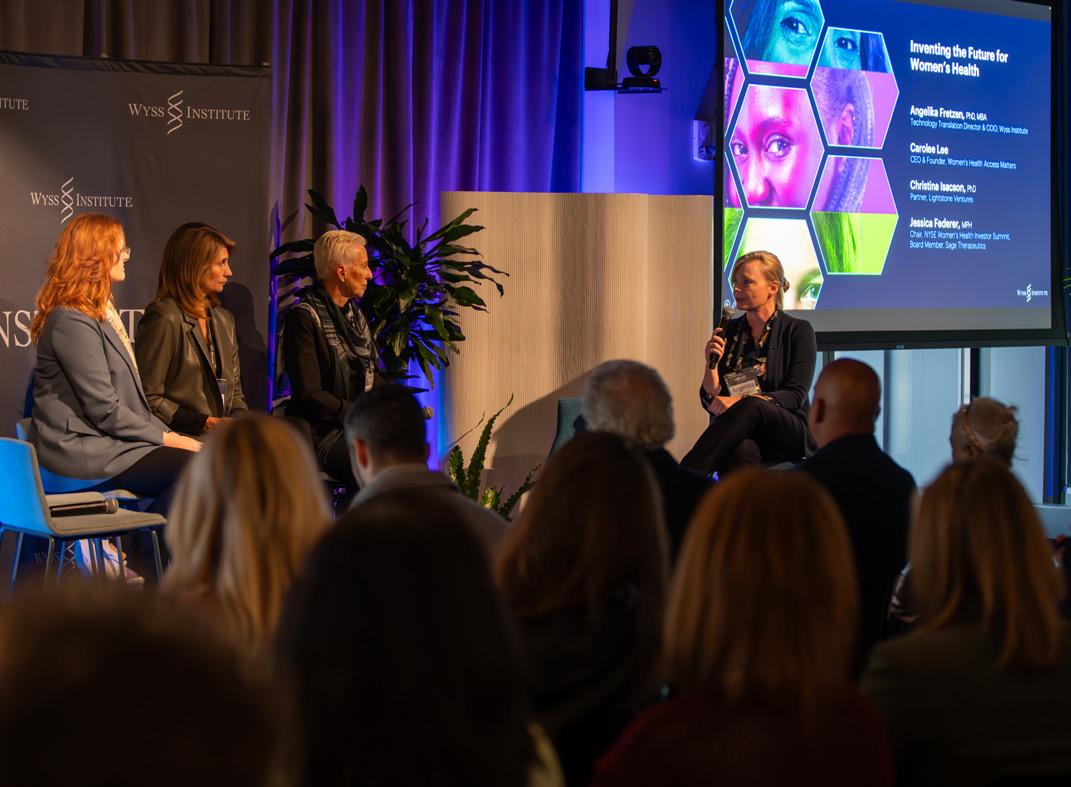
The WHAM Spring Forum brought together researchers, industry leaders, investors, and advocates to push equity in brain, heart, and reproductive health through lab tours, networking, and sessions on breakthrough diagnostics and AI-driven drug discovery, with panels underscoring the urgent need for sexbased research and highlighting innovations such as blood-based biomarkers, Organ Chips, and AI tools tailored to women’s biology. Together, these events served as powerful calls to overcome historic bias, funding shortages, and regulatory barriers – channeling urgency, innovation, and hope into meaningful change.

Start a conversation today to help us regain lost ground in women’s health.
CONTACT: Jonelle Prill-Tate Director of Strategic Engagement jonelle.prill-tate@wyss.harvard.edu
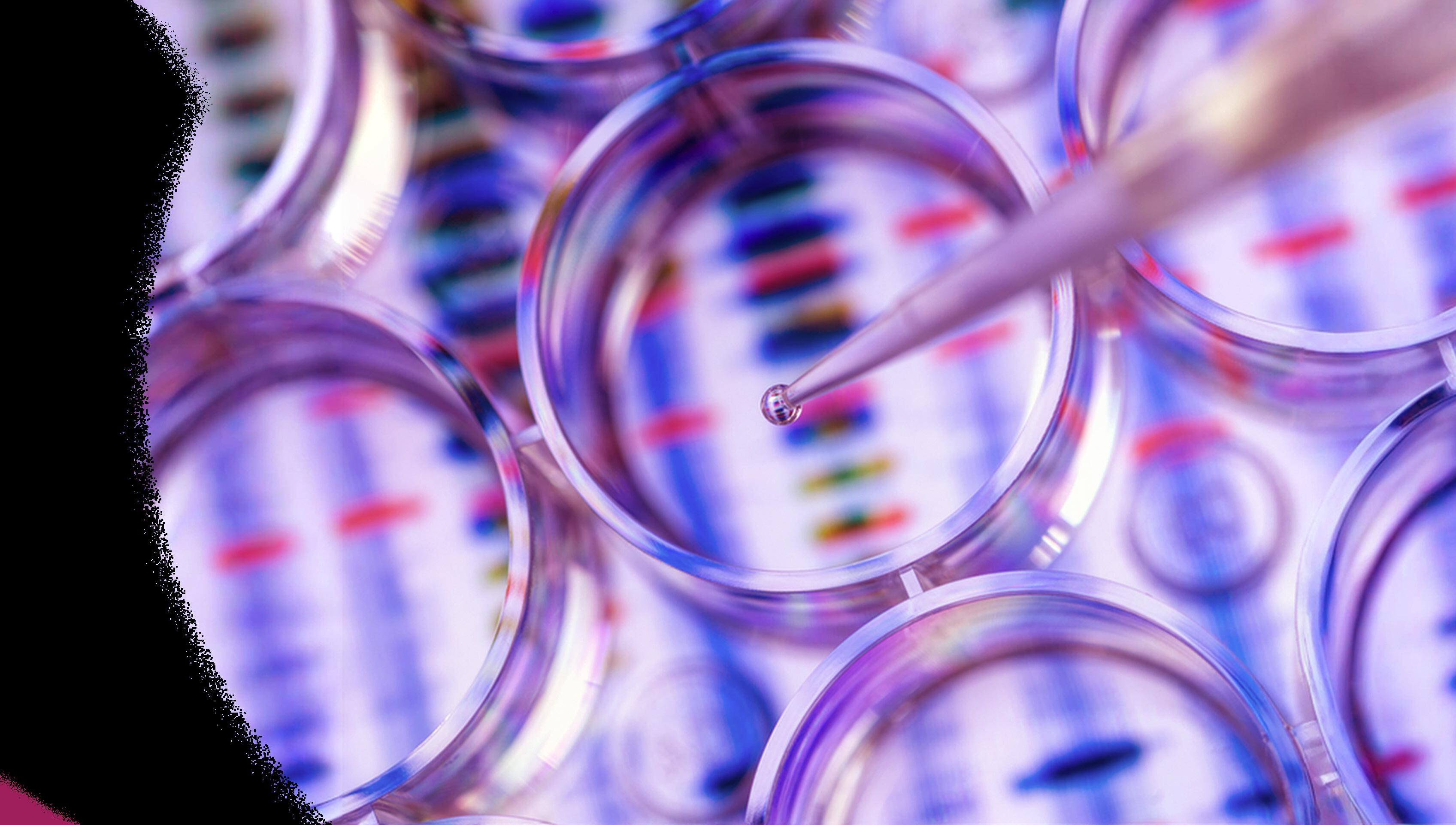
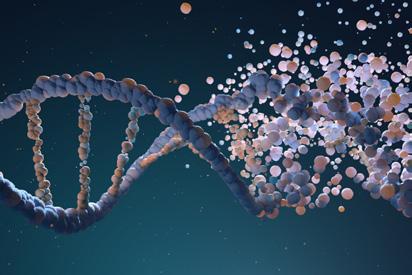
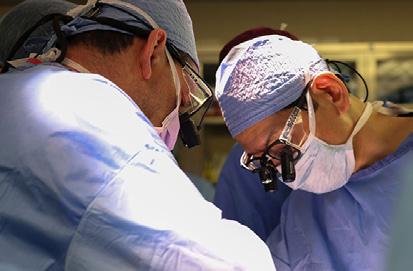
First FDA-Approved CRISPR Therapy

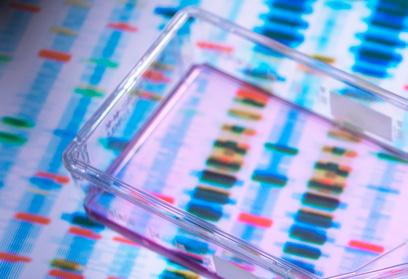
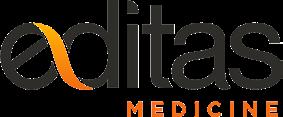
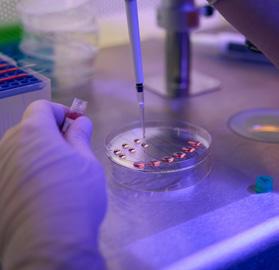


Editas enabled Vertex’s Casgevy to treat sickle cell disease.
Verve Tx Launched to develop treatments for human heart disease.
2015
eGenesis Founded
Wyss team made 62 simultaneous edits to the pig genome to eliminate unwanted immune reactions.
Editas Launched to develop CRISPRbased therapies.
2013
Wyss Platform Project
George Church’s team demonstrated CRISPR-Cas9 could be used for precise, targeted gene editing in mammalian cells.
First Human Transplant
Doctors at MGH performed the first eGenesis pig kidney transplant as an FDA compassionate use case.
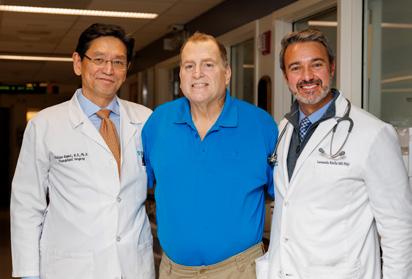
2025
FDA Approval for Clinical Trial
Surgeons performed two eGenesis-edited kidney transplants at MGH as part of an initial three-patient clinical trial. FDA later expanded clinical trial to more than 30 patients nationwide.

The Wyss is harnessing its innovative technologies and passionate research community to help people live healthier lives, age with dignity and vitality, and ease the burden of an aging society on our healthcare system – driving solutions that the world urgently needs today.
We focus on Healthy Aging as one of the fundamental Grand Challenges requiring new approaches for tackling chronic diseases, including new ways to confront the ubiquitous organ transplant crisis, rare genetic and immune disorders, various injuries, as well as the natural aging process of our bodies.
Treatments for many debilitating skin and hair disorders are limited to symptom management. The GeneSkin team, led by Postdoctoral Fellow Li Li and Core Faculty member George Church, has built a state-of-the-art multi-omics platform to gain better insight into their complex development and thereby discover novel therapeutic target genes. They are currently advancing an mRNA therapy identified using the platform with the aim of reducing scars and treating hair loss.


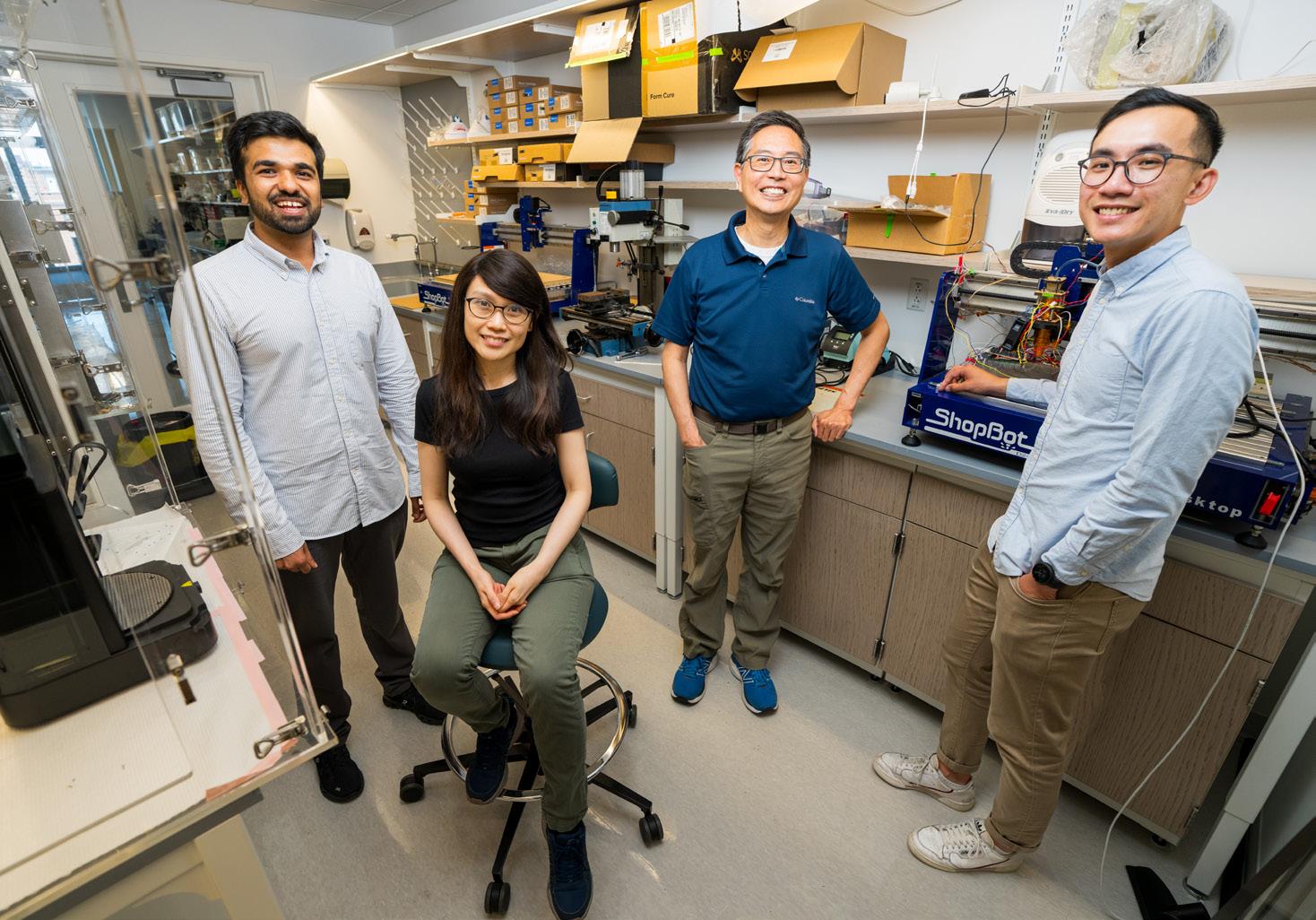
The breakdown of blood vessels drives the progression of cardiovascular disease and acute respiratory distress syndrome, and no therapies exist to restore their functions, leading to millions of deaths annually in the U.S. alone. To restore the integrity of blood vessels, the THRIVE team, formed by Boston University Research Scientist Jennifer Bays, Wyss Core Faculty member Christopher Chen, and Wyss Associate Institute Director and Core Faculty member Natalie Artzi, is targeting a key vascular cell adherence mechanism through RNA-encoded nanoparticles, allowing the expression of a newly identified therapeutic molecule.

driving force in this area with many unmet needs. The day-long series of discussions, organized by Rushdy Ahmad, Director of the Wyss Diagnostics Accelerator, helped crystallize three priorities for the Wyss: neurodevelopmental and mental health disorders in children, early detection of infectious and autoimmune diseases, and women’s and adolescent health, including hormonal and reproductive health.
“The symposium significantly raised the Wyss’ visibility in pediatric health and ignited the potential for new collaborations spanning diagnostics, digital health, pediatric drug development, and building of longitudinal cohorts. Several collaborative projects are now being discussed with Wyss-affiliated labs and external partners.”
RUSHDY AHMAD

Wyss COO and Technology Translation Director Angelika Fretzen moderated a panel at the Bio International Convention on advancing xenotransplantation with genetic engineering. Experts from industry, including Mike Curtis, CEO of eGenesis, and Leonardo Riella, a transplant surgeon at Massachusetts General Hospital, discussed the scientific breakthroughs that enabled the recent landmark success of a gene-edited pig kidney transplant, the first in a three-patient study. They also examined the clinical implications, regulatory challenges, and the path toward making genetically engineered organs a viable option for patients.
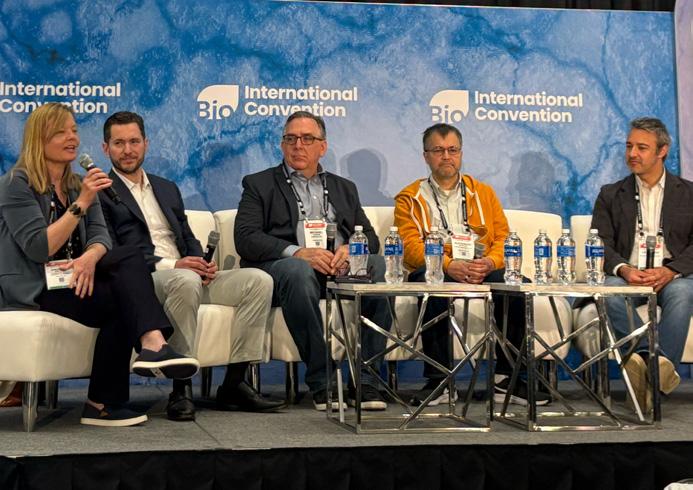
Asthma affects more than 260 million people worldwide, and in the US alone, on average, 10 people die from asthma attacks each day. Many of these deaths would be prevented if patients could be diagnosed in a timely manner to receive a therapy tailored to their type of the disease.
With support from Sanofi, a team formed through the Wyss Diagnostics Accelerator (Wyss DxA, an initiative that rapidly advances new diagnostic technologies to meet unmet clinical needs), and led by Rushdy Ahmad and Brigham and Women’s Hospital clinical immunologist Tanya Laidlaw, launched a biomarker discovery effort to enable the diagnosis of asthma due to causes that defy known categories. By embarking on a large cohort study, the project aims to pave the way for a diagnostic test that can create a safety net for many patients and, potentially, new therapeutic targets.
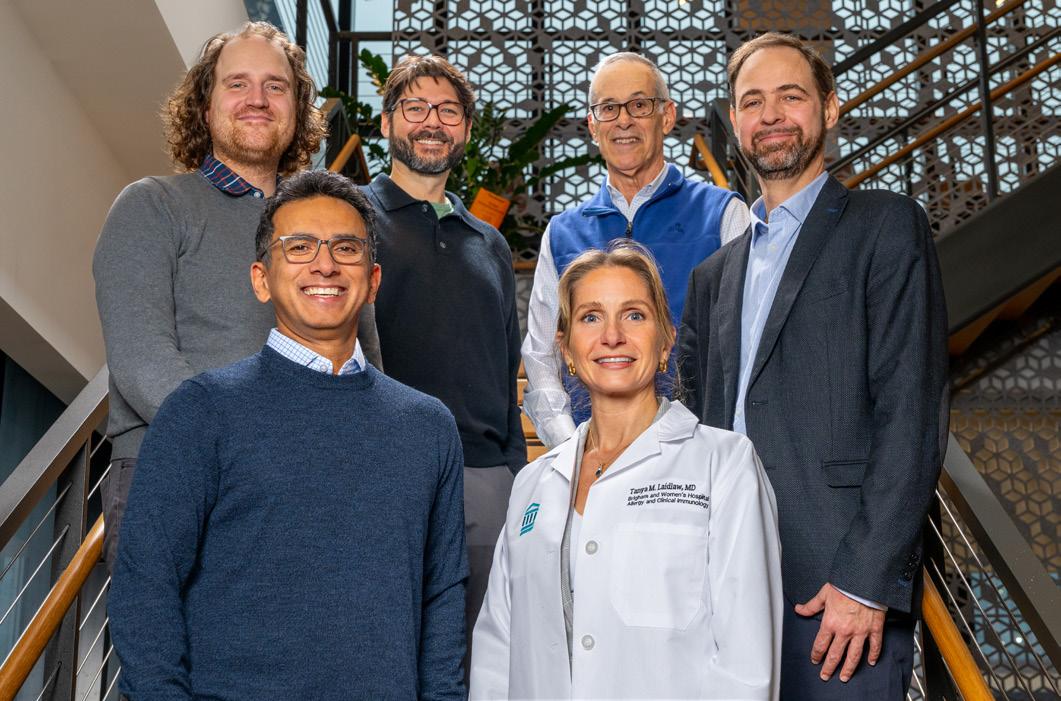
“I am thrilled about the opportunities that have opened up thanks to the Wyss DxA’s exceptional capabilities and organization, and to the grant support from Sanofi, which will allow us to take our studies to the next level.”
To build a strong foundation for its Healthy Aging initiative, the Wyss has received support from The Colossal Foundation, which contributed $1.5M of philanthropic investment, to help launch the Healthy Aging Fund. The Fund will drive groundbreaking research by supporting scientists and engineers across the Institute’s larger ecosystem who develop breakthrough therapies able to delay, or even reverse, age-related conditions.
“By aligning the Wyss Institute’s mission of developing groundbreaking innovations with our dedication to conservation-focused solutions, we are redefining the possibilities for preserving, reviving, and extending the lifespan of all species. This collaboration represents a bold step toward a sustainable and thriving future for all.”

BEN LAMM CEO, Colossal Biosciences
Be part of our Healthy Aging journey
Be part of our Healthy Aging journey. Help us transform the Healthy Aging Fund into a uniquely powerful platform for developing solutions to some of the most intransigent medical problems across all ages and for generations to come.
CONTACT: Sam Inverso Wyss Initiative Manager sam.inverso@wyss.harvard.edu

Unravel currently has 70+ disease programs, partnering with more than 700 patients
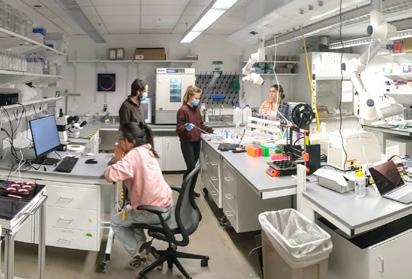

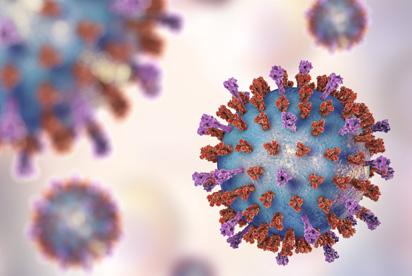




2021
Unravel Biosciences
Launched from Wyss to commercialize BioNAVTM Drug Discovery Platform.
COVID-19 Emergency
DARPA provided support to use Wyss’ AI technology to identify drugs to repurpose to fight SARS-CoV-2, leading to prediction of the efficacy of a subset of statins.
Wyss Validation Project & DARPA Funding
Focusing on Rett syndrome, the team used CRISPR to mimic patient symptoms in tadpoles, while improving the technology for broader use. The team used their platform as part of their DARPA Biostasis award to develop additional therapeutic applications.
Wyss Platform Project
Through the DARPA THoR program, Don Ingber’s team developed AI-based gene network analysis for repurposing drugs, and worked with Mike Levin’s team to develop a whole-organism tadpole platform to measure drug effects.
2023
Clinical Validation
4,000 patient retrospective clinical study confirmed that some, but not all, statins protect against COVID-19.
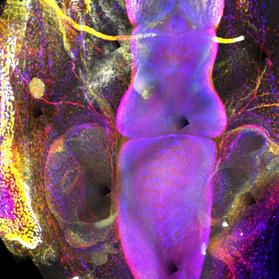
FDA Orphan Drug Designation granted for Unravel’s predicted Rett drug based on pre-clinical data and successful first-patient treated. 2024
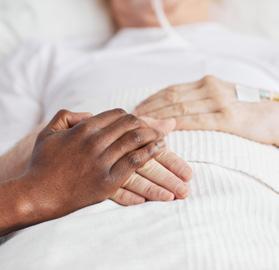
2025
Human Clinical Trials to begin
The team demonstrated that their platform predicted vorinostat would reverse the multi-tissue gene expression dysregulation in Rett syndrome models, leading to their first human clinical trial in late 2025.

We are tackling critical challenges in brain health that academia and the pharmaceutical industry have struggled to overcome for decades. One major focus is to improve the targeted delivery of drugs to the brain and central nervous system – still inefficient today and a major barrier to treating neurodegenerative and psychological disorders, as well as brain cancers. We are also working to enable earlier diagnosis of these devastating diseases, paving the way for more timely and effective treatments. Solutions for these herculean problems require technology development driven through multiple stages and disciplines along with new forms of collaboration.
The fight against the most debilitating and wide-spread brain diseases has faced a major challenge – many potentially effective drugs cannot be efficiently transported across the blood-brain barrier (BBB). The Wyss Brain Targeting Program (BTP) is a new type of pre-competitive collaboration model with multiple industry

partners, which is starting to reap the harvest of its five-year effort. Its newly developed brain transport shuttles, which are as good or better than the industry’s lead shuttles, have recently been licensed to five major companies in the field, with further agreements to follow. With the invaluable support of our sponsors, the BTP is pressing ahead by optimizing shuttle delivery for disease-specific payloads, augmenting its lead shuttles, and validating newly discovered BBB molecules as targets for the design of nextgeneration shuttles, and their use to enable a new class of brain-targeted therapeutics.
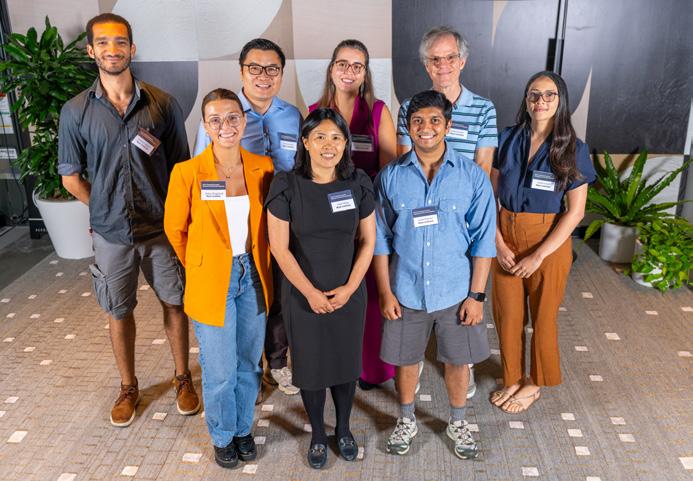
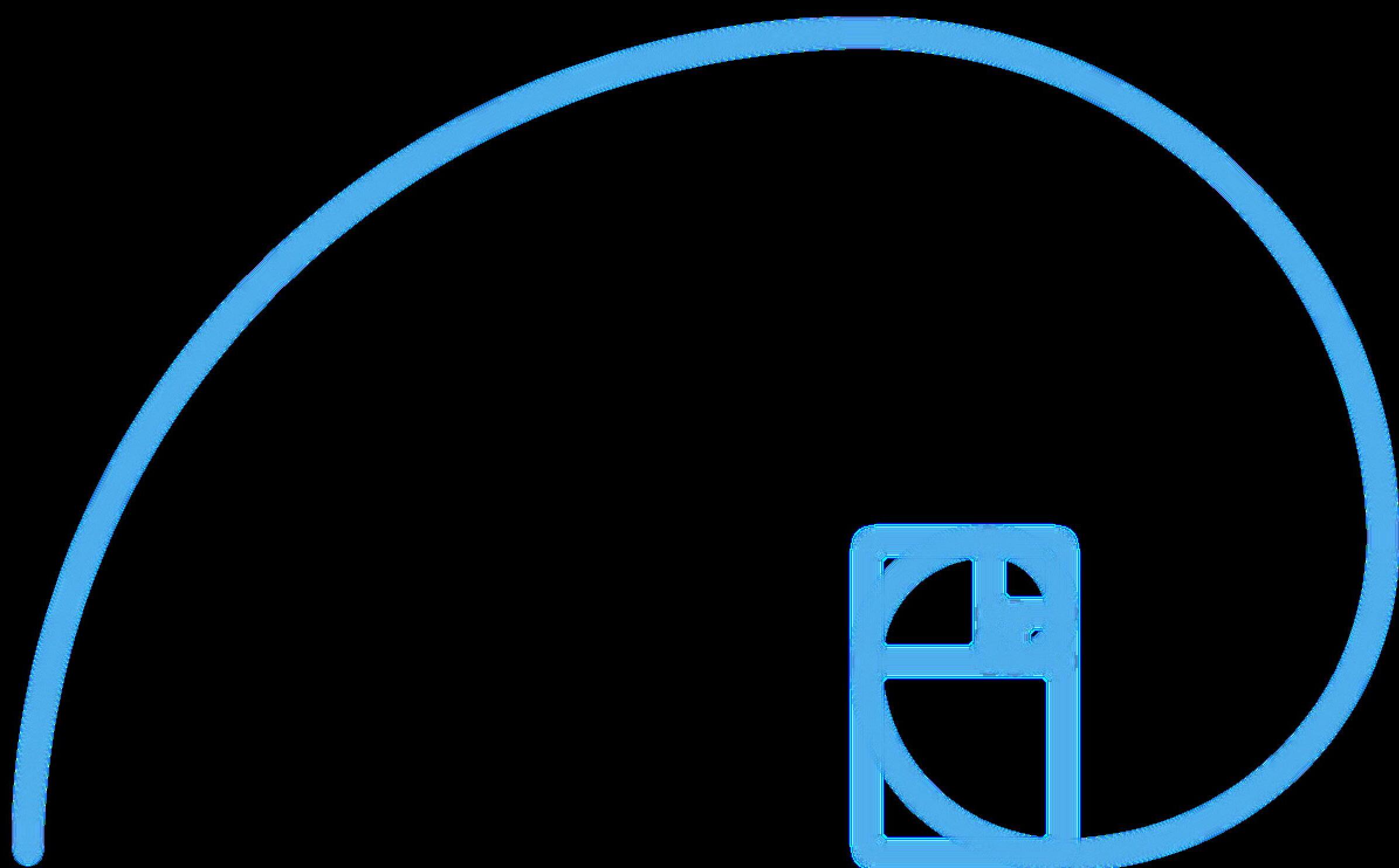

related conferences, some of which were coorganized or co-chaired by Gorman. In a series of talks and posters, the BTP team reported the exciting transport activity of their two present lead shuttles, the synergistic activity of their two lead shuttles when paired, and promising findings from their search for novel brain transport targets.
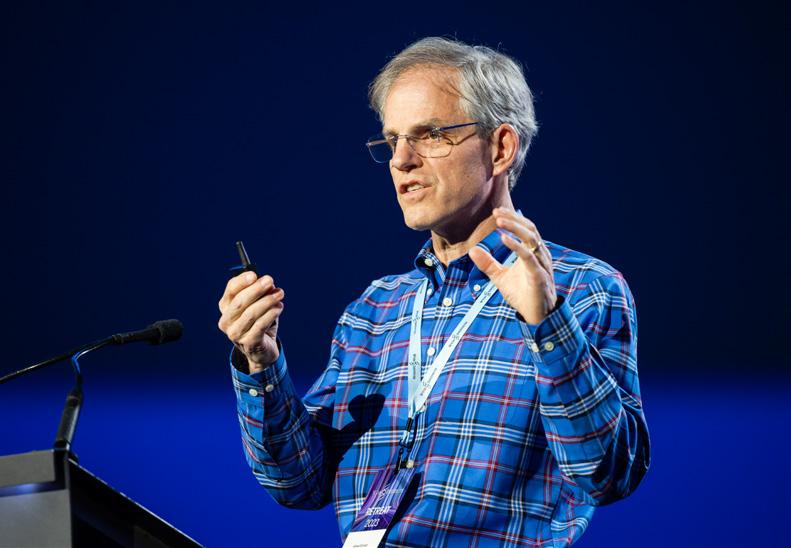
A Wyss-led multidisciplinary, cross-organizational collaboration, supported by a DARPA-ABC (Anesthetics for Battlefield Care) contract, set out to gain a deeper understanding of the neurological mechanisms of anesthesia and to leverage the Wyss AI algorithms to develop a new class of anesthetics. Don Ingber, Senior Scientist Haleh Fotowat, and their collaborators at Harvard’s Department of Molecular and Cellular Biology, MIT, and Tufts University are using their insights to develop safe drugs that enable use of anesthesia without the need for extensive monitoring, which could save thousands of lives on battlefields and in disaster situations.
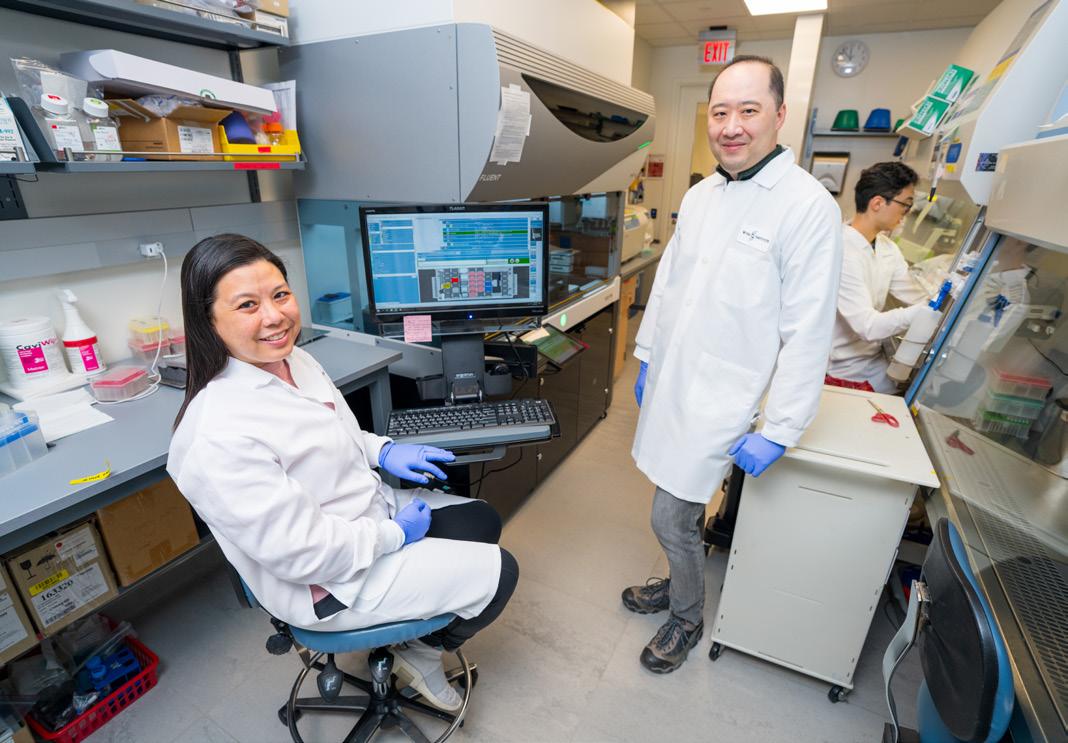
The CircaVent team, led by Director of Synthetic Biology Jenny Tam and Core Faculty member George Church, with neuroscience, nanotechnology, and proteomics expertise from Senior Scientist Katharina Meyer, Scientist Ninning Liu, and Principal Scientist Bogdan Budnik, develops better interventions for bipolar disorder (BD). Currently supported by the philanthropic organization Breakthrough Discoveries for Thriving with Bipolar Disorder (BD2), they create patient-specific organoids that recapitulate critical disease features and help identify common features. The project is leading the way to new drugs with the ability to normalize those features, which they plan to bring to patients in collaboration with clinician Andrew Nierenberg, a leading BD expert at Massachusetts General Hospital and Harvard Medical School.
The team is actively seeking collaboration partners to help develop CircaVent into a robust drug discovery platform for bipolar disorder and other mental health conditions. Get in touch today to discover how you can support their work.
CONTACT: discover@wyss.harvard.edu
The molecular changes leading to many neurodegenerative disorders start to build up much earlier than neurological symptoms appear. Detecting them at the initial stages would enable patients to be treated much more effectively. Core Faculty member David Walt’s team had several breakthroughs on its path to harness extracellular vesicles (EVs), which are released from brain cells and contain diverse biomarkers of disease, in easy-to-obtain “liquid biopsies” signaling these early changes. Senior Scientist Dmitry Ter-Ovanesyan and other members of Walt’s team devised an assay to clearly distinguish molecules actually contained in EVs from molecules non-specifically bound to their surface, solving a ubiquitous problem confounding the entire EV field. In addition, Associate Research Fellow Tal Gilboa and the team developed a single-molecule detection method to enable ultra-sensitive measurements
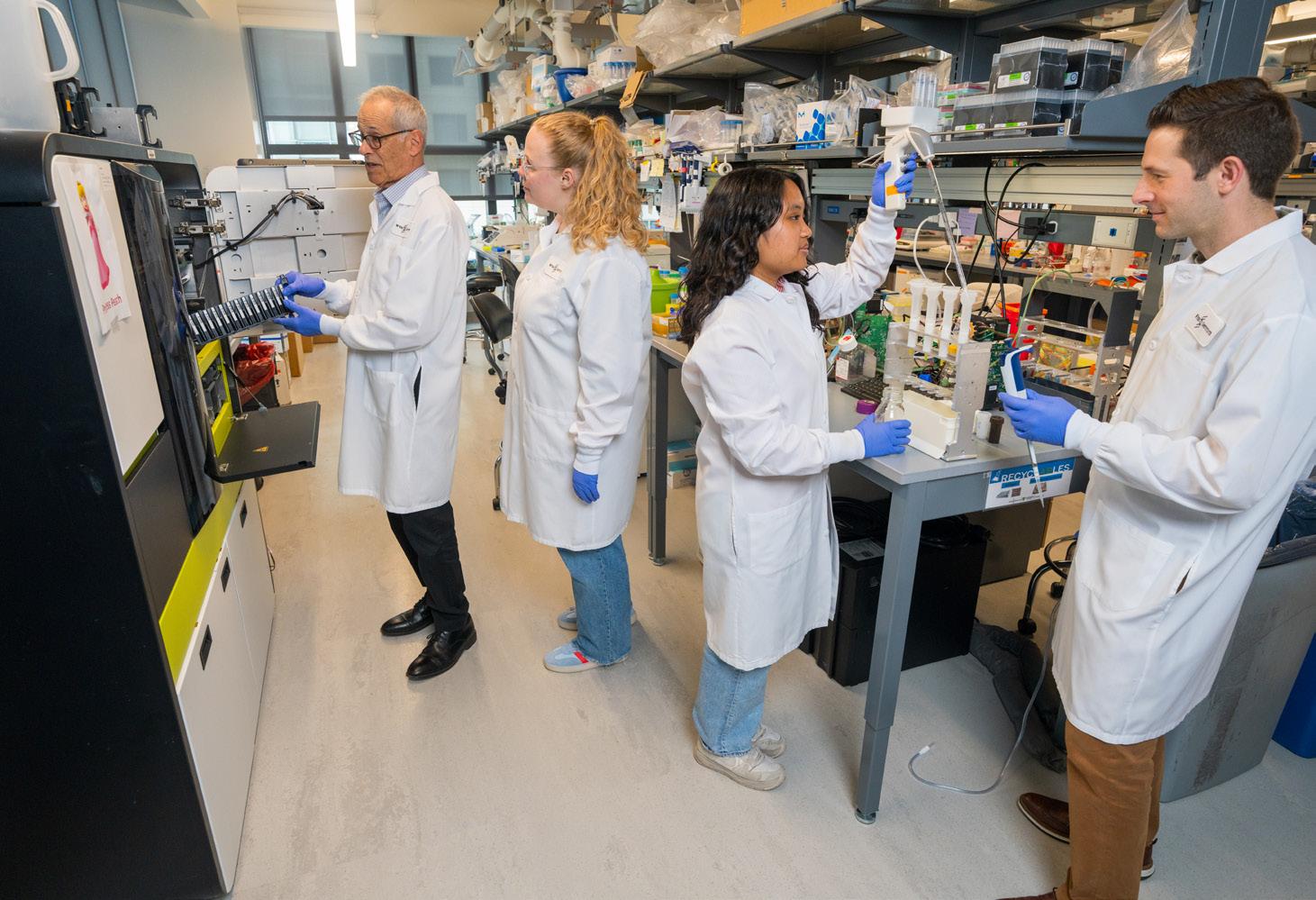
of a pathological form of ɑ-synuclein, a sign of Parkinson’s disease, in EVs.

The team also recently received support from the Robert Packard Center for ALS Research at Johns Hopkins, The Michael J. Fox Foundation for Parkinson’s Research, and Open Philanthropy, to further develop a highly sensitive test to detect rare genetic signals of ALS in EVs early, which could help track disease progression and evaluate new and muchneeded treatments.
Building on their success in developing highly efficient brain shuttles that can more effectively transport drugs across the blood-brain barrier, the Brain Targeting Program is now launching its BrainTargeted Therapeutics Catalyst, which will accelerate the development of new braintargeted drugs by making the brain shuttle platform broadly available to industry, academic, and government scientists.
The Catalyst is currently raising a venture philanthropy fund in which donors will share in a percentage of royalties from successful drugs. The goal of the fund is to allow the Catalyst to facilitate the development of brain-targeted drugs for Alzheimer’s, Parkinson’s, ALS, along with brain tumors, enzyme disorders, and neuropsychiatric conditions.
Want to get involved? Get in touch to discover how you can support the Brain-Targeted Therapeutics Catalyst.
CONTACT: discover@wyss.harvard.edu

Our Wyss teams are striving to develop highly effective precision tools to diagnose and treat unmet needs in infectious disease. Powerful technologies, cutting-edge AI, and a laser-sharp focus put solutions within our reach and enable us to conquer entirely new territory in the fight against infectious diseases at home, in the doctor’s office, around the globe in conflict and disaster situations, and in under-resourced parts of the world.
TB, one of the leading causes of death worldwide, takes a particular toll on children and young adults. Most people are not treated with effective antibiotics because TB diagnostic tests are inaccessible and not sensitive enough. Postdoctoral Fellow Shira Roth and Core Faculty member David Walt developed an ultrasensitive Single Molecule Array (Simoa) assay to detect TB biomarkers in adults’ urine that they are now enhancing with Wyss-developed Molecular On-bead Signal Amplification for Individual Counting (MOSAIC) technology to detect lower levels of the biomarkers in urine samples from children.
According to World Health Organization estimates, in 2020, 82.4 million people were newly infected with Neisseria gonorrhoeae, the bacterial pathogen causing gonorrhea. The STD is progressively becoming untreatable due to the pathogen developing antimicrobial resistance against many classes of existing
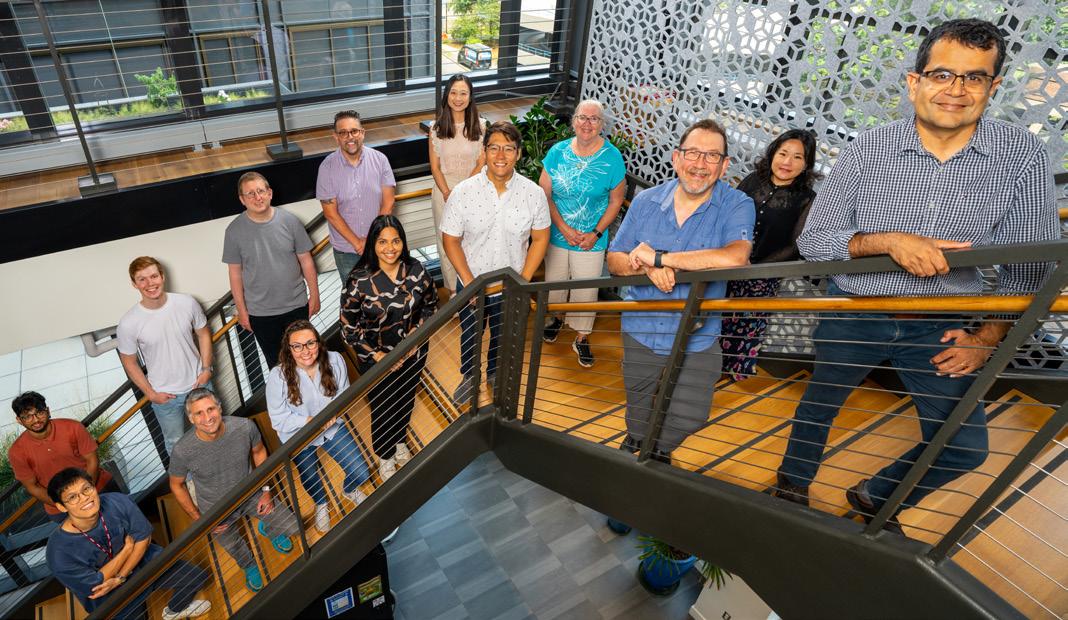
Supported by the DARPA-SHIELD program, a team led by Core Faculty member Samir Mitragotri and Director of Immuno-Materials Michael Super is merging Wyss pathogen-binding and immune-activating technologies to create a Roomba-like treatment that, circulating in blood, could whisk away pathogens before they can become life-threatening. They coat “cellular backpacks,” diskshaped microparticles designed to bind to immune cells, with engineered FcMBL pathogen-binding proteins able to capture more than 130 different pathogens, to trigger powerful immune responses against the detected invaders inside the body without needing to know their identities.
antibiotics. Following a proven AI playbook developed by Core Faculty member James Collins’ group, Clinical Fellow Melis Anahtar and other members of his team trained a deep neural network to predict new antibiotics that are effective against Neisseria gonorrhoeae, and that efficiently kill the pathogen in laboratory settings.
Sepsis is a life-threatening condition affecting millions of newborns annually, which cannot currently be rapidly and accurately diagnosed. To help supplant multiple-day blood-based testing and unnecessary use of antibiotics, Postdoctoral Fellows Justin Rolando and Karan
Malaria is a leading cause of death in children under five and can result in longterm developmental delays, especially in sub-Saharan Africa, which Senior Scientist Kwasi Adu-Berchie knows firsthand from growing up in Ghana. Despite the existence of proven vaccines, the necessity for multiple booster shots prevents many patients from becoming efficiently vaccinated. In partnership with the Gates
Malhotra on David Walt’s NeoSense team are developing a rapid, ultra-sensitive test for sepsis-related biomarkers in the saliva of newborns, using single-molecule detection technology and a powerful machine learning algorithm. This fast and accurate test could help prevent difficult blood draws, preventable deaths, and long-term health complications in infants.
SCIENTIST AND PATIENT PERSPECTIVE

Foundation, international collaborators, and Wyss startup Attivare, Core Faculty member David Mooney and Adu-Berchie are currently investigating slow-release implantable technologies using biomaterial formulations and an approved antigen for their ability to create immunity across different vaccine doses, ages, and sexes, with only one or two booster shots, inching towards more effective malaria prevention in the underresourced world. Read and listen to Kwasi’s story on the Wyss website.
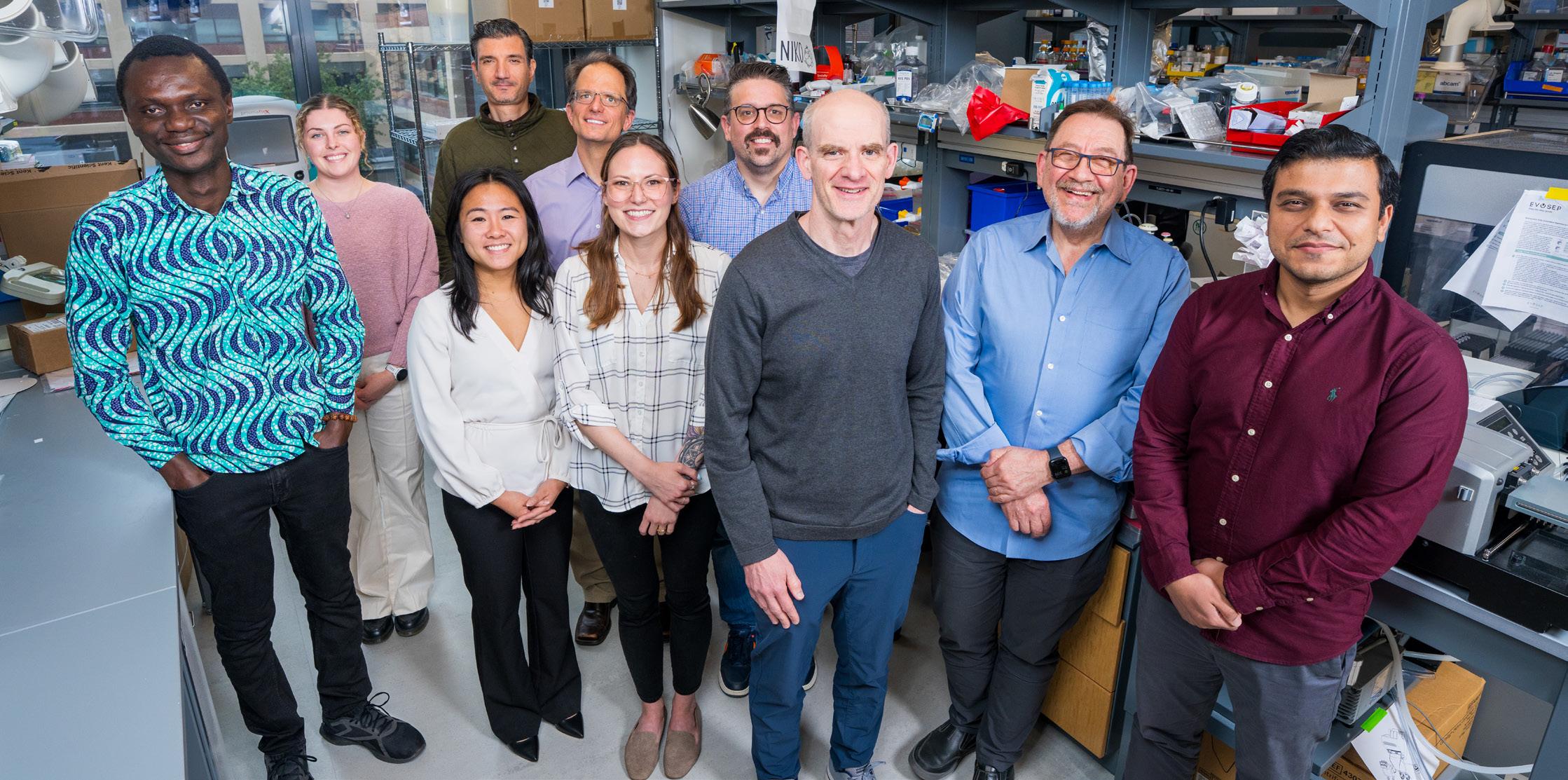

Despite advances in personalized medicine, new drugs, and immunotherapies, many cancers remain untreatable and create secondary health risks that can themselves be life-threatening.
Can the immune system be jolted into action against a wide variety of cancers and other diseases? Associate Institute Director and Core Faculty member Natalie Artzi, Founding Director Don Ingber, Senior Director of Translational R&D Ken Carlson, and Core Faculty member William Shih believe so. With generous support from ARPA-H, the team is advancing a novel RNA immunotherapy delivered through tailored systems that powerfully activate the innate immune system – the body’s first line of defense against tumors as well as many viral and bacterial infections. In cancer patients, this initial response is followed by cancer cell–
Wyss researchers are developing innovative therapies to more effectively activate the immune system, increase the precision of existing treatments, and make side effects more predictable and manageable.
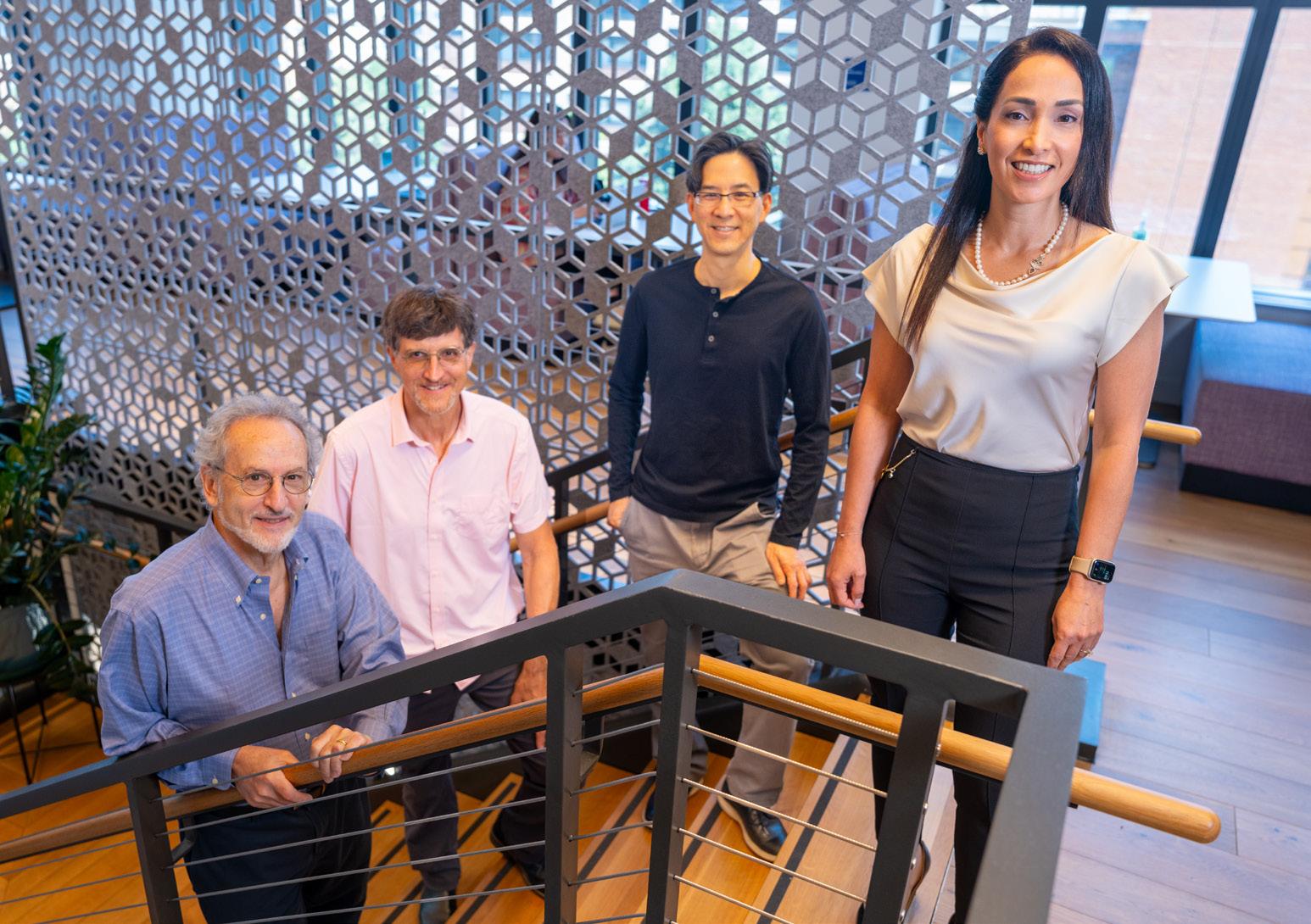
specific T cell and antibody activity, whose tumor-fighting effects can outlast the RNA drug itself and work synergistically with other immunotherapies. The ARPA-H contract enables the team to significantly accelerate and expand their progress toward an Investigational New Drug (IND) submission to the FDA.
Thirty-three percent of patients suffering from malignant pleural mesothelioma, an aggressive lung cancer, who undergo surgery develop blood clots that can impact vital organs with fatal consequences – a risk that Raphael Bueno, Chief of BWH’s Division of Thoracic Surgery, and Wyss bioengineers were not willing to accept. Supported by a philanthropic gift through the Wyss DxA and Validation Project funding, the Blood Clot Dx team, formed by Scientist

Abidemi Junaid, Senior Engineer Adama Sesay, and Founding Director Don Ingber, designed a device that detects abnormal blood flow in mesothelioma patient samples. With the help of machine learning, this would enable the accurate assessment of the risk of blood clot formation in real time and, if needed, timely initiation of anticoagulation treatments.
Esophageal adenocarcinoma, the sixth-most deadly cancer worldwide, thus far can only be treated with chemotherapy, which is started ahead of surgery in the hope of shrinking tumors. However, most patients become
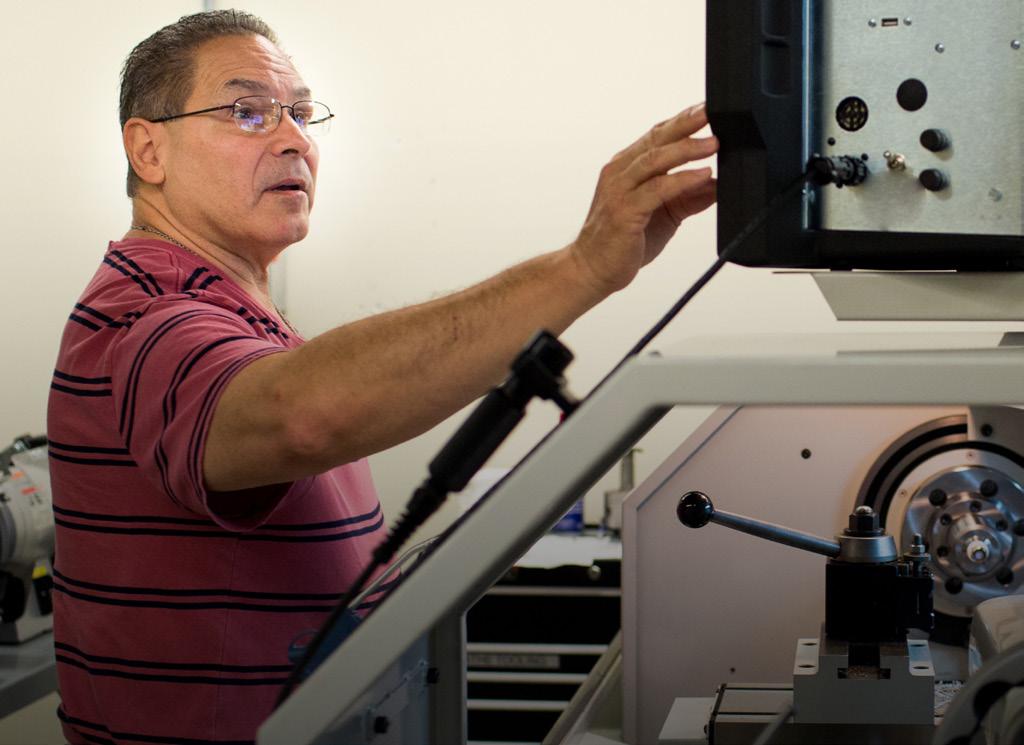
Scientific Instrument Maker John Caramanica has worked at the Wyss for 13 years, contributing to the prototyping of technologies like Organ Chips now being sold internationally by Emulate, the vibrating mattress commercialized by Prapela, and the hemostasis monitor. Now, as he battles metastatic skin cancer, John is more motivated than ever to do his part in fabricating technologies to improve the health of others and our planet.

Read more about John and watch him tell his story on our website.
resistant to certain chemotherapies, leading to poor outcomes. Don Ingber’s team collaborated with Lorenzo Ferri, head of Thoracic and Upper Gastrointestinal Surgery at McGill University in Canada, to develop a personalized medicine solution in the form of patient-specific Esophageal Organ Chips that accurately predict patients’ chemotherapy responses, offering a better way to select more effective treatments for cancer patients at clinical centers.

Plastic pollution, unsustainable manufacturing, and carbon-intensive material production are accelerating a planetary crisis, which impacts human health in countless ways. We need urgent solutions.
At the Wyss, we see our greatest opportunity to address this global challenge in re-imagining the systems and resources we rely on –transforming farming, materials, and manufacturing to be not only highperforming and scalable, but also sustainable and planet-friendly.
During the year, Marika Ziesack, a Wyss Senior Scientist and returning entrepreneur, hosted a live ask-me-anything session with Kurt Keilhacker, General Partner at Elementum Ventures and lecturer at the University of San Francisco, where Wyss researchers engaged in candid conversations about newco team building, engaging and working with venture capital, and commercialization strategies in the sustainability space.
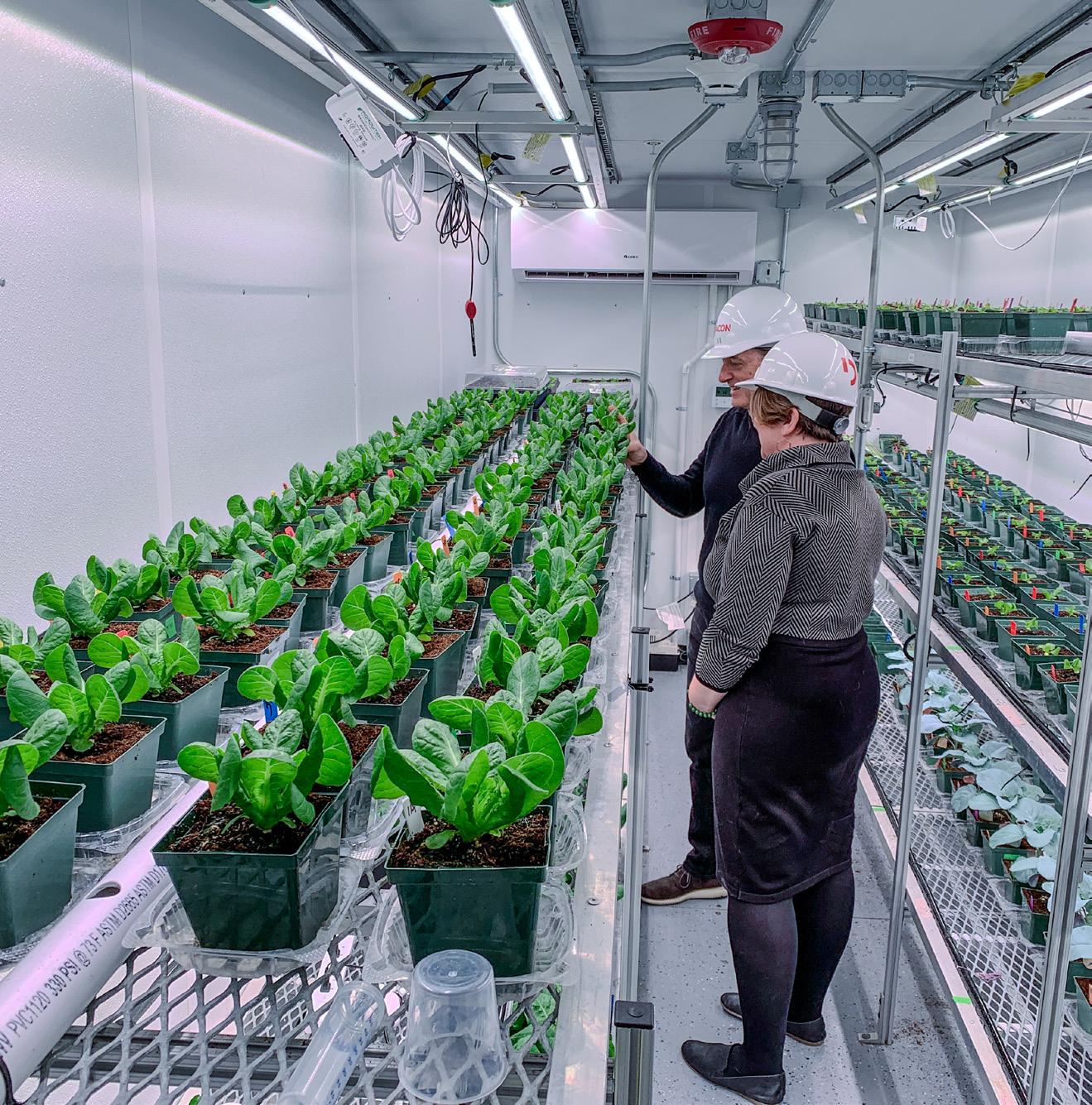
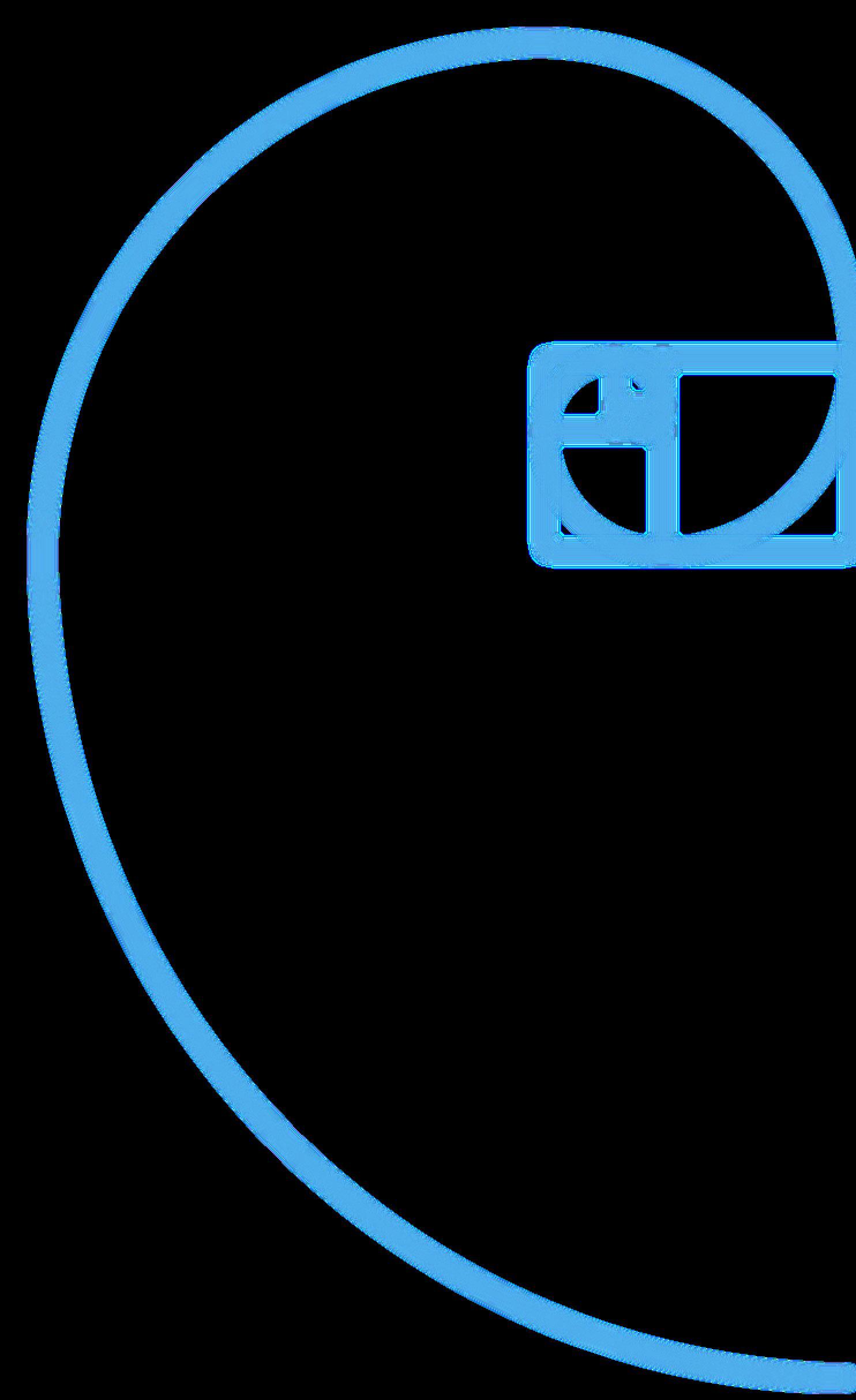
The 2025 Wyss Retreat spotlighted our passionate community and broader ecosystem of supporters with a full slate of high-impact presentations and a dedicated breakout panel discussion on sustainable technology. Speakers showcased technologies we’re currently derisking across the sustainability spectrum, from PFAS biosensors and low-cost water decontamination to AI-enabled bioproduction and cost-competitive biomanufacturing.
During the panel discussion, Funding Sustainable Technology in Our Changing Climate, Wyss Associate Faculty member Joanna Aizenberg, Ashika Kalra (Collaborative Fund), Priyanka Bakaya (ARPA-E), and Daniel Goodwin (Homeworld Collective, a non-profit dedicated to fostering the growth of the climate biotech community) explored how policy, venture capital, and academia could better shape the path to climate innovation. The panel, moderated by Emily Stoler, Principal Scientist for Wyss Sustainable Futures, highlighted that the current period of upheaval


A new bee in the hive
To further support project teams, the Wyss welcomed Helen Wang into the Wyss Mentor Hive. A global expert in AI and data science, Helen advises on how artificial intelligence can reduce the burden placed on R&D through in silico experimentation, while also encouraging deeper thinking across the industries about the carbon footprint of digital tools themselves. Drawing on her international perspective, shaped by work across Asia and the Middle East, she reminds us that effective climate solutions must cross geographic borders.
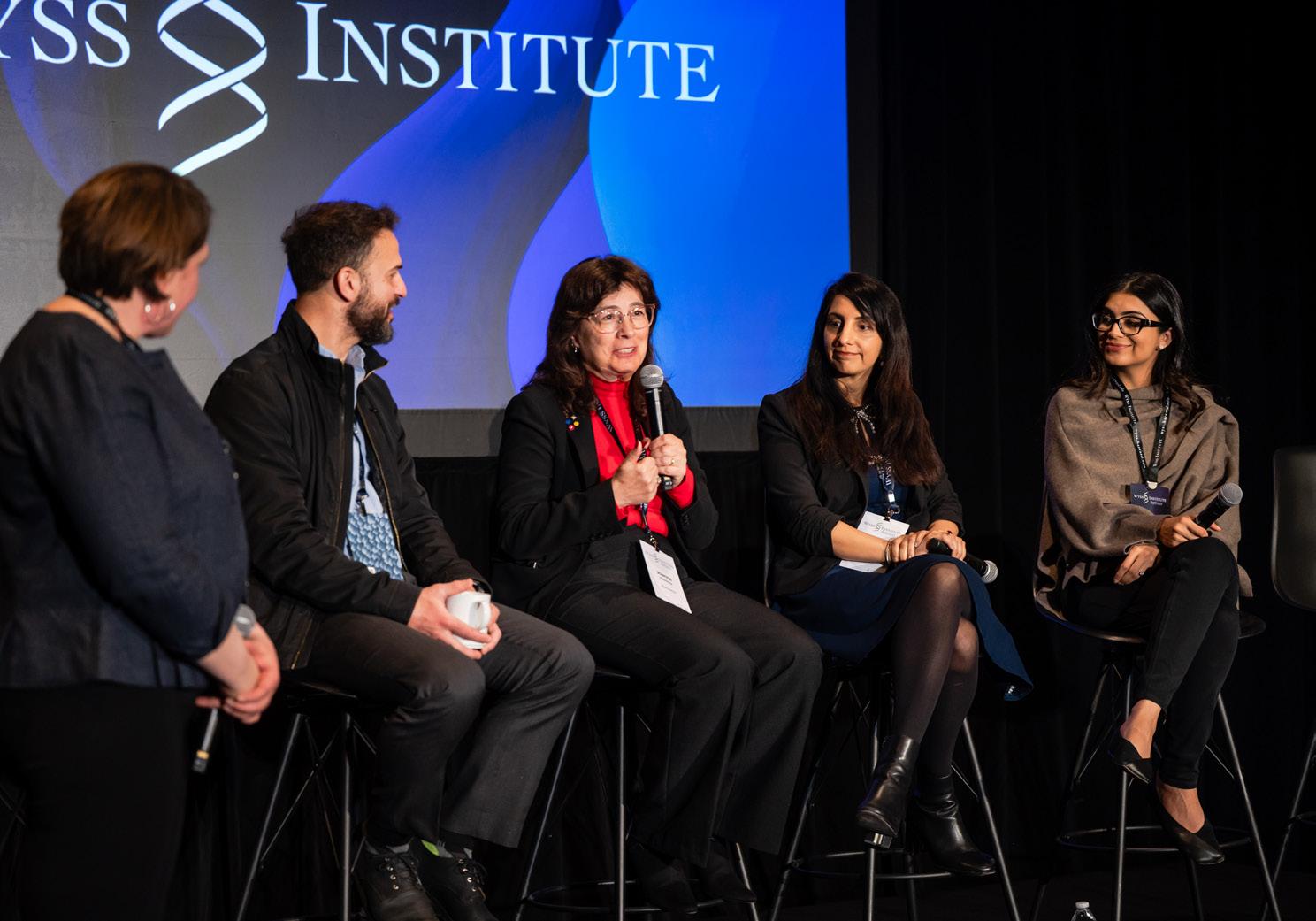
in climate and green tech could be an opportunity to develop new funding models. Together, these conversations underscored the Wyss’ role as a convening force for stimulating the next wave of sustainable biotechnology necessary to protect planetary health.
Emily also brought the Wyss vision to global audiences at ClimateTech and DeepFest, framing how synthetic biology and sustainability innovation can, and must, intersect.

of “forever chemicals”). The project, led by Core Faculty member Pam Silver and Postdoctoral Fellow Simon D’Oelsnitz, was selected for a second year of Validation Project support based on its strong scientific and translational progress. Now, they’ve expanded the team to include Nandhinee Radha Shanmugam, a Postdoctoral Fellow from Founding Director Don Ingber’s lab, who is developing a method to convert the signals from their sensors into a digital readout. PFAS increase the risk of many health conditions including cancer and birth defects, but they are hard to detect because they are color and odorless, and even small amounts can be dangerous.
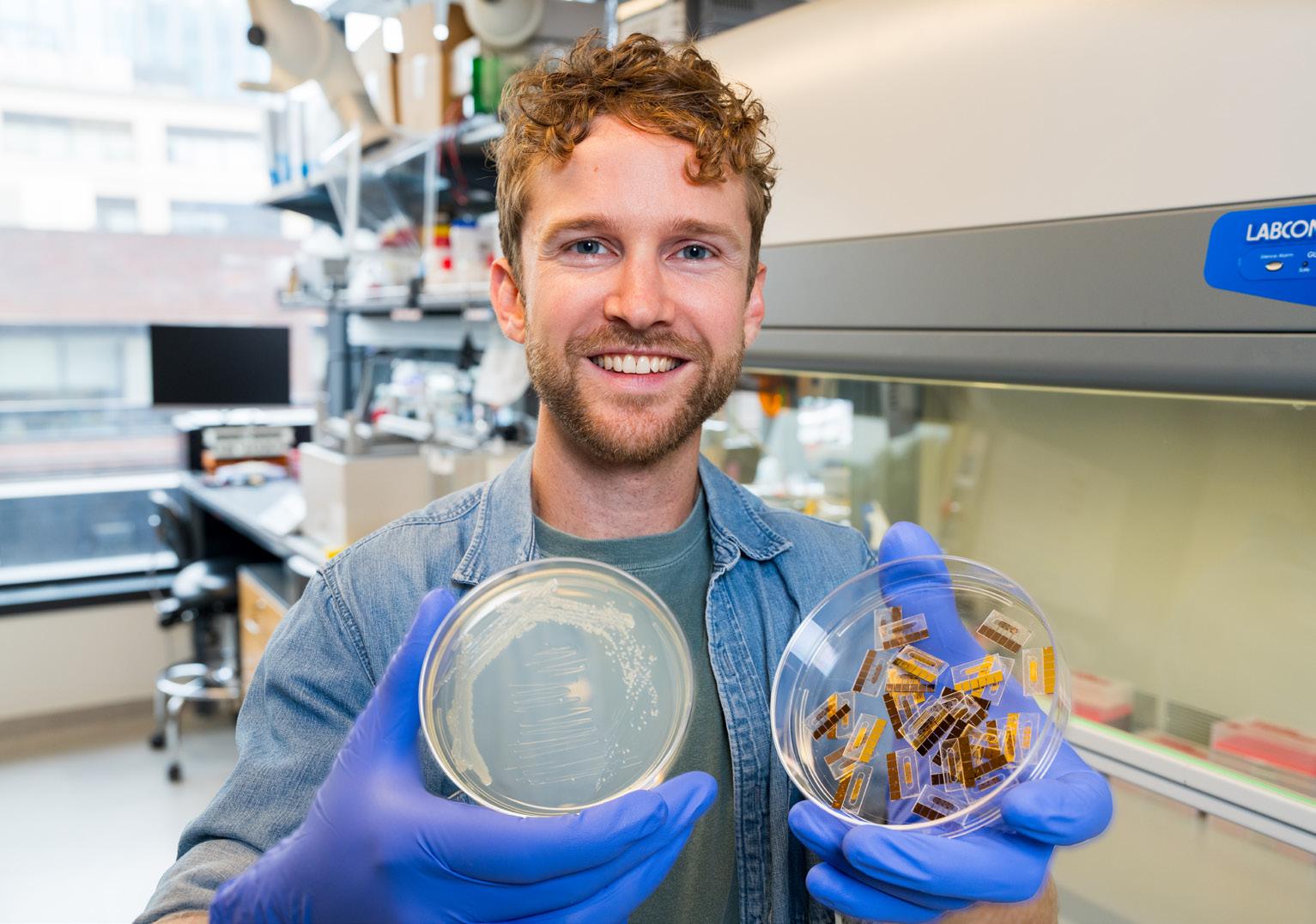
how early-stage ideation and community engagement can accelerate innovation and impact.
Last fall, the Sustainable Futures Initiative hosted a fall hackathon, which brought together scientists and engineers to explore how Wyss technologies could help address PFAS-related health and environmental threats. These conversations helped the PFASense team refine their approach for field readiness. They also helped inform another FY25 Validation Project: Nixe, a plant-inspired engineered material that mimics the lotus leaf’s waterrepellent surface to provide a sustainable, PFAS-free alternative for water-resistant coatings. The hackathon enabled both teams to view their work through new technical, societal, and commercial lenses, underscoring
A team, led by Marika Ziesack and Pam Silver, did a rigorous techno-economic analysis to assess real-world cost drivers in biomanufacturing. They identified key cost “pinch points” in industrial fermentation, particularly the energy-intensive oxygen transfer step, and submitted REFINE for FY26 Wyss Validation Project funding. The project grew out of earlier work through the DARPA Digital Twins program, which pushed teams to use optimized bioreactor designs with AI models. For REFINE, the team will use AI to help optimize a tunable fluid to improve gas delivery without the need for complex or expensive reactor systems – in essence we’re working to drive down the cost of biomanufacturing which could revolutionize the industry.
Project Air, the first initiative funded through our alliance with Collaborative Fund, a climate tech-focused venture firm, launched this year. The project aims to commercialize SNIFFIA, a bioinspired air-monitoring system that detects and quantifies specific volatile organic compounds in real time, surpassing existing sensors. Inspired by how dogs sniff, this technology was developed by Associate Faculty member Joanna Aizenberg and collaborators at Harvard School of Engineering and Applied Sciences, the Harvard Graduate School of
SPEEDR (Solvent & PETase Enhanced Degradation and Recycling) is taking on the challenge of plastic waste by engineering microbes that can degrade commonly used PET plastic and convert it into PHB, a fully compostable bioplastic. The SPEEDR platform integrates PET-degrading enzymes, originally discovered in a bacterium found in a Japanese recycling facility and engineered it further using machine-learning algorithms, with Wyss-developed microbial
“Gerstner Philanthropies is proud to support the Wyss Institute’s efforts to tackle plastic waste through science and innovation. This work aligns with our goal of advancing scalable solutions to reduce plastic pollution.”
DR. ELIZABETH GERSTNER
Gerstner Philanthropies
Design, and the University of North Carolina. SNIFFIA is now being piloted at the Harvard House Zero to validate its real-world performance with additional help from the Wyss and the generous support of Collaborative Fund.
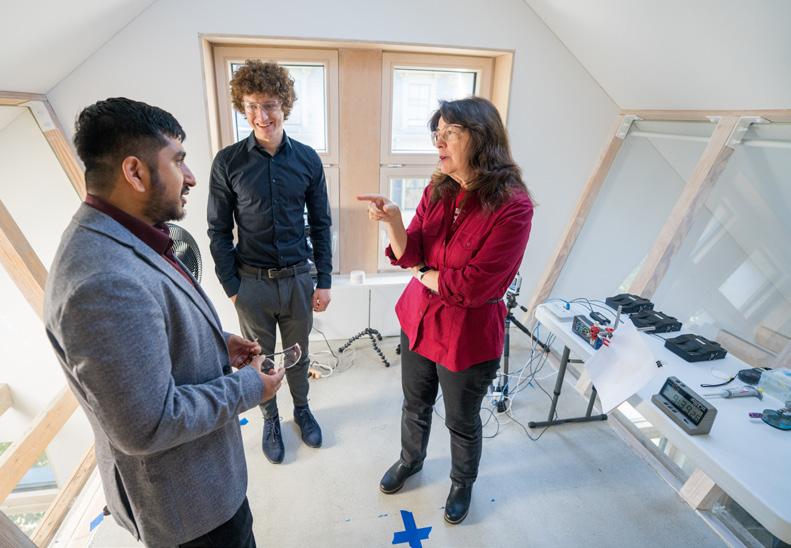

secretion systems, and green solvents to enable efficient plastic breakdown and reuse of waste as feedstock for bioproduction processes. This project is led by Senior Scientist Peter Nguyen and Core Faculty member James Collins, and the prospect of a team finally developing a bioplastic solution at scale attracted the support of Gerstner Philanthropies, which committed to funding the project, exemplifying how targeted philanthropic investment can catalyze innovative, scalable approaches to sustainability.
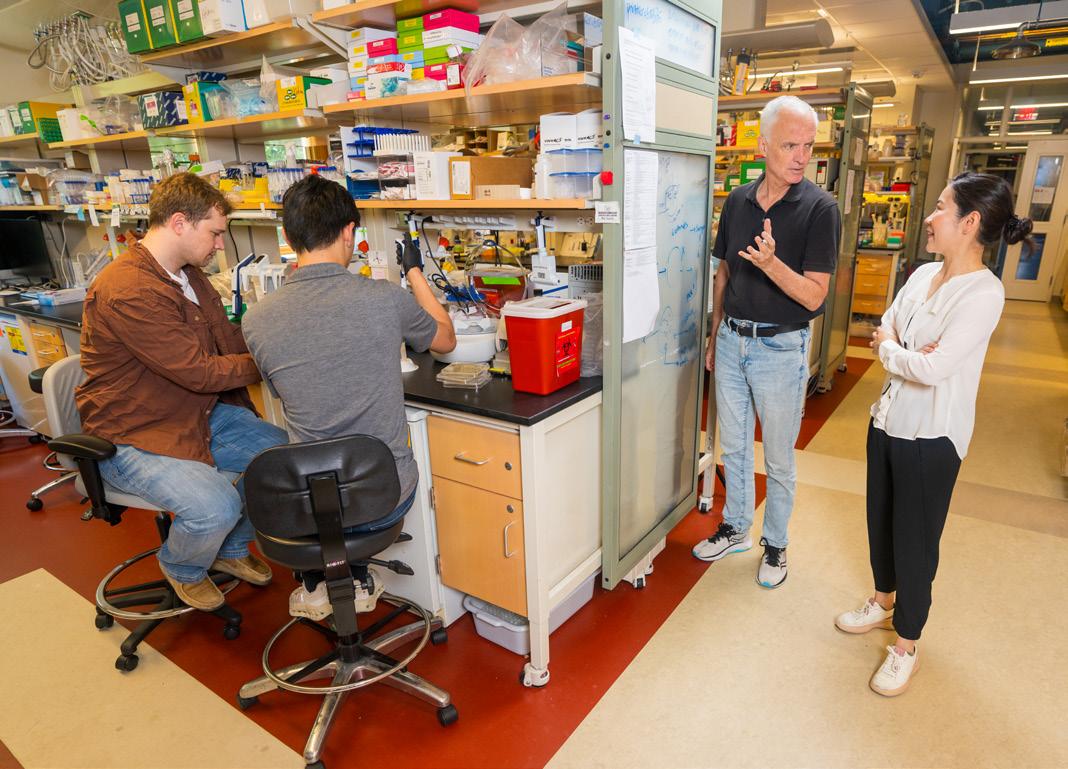

strengthened by visionary partners who share our commitment to innovation. Together, we create the conditions where groundbreaking science can thrive.
The Wyss Institute’s alliance with Northpond Labs, established in 2020, has become a model for how visionary partners can accelerate scientific breakthroughs into real-world solutions. Northpond’s deep commitment and expertise have amplified the Wyss’ culture of innovation, enabling teams to pursue bold ideas with entrepreneurial rigor.
The alliance’s first success, the launch of RNA solution company EnPlusOne Biosciences in 2022, demonstrated how combining scientific excellence with strategic alliances can accelerate translation and create transformative companies. Now, the alliance is celebrating a second major startup achievement: Wyss Associate Faculty member Wesley Wong and researchers Clinton Hansen, Mark Lipstein, and Darren Yang, with Northpond’s crucial support, have developed Lab-on-a-Molecule – a breakthrough drug discovery platform based on DNA Nanoswitch Technology pioneered by the Wong team. This platform provides an unprecedented way to screen for potential drugs
by revealing not only whether compounds bind to disease-related proteins, but also how they change interactions across the protein network –a leap forward in solving one of drug discovery’s most persistent challenges.
Thanks to Northpond’s support, the team launched a startup in 2025 to translate this powerful approach into new therapies, marking another milestone in a collaboration that continues to redefine what’s possible when leading science meets visionary investment.
Collaborative Fund partners with the Wyss to bring mission-driven science to market. Their commitment to sustainability and societal benefit helps ensure that technologies developed can reach people and communities where they are most needed, amplifying the Institute’s global impact. Collaborative Fund created a Laboratory for Sustainable Materials Research and Innovation at the Wyss Institute to support transformational “green” technologies with exceptionally strong potential in the fight for our planet’s health.
With generous support from Collaborative Fund, Project Air is the first project to receive funding through the Laboratory to support the commercialization of SNIFFIA technology. SNIFFIA, short for “Sensory Nature Inspired Fact Finder for Indoor Air,” is an accurate, energy-efficient, and time-sensitive indoor air quality (IAQ)-monitoring system to enable public and private buildings to become safer and more sustainable.
The Scientific Instrumentation @ Wyss Collaboratories Program fosters collaborations between industry manufacturers and Wyss researchers to help advance innovation through state-of-the-art instrumentation. The program has placed multiple cutting-edge instruments at the Wyss Institute for use by our teams, building on the principle of concurrent engineering: developing transformative technologies in parallel with the instruments required to move them forward. Through collaboration with our Instrumentation Program participants, we can accelerate scientific discovery toward new solutions for healthcare and the environment.
Thank you to our 2025 Instrumentation Program Participants who are driving impact and innovation with us:

In 2025, Instrumentation Program Participants joined our annual Wyss Retreat and hosted eight Institute-wide Technology Showcase events throughout the year, presenting top-of-the-line equipment and sparking new applications for researchers. Currently, 12 instruments are being loaned to the Institute through the program, offering capabilities ranging from microscopy, mass spectrometry, chromatography, nanoscale resolution 3D printing, liquid handling, and more.
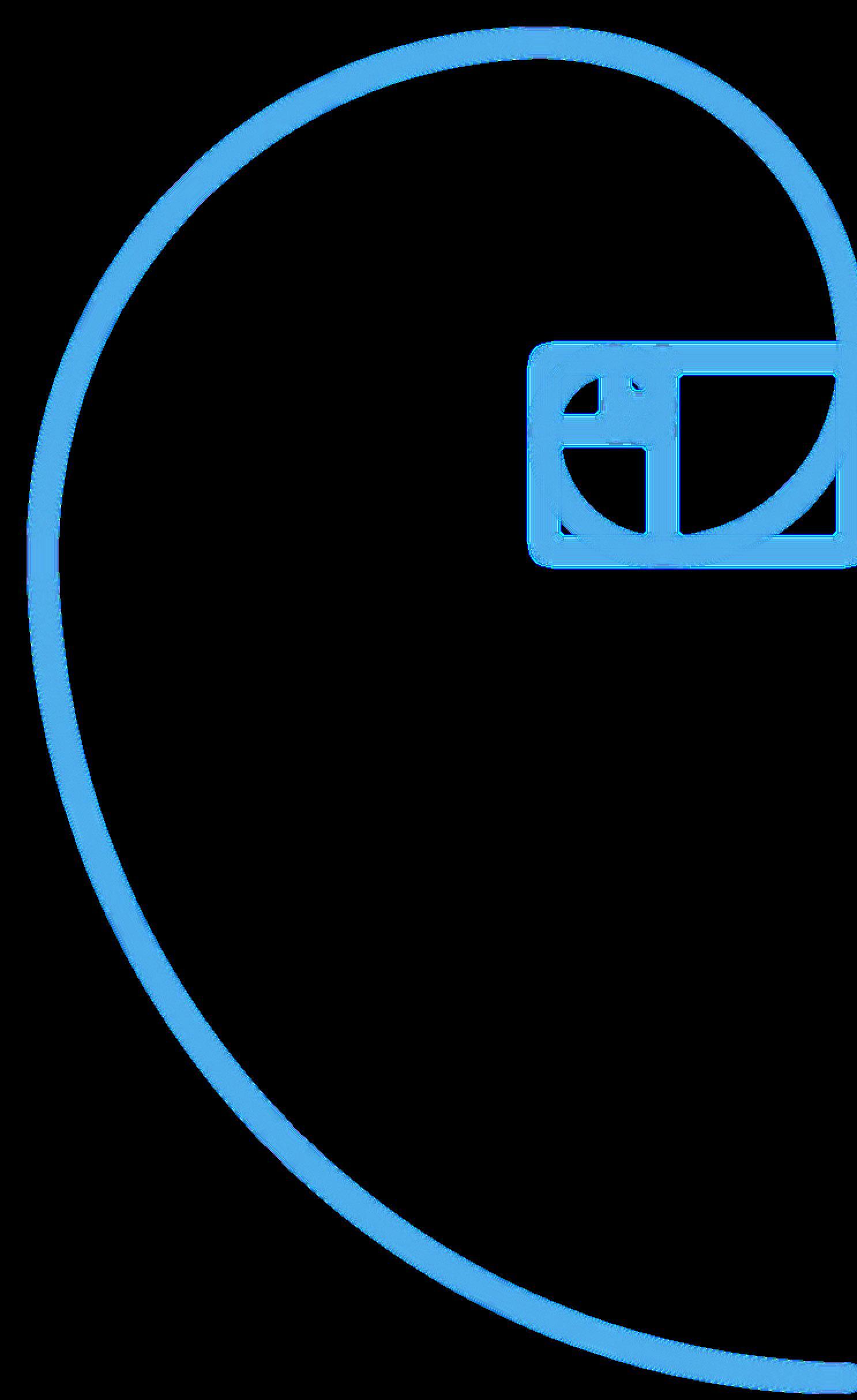
Hansjörg Wyss, founding donor of the Wyss Institute, signs a copy of his biography The Art of Impact, celebrating a legacy of visionary philanthropy and transformative innovation.
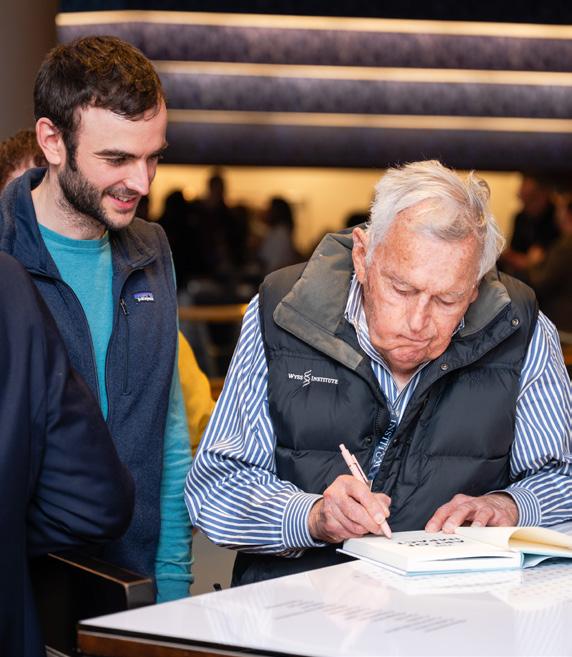
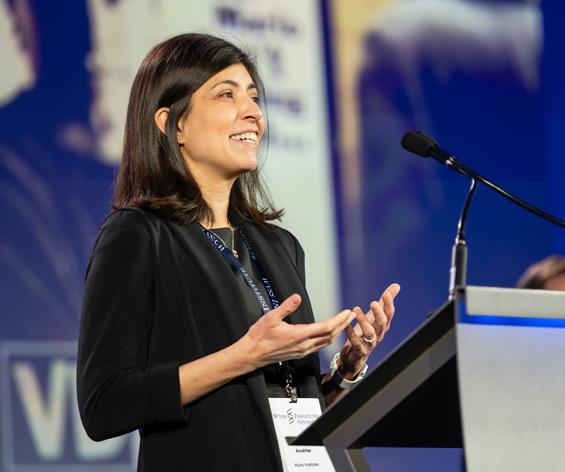
Wyss Retreat
Attendees explore more than 50 artifacts from Wyssenabled startups and technologies on display in the Impact Exhibit.
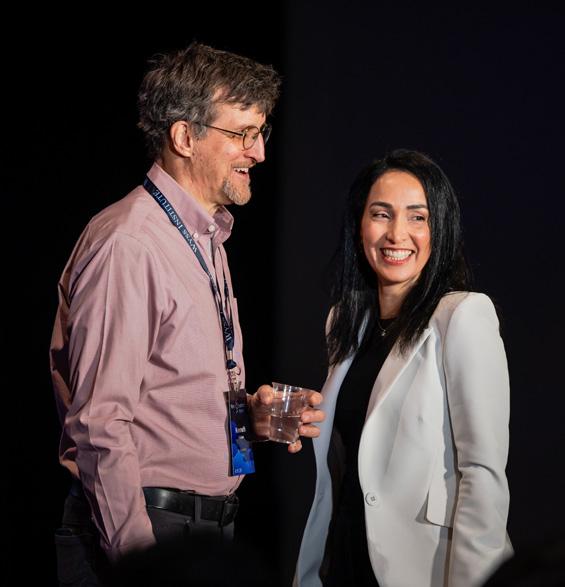
Ken Carlson, Senior Director of Translational R&D, and Natalie Artzi, Associate Institute Director each drive multidisciplinary strategies to translate novel immunotherapeutic platforms from the lab to the clinic. At the Retreat, Carlson led a panel discussion on the real-world problem of delivering nucleic acid therapeutics to patients in need.
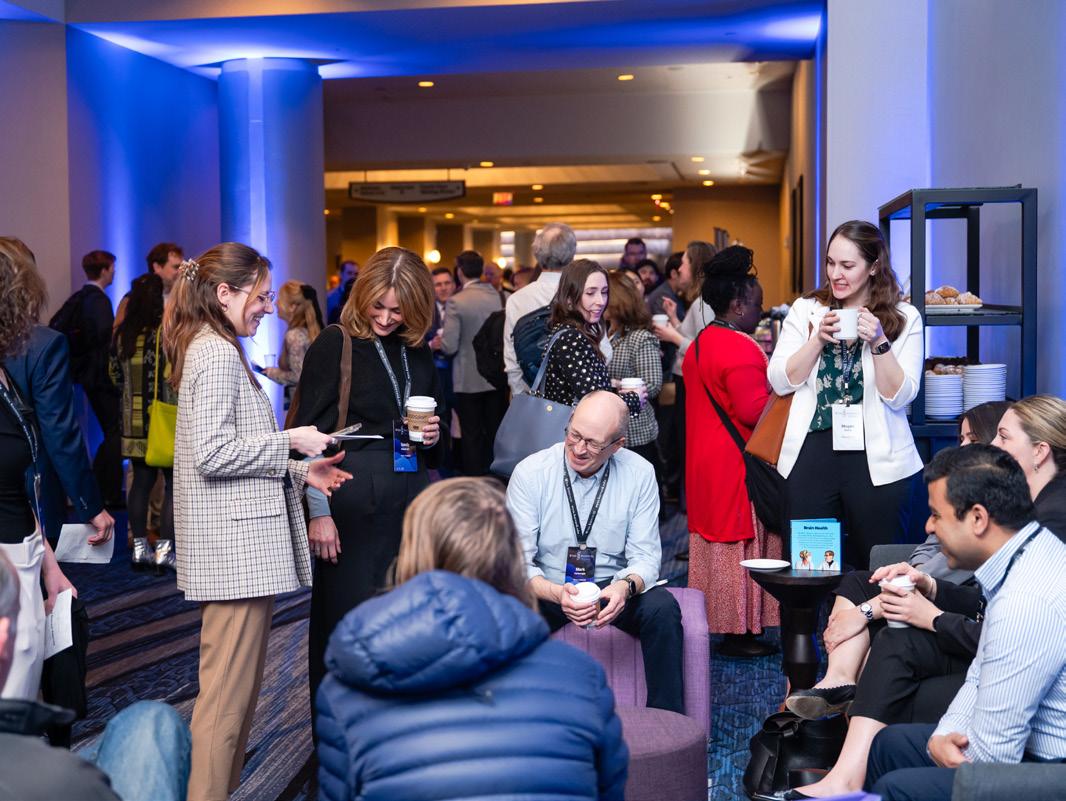
Melis Anahtar, a research fellow in Jim Collins’ lab, presents AI-enabled antibiotic discovery to combat drug-resistant infections.
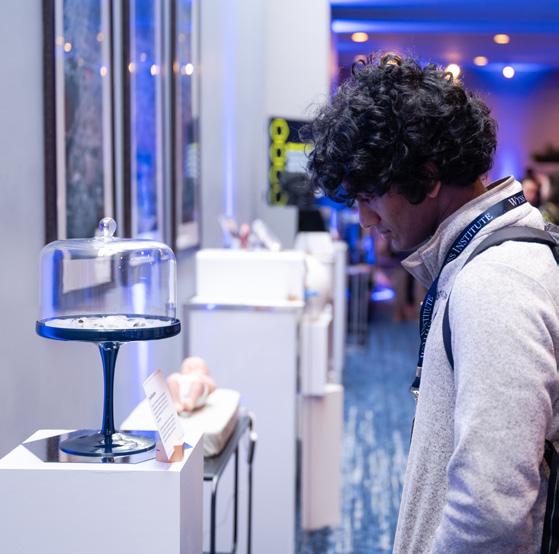
Attendees from the Wyss Institute’s 15 partner hospitals and universities, along with industry collaborators, connect and collaborate during the Retreat – fostering new ideas and partnerships to drive innovation forward.
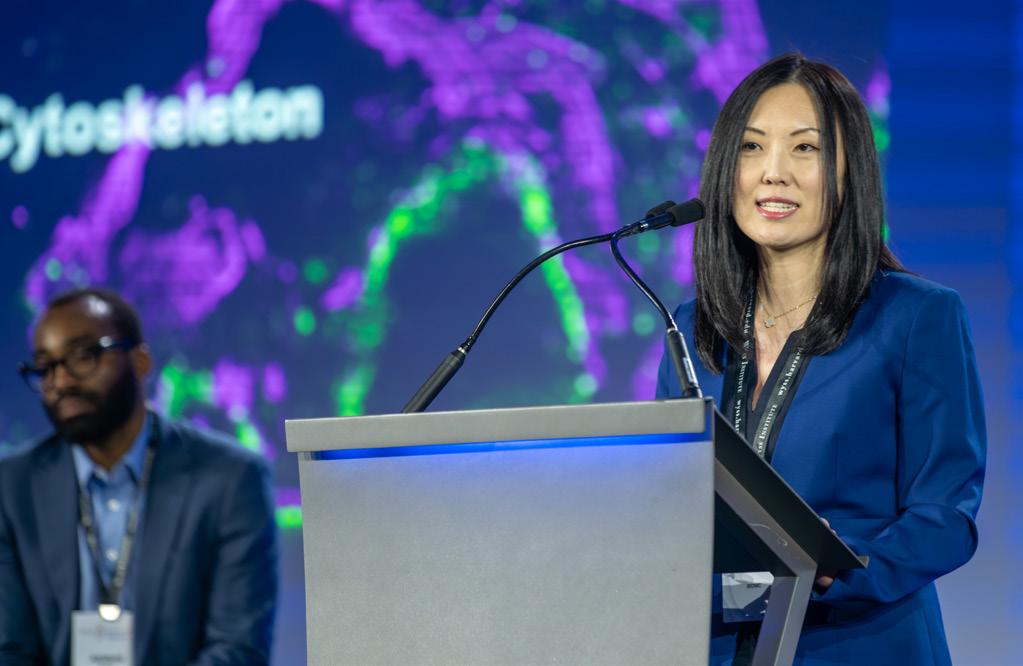
Di Feng, one of our two newest Wyss Associate Faculty members, presents innovative approaches to preserving kidney function under long-term physiological challenges.
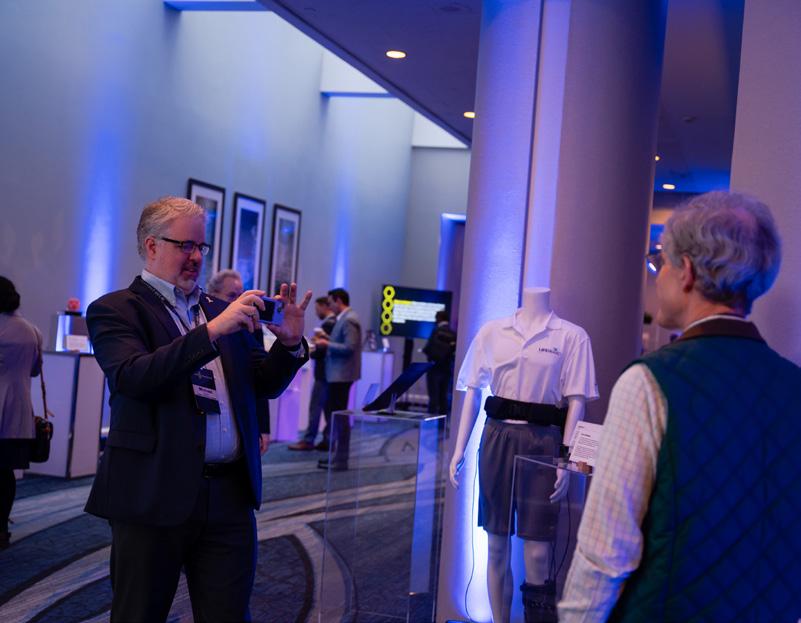
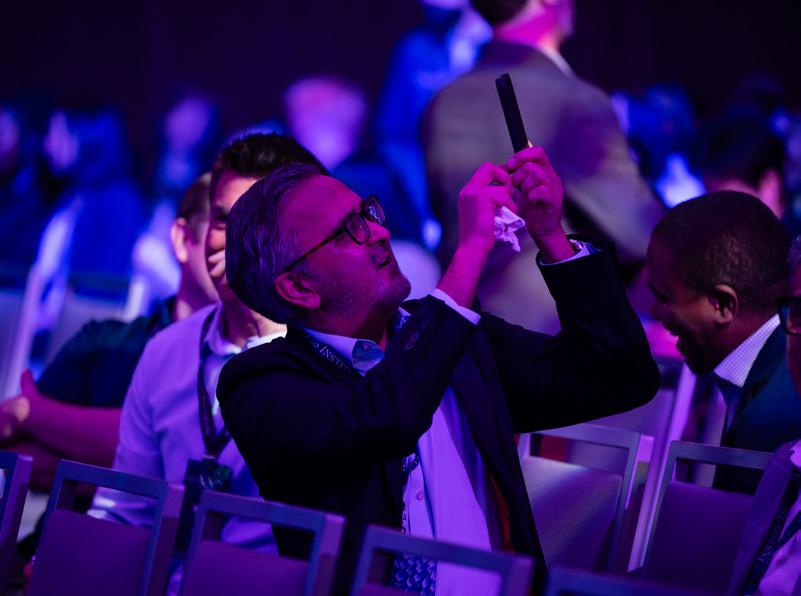


We are grateful to J.P. Morgan, Cooley, and Lila for sponsoring the Wyss Annual Retreat, where more than 550 members of our community of scientists, entrepreneurs, and industry leaders gather to share breakthroughs, spark new collaborations, and chart future directions. Their support sustains the unique collaborative culture that drives the Wyss’ innovation engine.
As Harvard University expands its corporate engagement strategy, the Wyss Institute stands as a model for how collaboration can work effectively and drive discovery forward.
Want to collaborate?
We seek to create unique collaborations with academic institutions, industry, investors, foundations, and philanthropists who share our vision of bridging the divide between breakthrough scientific discovery and commercial impact.
CONTACT: Angelika Fretzen COO & Technology Translation Director discover@wyss.harvard.edu

Wyss Institute Spark Awards turn generosity into action – giving individual donors and families a voice in shaping the breakthroughs that the world urgently needs.
Fueled entirely by donor generosity, the Spark Awards power early-stage Wyss research to improve patient outcomes. This year’s awards are propelling breakthroughs in pediatric cancer, women’s health innovation, and nextgeneration diagnostics – but the possibilities are as limitless as the challenges we face. Every gift reflects personal passions, accelerates discoveries from the lab into our communities, and ignites a lasting legacy of impact for patients everywhere.
The diagnosis of endometriosis, a painful and under-researched condition that affects millions of women worldwide, typically requires invasive surgery. Wyss researchers are working toward a simple blood test to reliably identify biomarkers of endometriosis. A noninvasive, accurate diagnostic test would allow patients with this chronic condition to get answers faster, reduce delays in their care, and improve their quality of life.
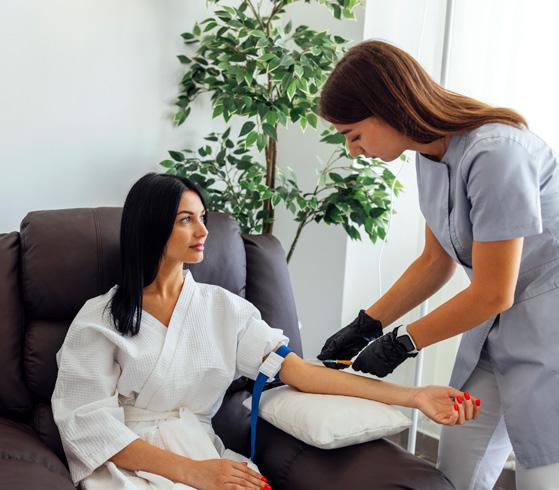

Wyss researchers are developing a first-of-its-kind drug delivery system to help children with aggressive brain cancers, such as glioblastoma and diffuse intrinsic pontine glioma – a rare brain tumor that primarily affects children. The team is developing a biomaterial that, when placed in the brain, can train the immune system to attack cancer cells. This immunotherapy could help kill tumors swiftly and provide longer-lasting protection against cancer and give young patients a better chance at survival.
Tuberculosis (TB) is one of the world’s deadliest infectious diseases, yet many patients go undiagnosed due to slow, inaccurate, or inaccessible tests. This is especially true for underdeveloped parts of the world. The Wyss team is creating a rapid, low-cost urine test to detect biomarkers of TB even in HIV-positive patients, who are at higher risk, but harder to diagnose. This safer, faster, and more reliable test has the potential to help more patients begin treatment sooner and reduce the devastating impact of TB worldwide.
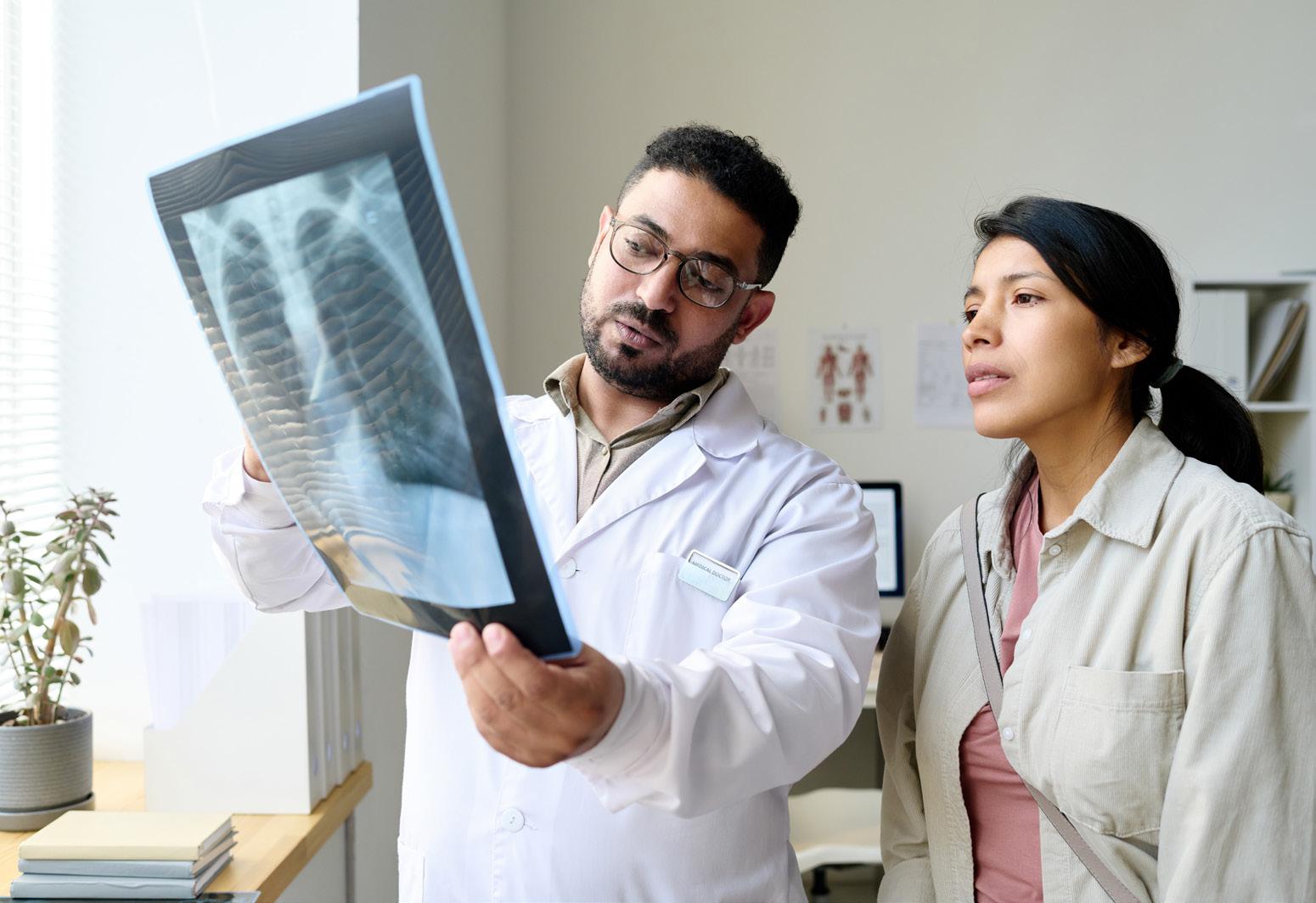
WYSS EFFECT
Spark Award donors contribute to a cascade of breakthroughs outside the Wyss’ walls
Thanks to the generous funding from the 2024 Spark Awards, one Wyss team secured a $1 million grant to revolutionize early detection of necrotizing enterocolitis in newborns. Another Spark Award helped propel Organ Chip technology designed to simulate blood clotting in living vessels into clinical use at Brigham and Women’s Hospital, where it is now being used to study deep vein thrombosis and blood coagulation in cancer patients to improve outcomes following surgery.
Wyss Institute Spark Awards enable donors to directly align themselves with Wyss scientists who work toward urgently needed health care solutions, motivated by personal priorities, compassion, and the drive to innovate.
CONTACT:
Jonelle Prill-Tate Director of Strategic Engagement jonelle.prill-tate@wyss.harvard.edu

We seek industry collaborators to sponsor research and bring Wyss innovation directly to clinicians and patients.
Contact discover@wyss.harvard.edu to learn about our IP portfolio, licensing, sponsorship, collaboration opportunities, and more.
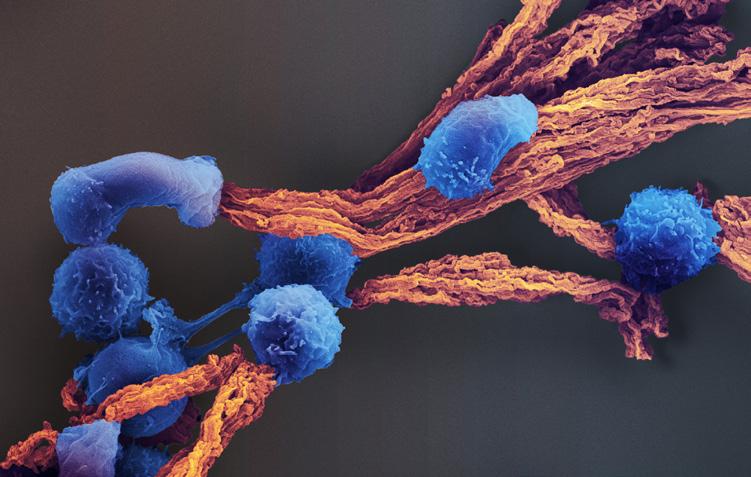
FACULTY LEAD: Dave Mooney
The team is generating T cell precursors known as “progenitor T cells” and equipping them with beneficial cytokines that can be delivered locally to promote thymic regeneration.
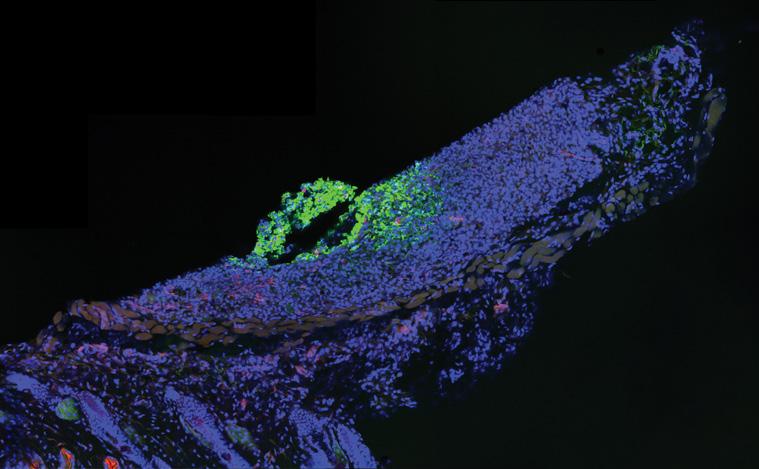
FACULTY LEAD: Dave Mooney
The surface of patientderived T cells is metabolically labeled with azido-sugar molecules that can then be used to attach immune-enhancing cytokines with the help of click chemistry.

FACULTY LEAD: Pam Silver
Protein-based biosensor platform for rapid, affordable, and portable detection of per- and polyfluoroalkyl substances (PFAS, commonly called “forever chemicals”) in the environment.
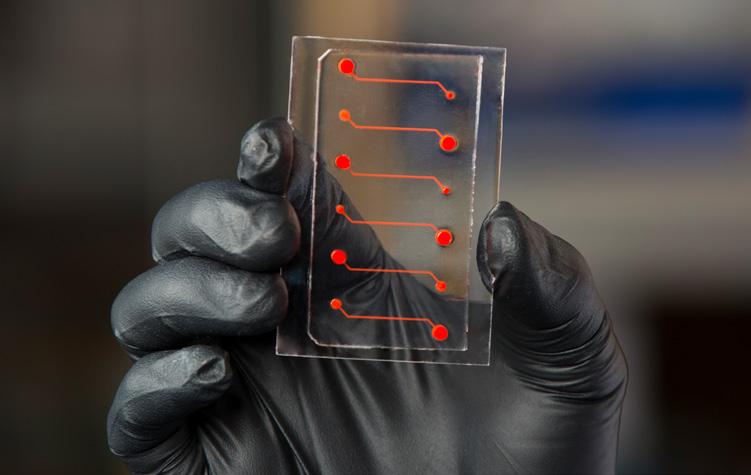
FACULTY LEAD: Don Ingber
Microfluidic chip device that can non-invasively monitor a patient’s blood for evidence of clotting to identify patients at risk for deep vein thrombosis before it causes a pulmonary embolism.
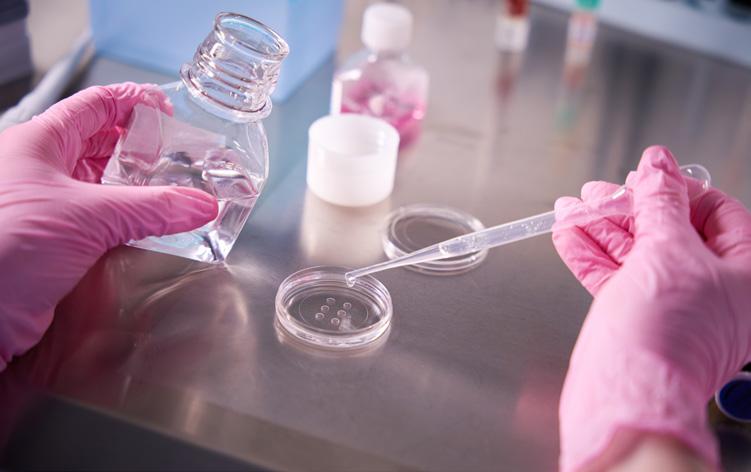
FACULTY LEAD: Peng Yin
Screening platform that allows for precise measurements of molecular binding events with simultaneous identification of chemical compounds affecting them, eliminating many drawbacks of current drug discovery screening techniques.
The Wyss Institute’s AI DataHub enables lifescience companies to develop and validate AI tools using richly annotated, translational datasets, and collaborate with Wyss teams on algorithm development. As part of the new Wyss Translational AI Catalyst, the DataHub curates high-resolution, multiomic data derived from patient samples and advanced tissue models, including Organ Chips and organoids, to drive breakthroughs in drug discovery, biomarker development, toxicology, and more.
Industry participants can access clinically relevant, deeply characterized datasets; inhouse AI/ML models; co-develop and validate


FACULTY LEAD: David Walt
Diagnostic test for salivary detection of sepsis in neonates that uses the latest enzyme-free single-molecule detection technology and a machine learning algorithm based on salivary biomarkers.
AI/ML models using human biology; leverage Wyss expertise in tissue engineering, multi-omics, and AI; and, accelerate innovation in therapeutics, diagnostics, and personalized medicine.
Whether a startup or global pharma leader, contact Ally Chang to learn how the AI DataHub can connect you to an unparalleled ecosystem of biology and AI to advance nextgen healthcare and sustainability solutions.
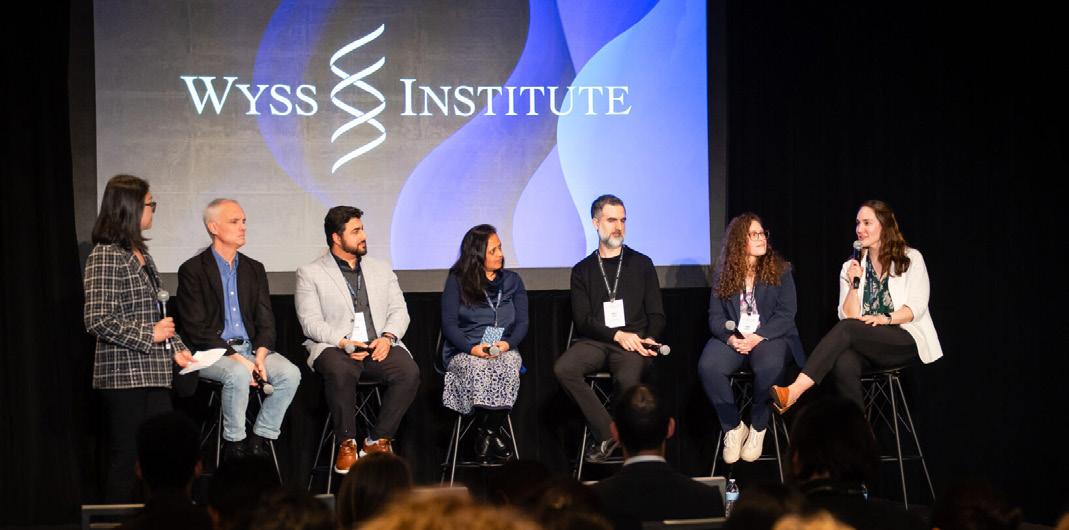

Back the breakthrough – contact
discover@wyss.harvard.edu propel our discoveries out of the lab towards real-world impact.

FACULTY LEADS: Christopher Chen, Jennifer Lewis
3D-printed breast tissue derived from a patient’s own cells that can be easily integrated with the vascular system to offer a safer option for breast reconstruction after surgery.

FACULTY LEAD: George Church
A multi-omics drug development platform that identifies new therapeutic targets for skin and hair disorders and mRNA-based medicines to act on them.
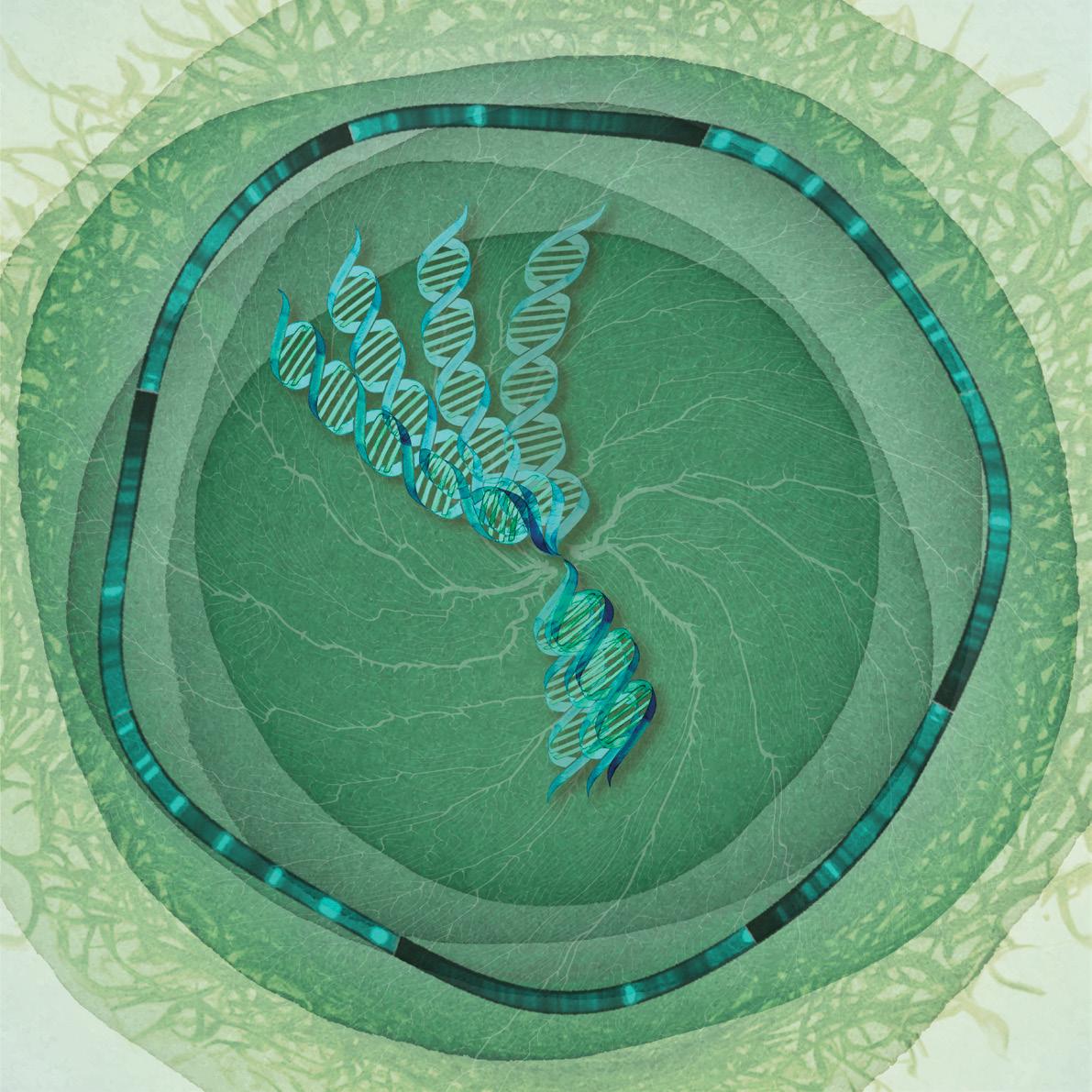
to identify networks of genes that are strongly implicated in aging processes and developing RNA-based therapies that can make old cells young again.
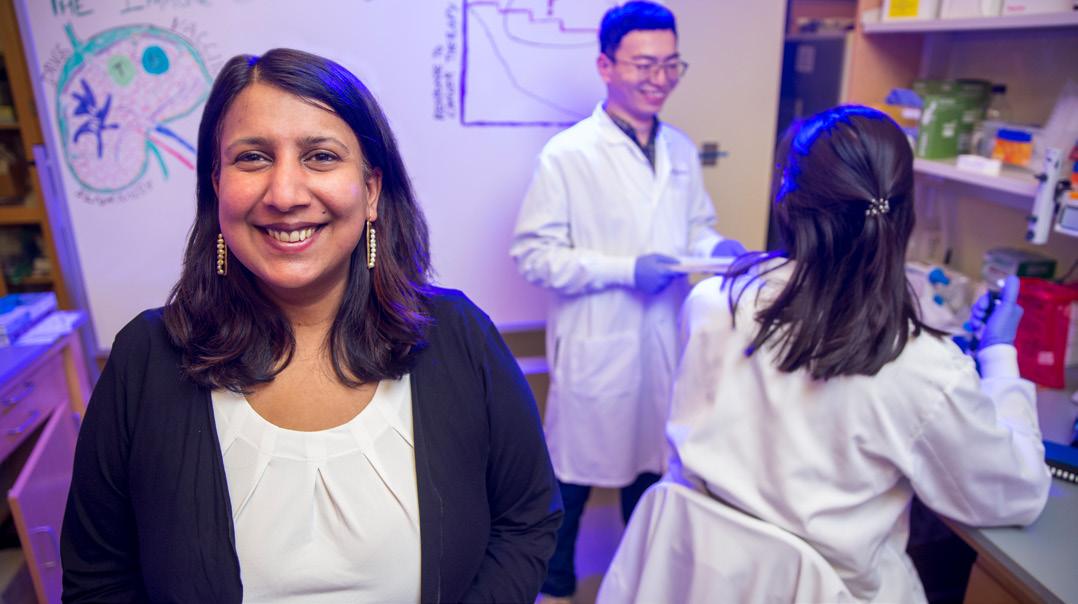
FACULTY LEAD: Don Ingber
Injectable immune organs (iNodes) could transform ovarian cancer treatment by reprogramming the immune system to attack tumors.
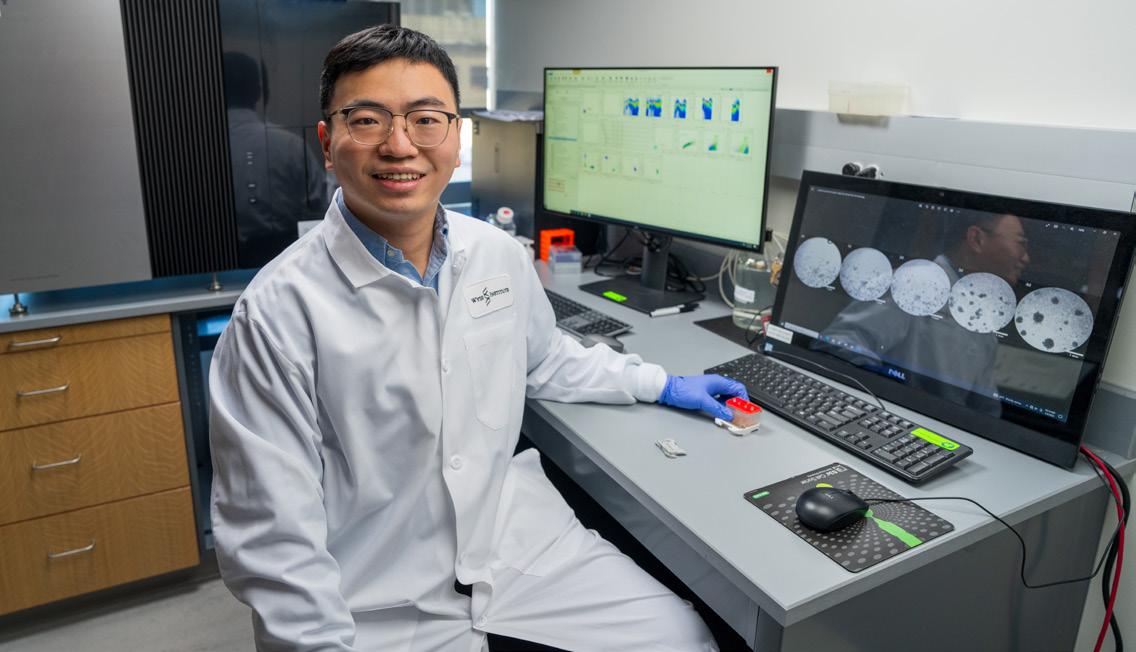
14 TEAMS
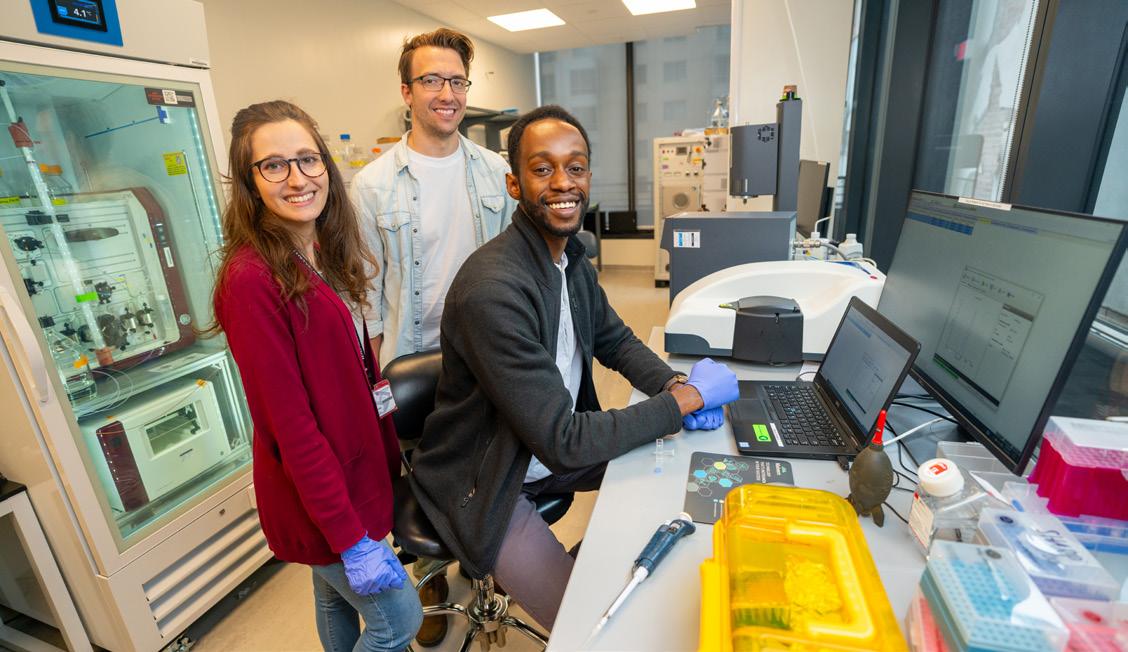

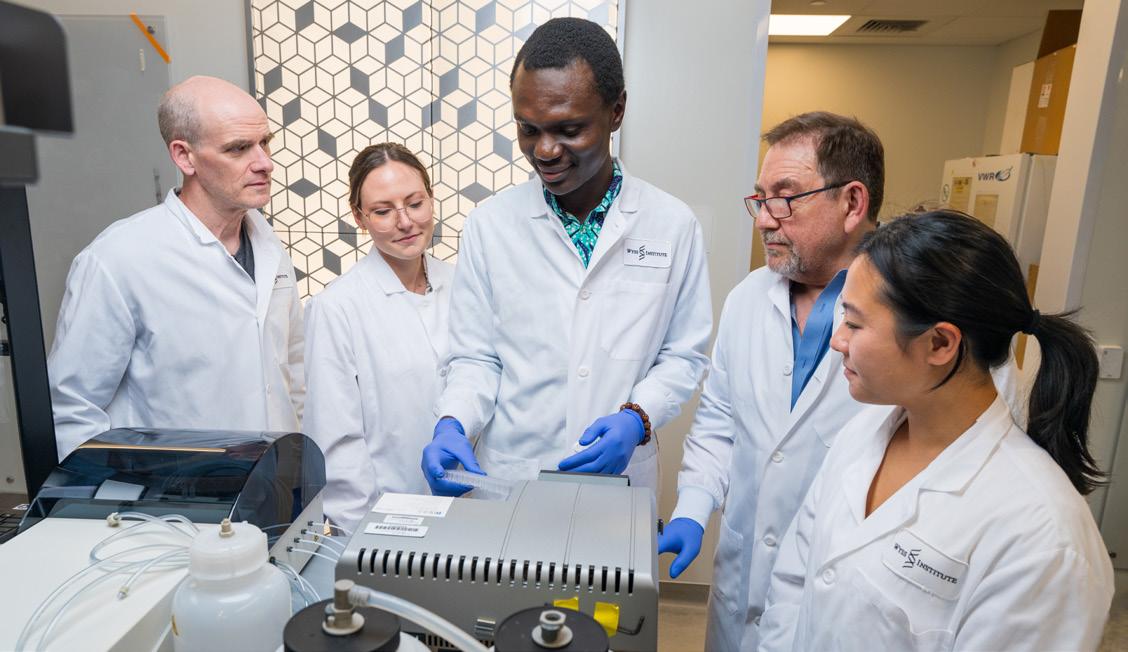

The Wyss Institute’s Validation Projects provide early support for technical derisking of innovative research with the potential for real-world impact in health and sustainability. By funding multidisciplinary teams to develop, validate, and de-risk new technologies, the program helps researchers cross the valley of death between discovery and commercial translation. For 2025–2026, 14 teams were selected to tackle challenges ranging from regenerative medicine and drug discovery to diagnosing unmet diseases and sustainable manufacturing and environmental monitoring.
This year’s projects include Tolerance-Inducing Biomaterials to enable safer therapies for autoimmune disease and tissue injury, PFASense biosensors for rapid detection of toxic “forever chemicals,” and GeneSkin mRNA therapies for scar reduction and hair regeneration. New efforts such as NeoSense, which is creating a saliva test to diagnose sepsis in newborns, and REFINE, which is developing scalable biomanufacturing for sustainable materials, and others exemplify the program’s broad reach.
View the full roster of projects on our website.

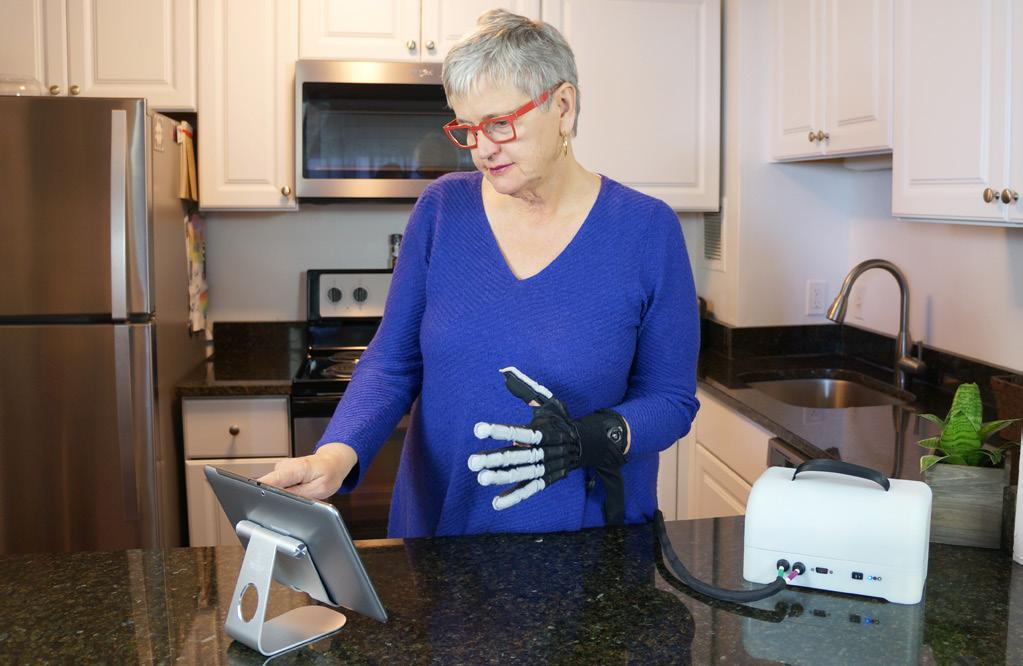
Imago Rehab was awarded a new patent for its wearable rehabilitation device.
The first baby conceived using Gameto’s IVF product Fertilo was born in Peru.
Verve Therapeutics’ early-stage clinical trial showed that patients receiving the highest dose of their gene-editing treatment for people with high cholesterol experienced an average 53% drop in cholesterol, with no safety concerns reported.
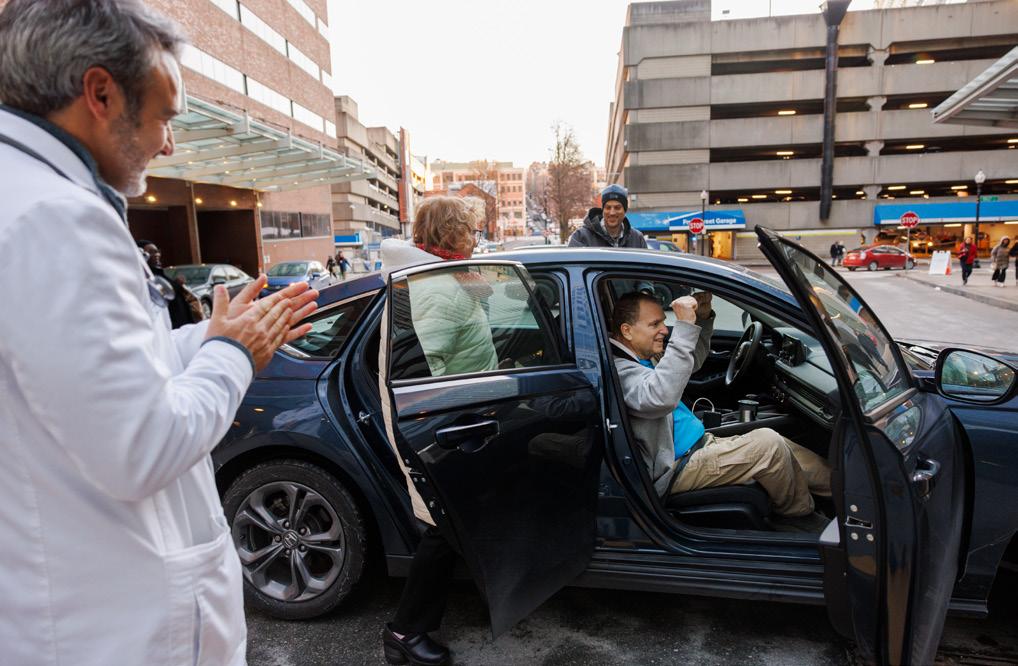
Surgeons at Massachusetts General Hospital performed the second and third xenotransplant of a genetically-modified pig kidney generated by eGenesis into living recipients.
64x Bio launched AAV Apex Suite to power the next generation of gene therapy manufacturing.
Dyno Therapeutics launched three capsid delivery vectors for next-generation eye, muscle, and CNS gene therapies, which are all available for licensing to their gene therapy partners.
In 2025, Emulate launched the AVA Emulation System as a self-contained workstation that cultures, incubates, and images up to 96 Organ Chips in a single run. In 2024, they released a new Chip-R1TM Rigid Chip designed to minimize drug absorption and enhance biological modeling for ADME and toxicology applications.
eGenesis gained FDA clearance on an IND application for a genetically engineered pig liver for a three-patient Phase 1 clinical trial, and later expanded the clinical trial to more than 30 patients nationwide. eGenesis also secured IND clearance for a genetically engineered pig liver designed for extracorporeal use, and plans to enroll 20 patients in a Phase 1 clinical trial.
FDA announced plans to phase out animal testing over the next 3–5 years, citing the success of the Emulate Liver Chip as a paradigm for the future of biomedical research. The NIH is building on this momentum by requiring that animal alternatives, including organ chips, be integrated into future grant applications.
Gameto received FDA IND clearance for Fertilo, their iPSCbased therapy for women’s health, and announced the first U.S. clinical site for enrollment in their Fertilo study. Australia recently became the third country to permit Gameto’s IVF treatment.
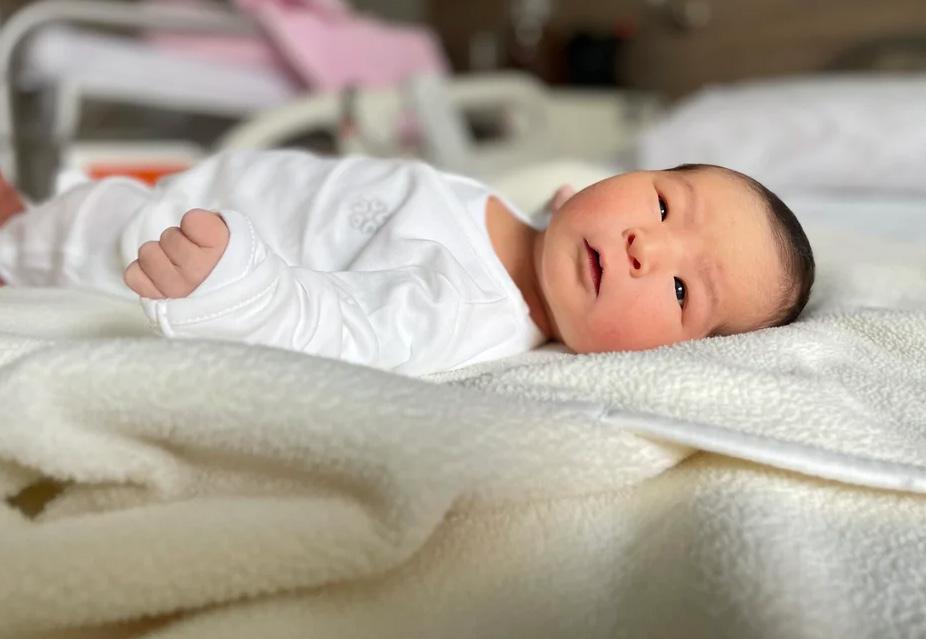
Prapela was granted FDA De Novo device designation for its SVS hospital bassinet pad to treat neonatal opioid withdrawal syndrome.
Spear Bio device designation for its novel pTau 217 blood test, which could be used for early Alzheimer’s diagnosis.
Unravel Biosciences study application in Colombia to begin proofof-concept clinical trials for RVL-001 for Rett syndrome and Pitt-Hopkins syndrome.
The FDA awarded Track designation for VERVE-102 for the treatment of individuals with hyperlipidemia and high cardiovascular risk to lower LDL-C levels.
AcousticaBio
NIAD for sustained delivery of HIV-1 broadly neutralizing antibodies via SC injection of hydrogel microparticles.

Colossal Biosciences secured $200M in Series C funding, elevating the company’s valuation to $10.2B and earning it “decacorn” status.
EnPlusOne Biosciences raised $10M.
Gameto was awarded $10M from ARPA-H’s Sprint for Women’s Health to further develop its therapeutic development program for menopause. Gameto also raised $44M Series C to fund Phase 3 study of stem cell IVF therapy.
GC Therapeutics raised $65M in Series A financing.
Pluto Biosciences raised $3.6M to expand their AI-powered multi-omics analysis platform for the pharmaceutical industry.
Sherlock Biosciences was acquired by OraSure Technologies.
Spear Bio raised $35M in Series A funding and was awarded $250K by the Massachusetts Life Sciences Center tax incentive program to create 10 new jobs.


Tender Food was awarded a $5.4M grant from the Department of Energy to expand its energyefficient plantbased meat production.
Verve Therapeutics was acquired by Eli Lilly and Company for $1.3B.
Dyno Therapeutics signed a second research collaboration agreement with Roche to develop AAV vectors for gene therapies targeting neurological diseases.
Kula Bio and other leading companies launched the American Alliance for Biomanufacturing to bolster U.S. industrial leadership.
NuProbe granted ANGLE an option for an exclusive global license of their pan-cancer nextgeneration sequencing panel outside of China.
Rejuvenate Bio entered into a licensing agreement with Protect Animal Health to develop and commercialize a proprietary gene therapy for MMVD in dogs in the Asia-Pacific region.
Unravel Biosciences launched a collaboration with COMBINED Brain to discover therapeutics for over 100 rare neurological disorders with unmet need. They also announced a collaboration with The Jackson Laboratory to expedite and identify promising drug candidates for clinical development and expanded their collaboration with the CSNK2A1 Foundation
to identify drug candidates for Okur-Chung Neurodevelopmental Syndrome.
Colossal Biosciences de-extincted the dire wolf. They also created mice that have woolly mammoth hair traits.
Editas Medicine demonstrated therapeutically relevant levels of HBG1/2 promoter editing in hematopoietic stem cells with a single dose of their proprietary tLNP in non-human primates. The approach is in preclinical development as a potential treatment for sickle cell disease and beta thalassemia.
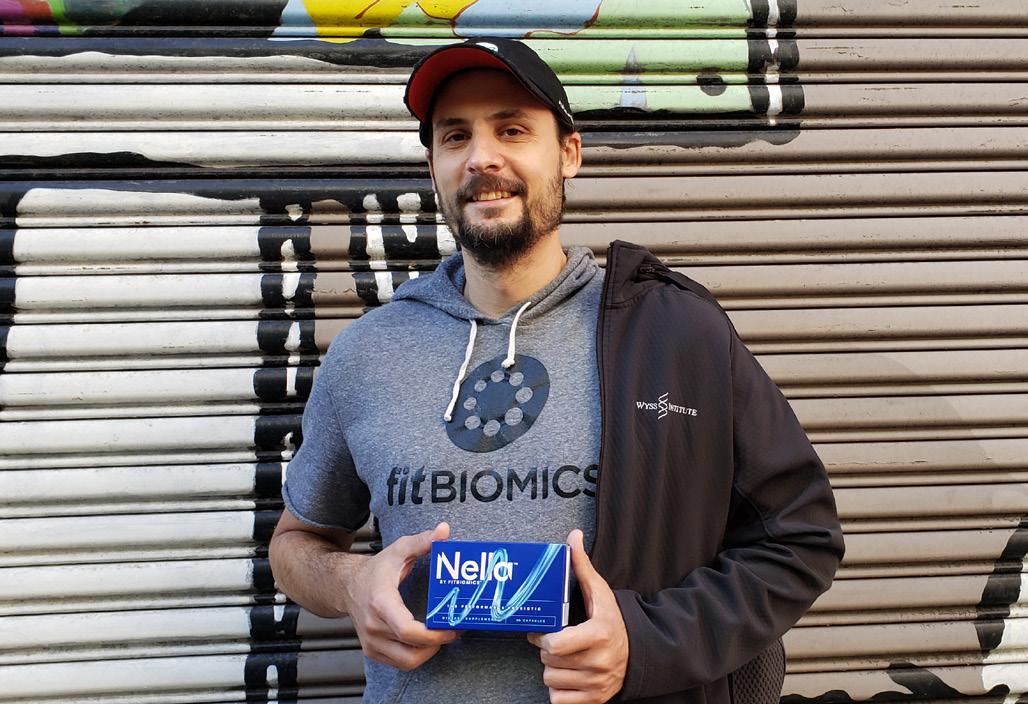
FitBiomics announced research that concluded that the athlete-derived probiotics contained in their product, Nella, improve non-athlete wellness.
GC Therapeutics published data validating that their TFomeTM Platform effectively generates human microglia-like cells from stem cells in days.
NuProbe demonstrated the capabilities of its blocker displacement amplification technology for detecting low-level variants for oncology research.
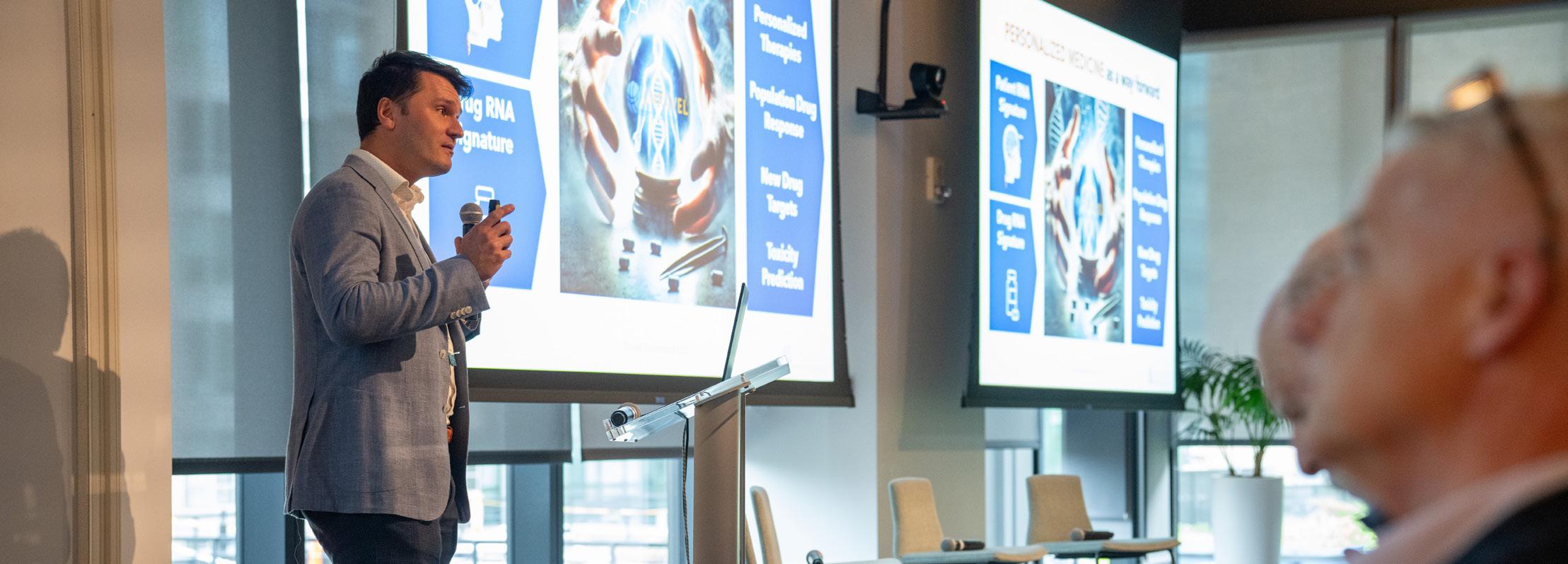
Wyss Lumineer Richard Novak, who cofounded Unravel in 2021 together with Frederic Vigneault, Wyss Founding Director Don Ingber, and Associate Faculty member Mike Levin, makes it a vital part of his mission to be deeply engaged with Rett syndrome patient and clinical communities in the fight of this devastating rare disease. In record time, the startup had obtained FDA Orphan Drug Designation for its lead drug – a disease-modifying therapy – and is soon starting a clinical trial with 15 female patients in Colombia to evaluate its efficacy and safety.
“We are grateful for the widespread excitement from Rett patient caregivers about the upcoming clinical trials and the potential they hold in advancing an effective therapy for this challenging disorder,” said Novak. “In fact, we have initiated regular calls with Rett syndrome advocacy groups across Latin America to discuss ways to better address patient and caregiver needs, research collaboration opportunities, and
provide them with updates on our clinical translation progress.”
The Unravel team exemplifies the Wyss’ capabilities and commitment to solve high-value medical problems. Novak, in particular, was a critical driver of multiple groundbreaking Wyss initiatives, including Ingber’s Organ Chip and drug repurposing platforms. He, Vigneault, staff scientist Tiffany Lin, and others harnessed novel AI capabilities that Ingber’s group had developed in 2015 as part of the Wyss-led DARPA THoR project. Initially designed to answer why some patients were tolerant to infections while others suffered, and to identify drugs that could be repurposed to induce this tolerance in others, the AI suite was further advanced in the Wyss’ Biostasis project and the COVID-19 pandemic for different applications. Focusing on Rett syndrome, a rare genetic childhood autismtype disorder primarily affecting girls, Unravel used the platform by taking a targetagnostic approach to identify entire gene networks that are thrown off-balance and identify drug candidates able to normalize them again, demonstrating this first in silico, then in an innovative tadpole model and mice, and now in human patients.

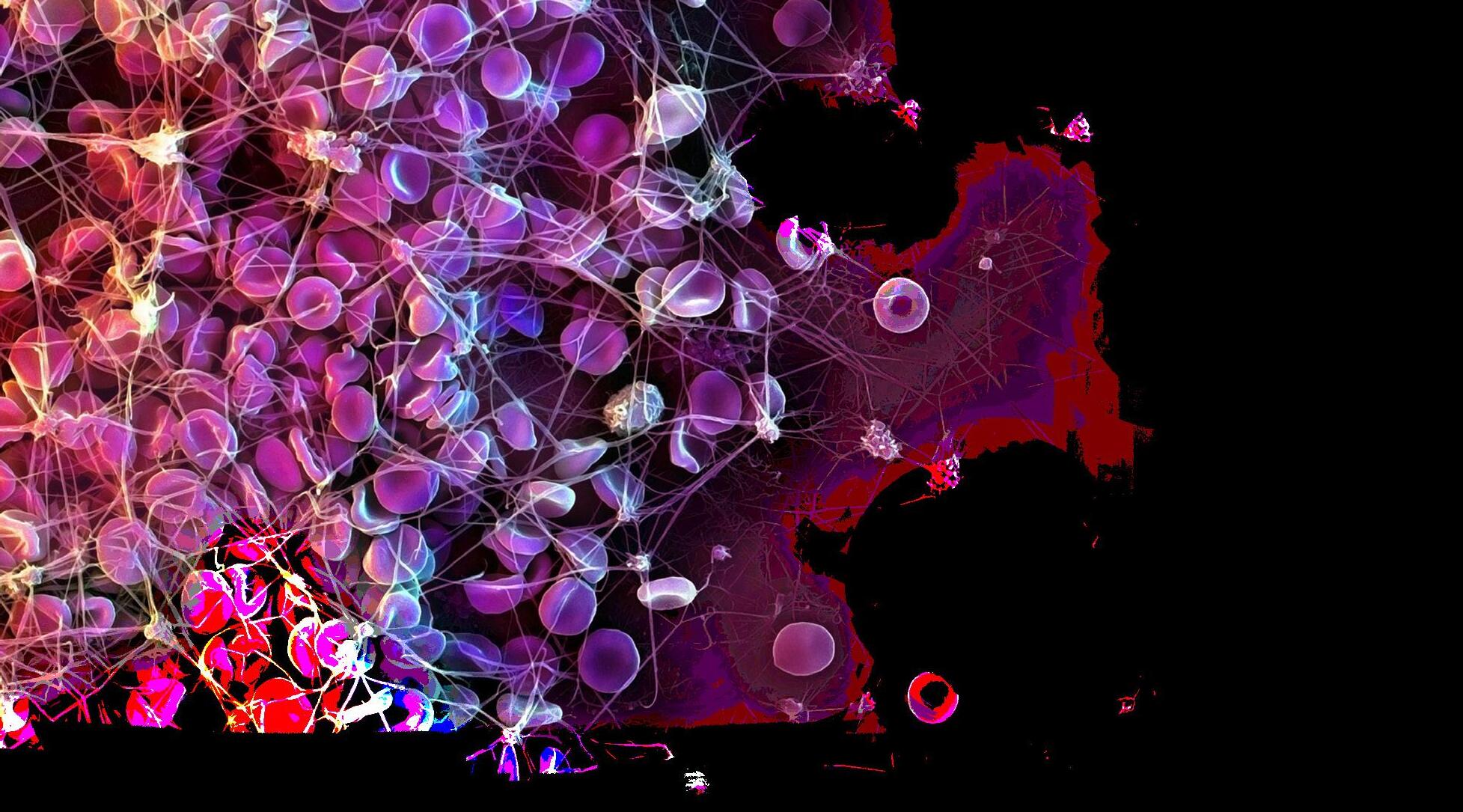
Congratulations to all of the hard-working members of the Wyss Community on their many accomplishments this past year!
Natalie Artzi, 2025 Alexander M. Cruickshank Lectureship Award, Gordon Research Conference
Elliot Chaikof, 2025 Elected Fellow, American Academy of Arts and Sciences
Christopher Chen, 2025 BMES-CMBE Shu Chien Achievement Award, Biomedical Engineering Society
George Church, 2025 Most Influential Bostonians, Boston Magazine; 2024 Quadrangle Fund for Advancing and Seeding Translational Research (Q-FASTR) Award, Harvard University
Jim Collins, 2025 IEEE Medal for Innovations in Healthcare Technology, Institute of Electrical and Electronics Engineers
Jennifer Lewis, 2024 R&D 100 Award, R&D - Research & Development World; 2025 StarFriedman Challenge for Promising Scientific Research, Harvard University; 2025 James Prize in Science and Technology Integration, Council of the National Academy of Sciences
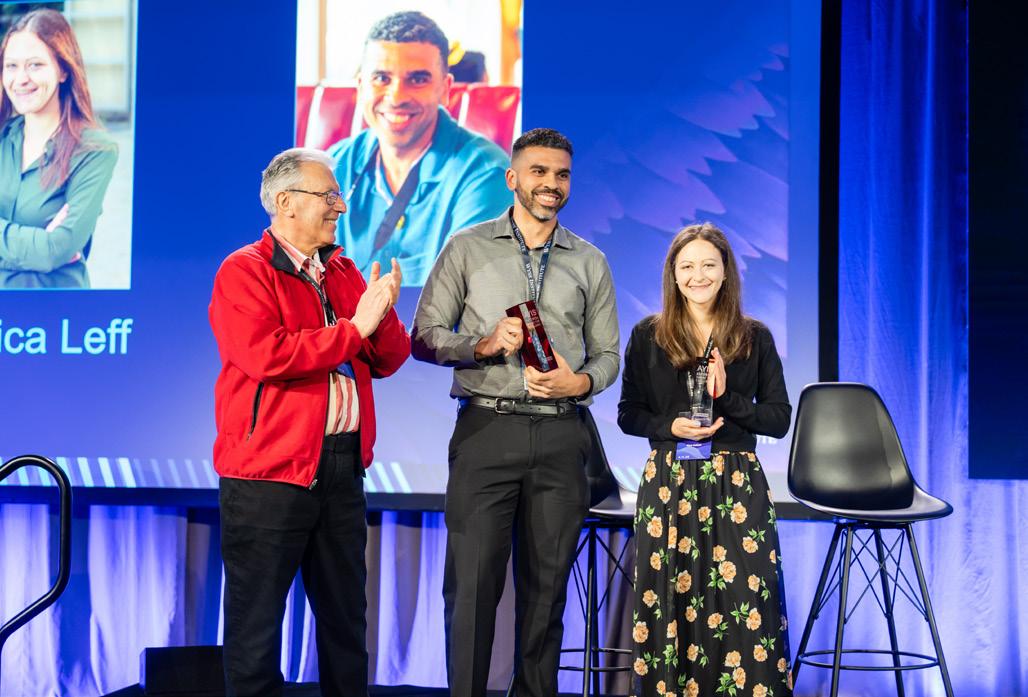
Jessica Leff and Max Rousseau, 2025 Ayis Antoniou Award for Excellence in Administration and Operations, Wyss Institute

Samir Mitragotri, 2025 Elected Fellow, American Academy of Arts and Sciences; 2025 Founders Award, Controlled Release Society
Ellen Roche, 2025 Presidential Early Career Award for Scientists and Engineers, United States Government
Pam Silver, 2024 Quadrangle Fund for Advancing and Seeding Translational Research (Q-FASTR) Award, Harvard University
David Walt, 2024 National Medal of Technology and Innovation, National Science Foundation

Kwasi Adu-Berchie, 2024 STAT Wunderkind, STAT News
Junzhe Lou, 2025 CMBE Postdoctoral Researcher Travel Award, Biomedical Engineering Society
Ayush Noori, 2025 Rhodes Scholar, Office of the American Secretary, Rhodes Trust, University of Oxford
Sara Whiteman, 2025 Nominee, Dolores J. Brown Staff Award, Harvard Medical School
Breaking, 2025 World Changing Ideas Award, Fast Company
Colossal Biosciences, 2025 Most Influential Companies, TIME
Imago Rehab, 2024 Healthcare AI Impact Award, Modern Leaders
Kula Bio, 2024 FoodTech 500, Forward Fooding
Limax Biosciences, 2025 President’s Innovation Challenge Finalist, Harvard Innovation Labs
ReConstruct, 2025 Portal Pioneer Awards, Nucleate
Gameto CSO Christian Kramme, 2025 Innovators Under 35, MIT Technology Review
Unravel Biosciences CEO and Co-Founder
Richard Novak, 2024 Termeer Fellow, Termeer Foundation
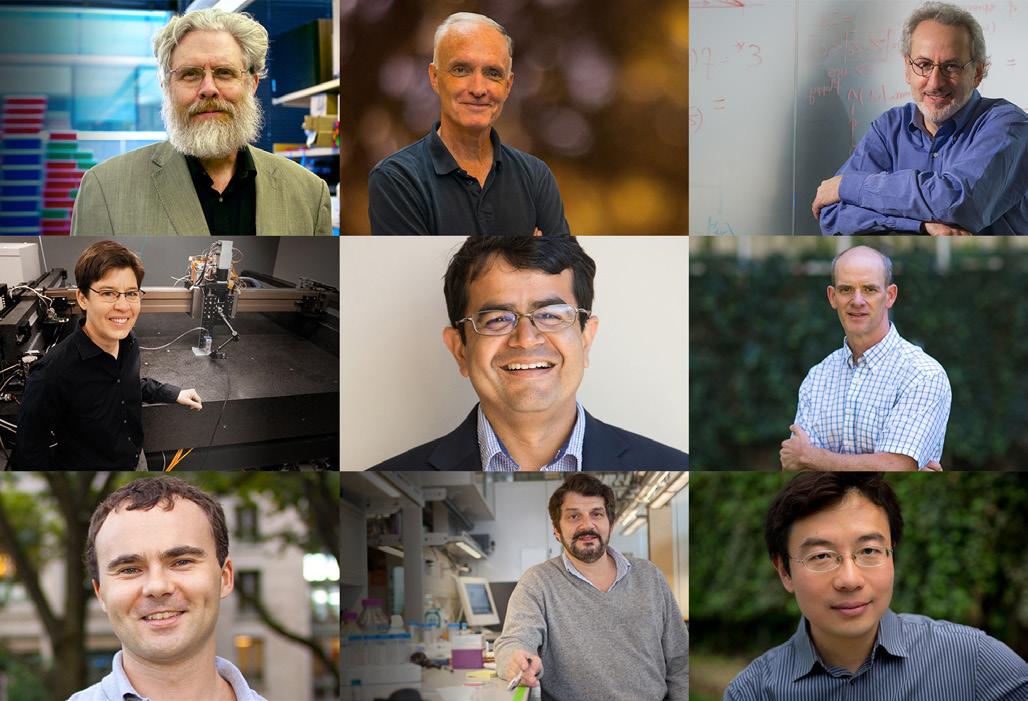
George Church, Jim Collins, Don Ingber, Jennifer Lewis, Samir Mitragotri, Dave Mooney, Conor Walsh, David Weitz, and Peng Yin, 2024 Highly Cited Researcher, Web of Science Group, Clarivate Analytics

operating revenues reaching $84.7 million, a result made possible by the unwavering support of our donors, partners, and research collaborators. Leading this success, Gifts for Current Use totaled $39.9 million, reflecting the generosity of our philanthropic community. This vital support advanced scholarships, faculty excellence, transformative student experiences, and innovative programs that make a lasting difference.

In collaboration with our research partners, we secured $23.5 million in Industry and Foundation Grants & Contracts and $16.8 million in Federal Grants & Contracts, representing the research effort in addressing critical challenges in global health, technology, and environmental sustainability.
Additional revenues – including $2.6 million from Investment Earnings and $1.9 million from Royalties Distribution and other income – further strengthened our capacity to drive long-term innovation and translate research into real-world solutions.
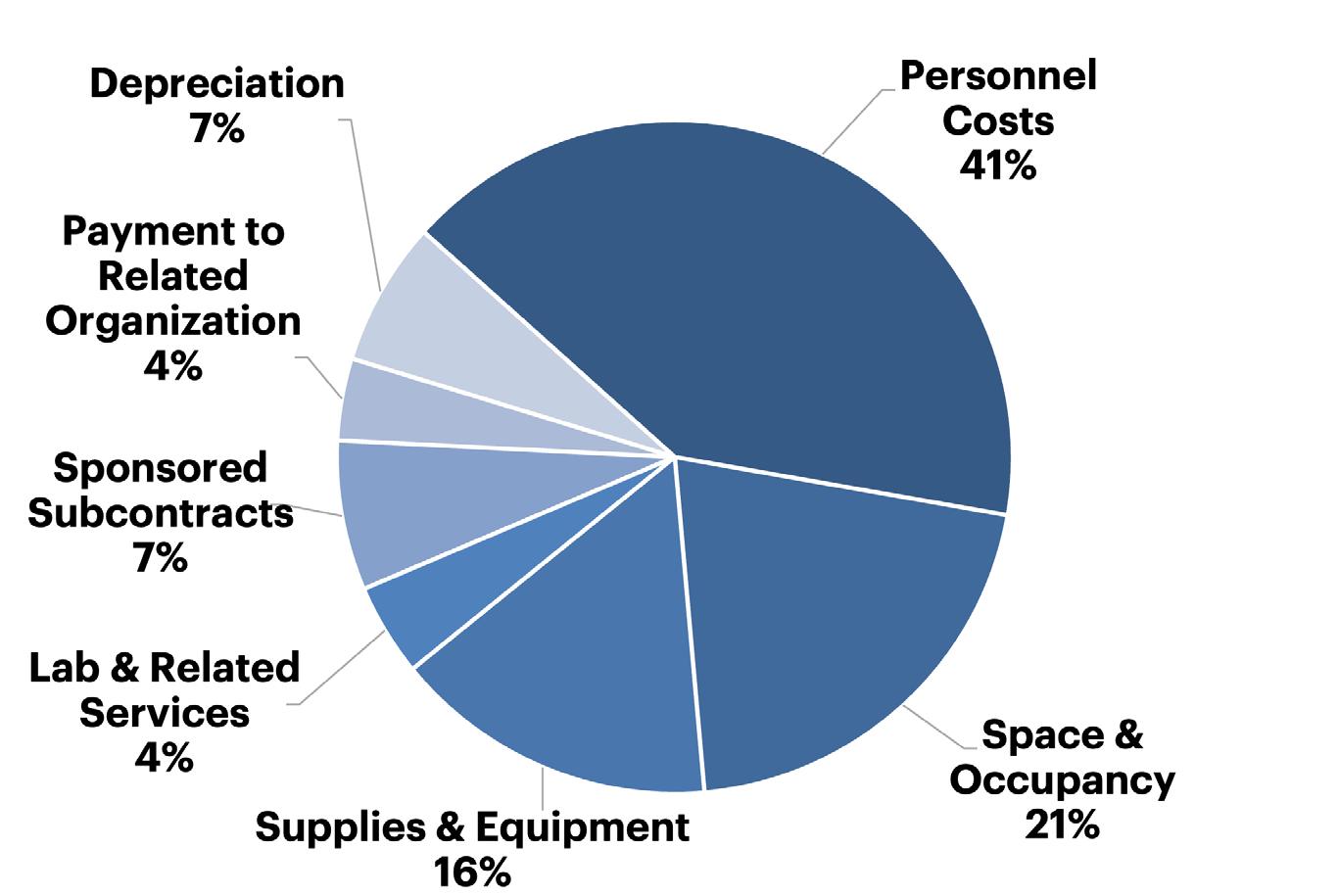
In fiscal year 2024, the Institute reported total operating expenses of $85.9 million. The largest share, $35.3 million, was dedicated to Personnel Costs, underscoring the Institute’s commitment to attracting and retaining exceptional faculty, researchers, and staff who drive innovation and excellence across all areas of the work. A total of $17.9 million is invested in Space & Occupancy, ensuring the space and facilities support the cuttingedge research and collaborative work. An additional $32.7 million went toward Supplies, Equipment, Lab Services and Others.
These expense allocations reflect the Institute’s intentional alignment of resources with its mission, ensuring that it directly supports innovation, excellence, and society impact.
Don Ingber, M.D., Ph.D., Founding Director, Wyss Institute; Judah Folkman Professor of Vascular Biology, Harvard Medical School and Boston Children’s Hospital; Hansjörg Wyss Professor of Biologically Inspired Engineering, Harvard John A. Paulson School of Engineering and Applied Sciences
Natalie Artzi, Ph.D., Associate Institute Director, Wyss Institute; Hansjörg Wyss Professor of Biologically Inspired Engineering, Department of Medicine, Harvard Medical School and Brigham and Women’s Hospital
Angelika Fretzen, Ph.D., M.B.A., Chief Operating Officer and Technology Translation Director
Matt Makarewicz, M.B.A, Chief Financial Officer
Natalie Artzi, Ph.D., Drug Delivery, HMS, BWH, MIT
Christopher Chen, M.D., Ph.D., Tissue Engineering, BU
George Church, Ph.D., Genome Engineering, HMS
Jim Collins, Ph.D., Synthetic Biology & Machine Learning, MIT

Don Ingber, M.D., Ph.D., Cell Biology, Bioengineering & Medicine, HMS, BCH, Harvard SEAS
Jennifer Lewis, Sc.D., Materials Science & 3D Printing, Harvard SEAS
Samir Mitragotri, Ph.D., Chemical Engineering, Harvard SEAS
Dave Mooney, Ph.D., Tissue Engineering, Harvard SEAS
William Shih, Ph.D., Biophysics & Nanotechnology, HMS, DFCI
Pam Silver, Ph.D., Synthetic Biology, HMS
David Walt, Ph.D., Chemistry & Diagnostics, HMS, BWH
Peng Yin, Ph.D., Nanotechnology & Computer Science, HMS
Hansjörg Wyss, M.B.A., Co-Chair, Entrepreneur and Philanthropist
John H. Shaw, Ph.D., Co-Chair, Vice Provost for Research, Harvard University
Robert (Bob) P. Bland, Retired Business Executive
George Q. Daley, M.D., Ph.D., Dean, Harvard Medical School
Sandra L. Fenwick, M.P.H., Former Chief Executive Officer, Boston Children’s Hospital
Norbert P. Haas, Ph.D., Director Emeritus, Center for Musculoskeletal Surgery, Charité University of Medicine Berlin
Kenneth R. Lutchen, Ph.D., Vice President of Research, Boston University
Molly McUsic, J.D., President, The Wyss Foundation
David Parkes, Ph.D., Dean, Harvard
John A. Paulson School of Engineering and Applied Sciences
Philip Reilly, M.D., J.D., Former Venture Partner, Third Rock Ventures, Biotech Entrepreneur
Meredith Weenick, M.B.A., Executive Vice President, Harvard University
The Wyss Institute is a non-profit organization, and your support is essential to keep our discoveries moving from the lab to the market, where they can change lives. We rely on contributions from individual donors, foundations, industry leaders, and government agencies who share our vision for a healthier, more sustainable world.
By joining our community today, you ensure that groundbreaking research continues and that transformative solutions reach the patients and communities who need them most.
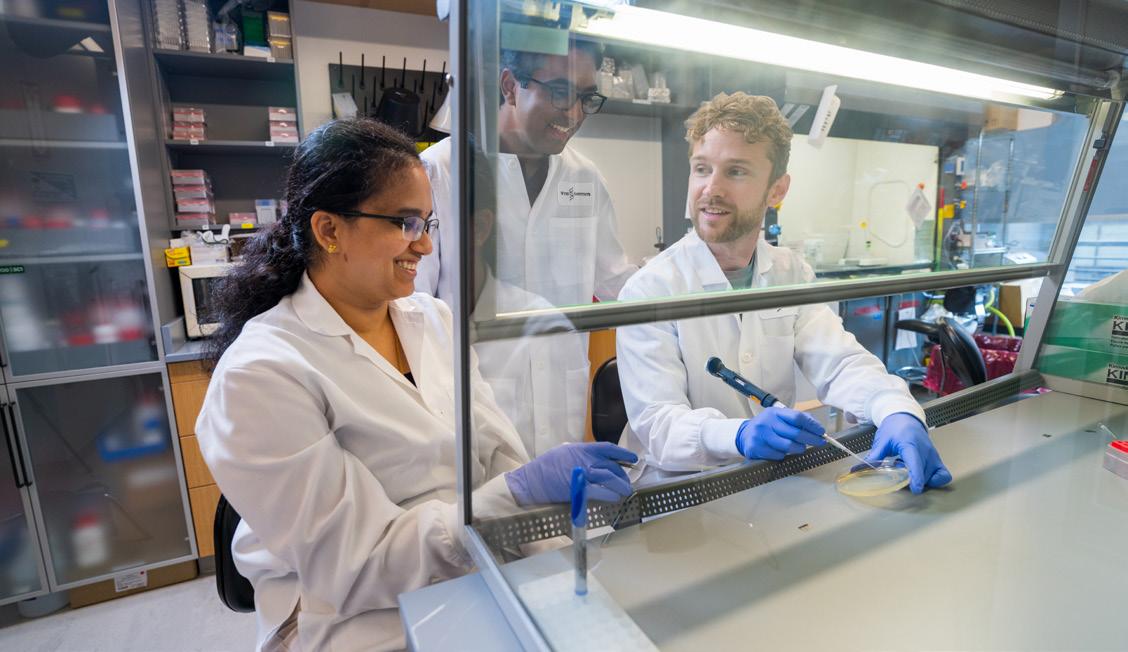
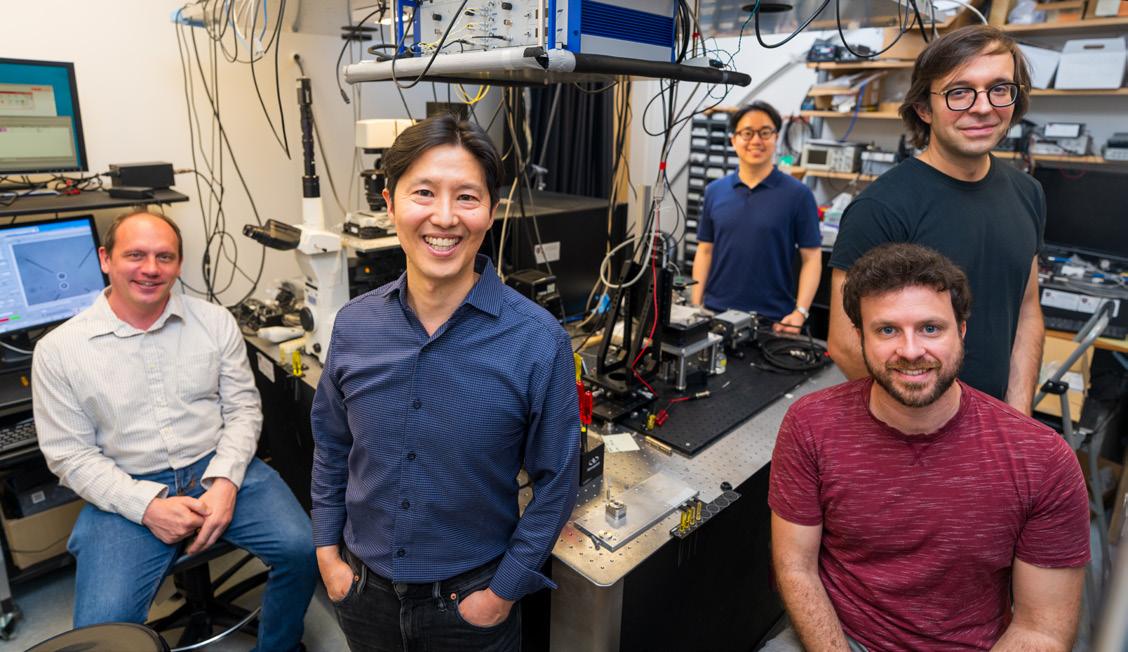
The Wyss Institute at Harvard University is a 501(c)(3) nonprofit charity. Donations are 100% tax-deductible within the limits of the law. Connect with Jonelle Prill-Tate, Director of Strategic Engagement, to explore how your vision can spark the next world-changing innovation.
jonelle.prill-tate@wyss.harvard.edu
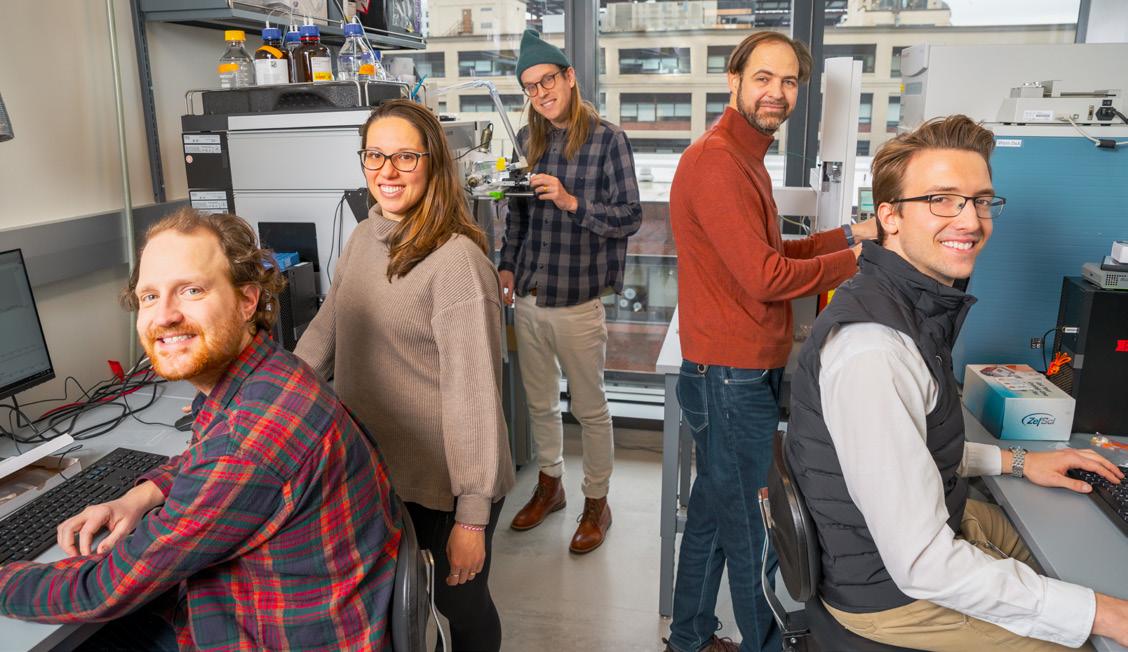
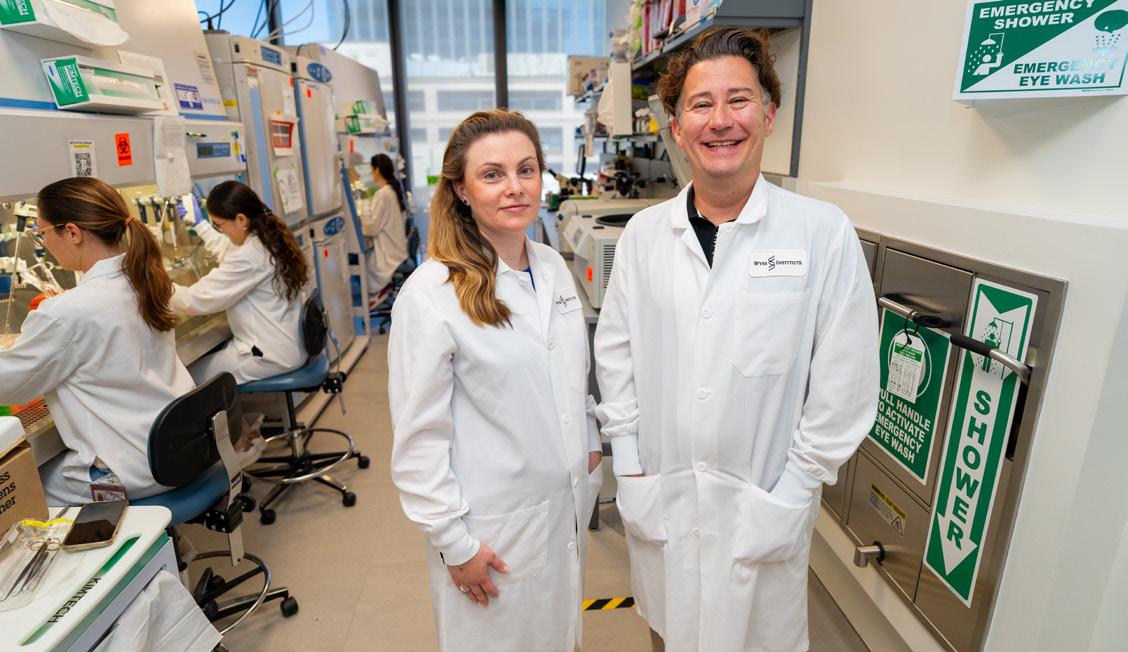
Nature-inspired breakthroughs: By emulating and enhancing Nature’s own designs, Wyss researchers create bold, biologically-inspired solutions that span healthcare, sustainability, and beyond.
Translation at the core: Our discoveries don’t sit on the shelf. The Wyss has an unmatched track record of moving ideas out of the lab and into the world, enabling more than 4,700 patents, 153 licensing deals, and 71 startups to date with many of our technologies now being marketed nationally and internationally.
Collaborative, fearless innovation: Innovation here is never siloed. Scientists, engineers, and clinicians freely share ideas in a dynamic, collaborative environment that fosters bold thinking and rapid progress.
Urgency and impact: The world’s toughest challenges can’t wait. The Wyss accelerates the development and deployment of solutions for critical issues like cancer, women’s health innovation, climate change, and infectious disease.
A proven engine for real-world change: From organ chips that replace animal testing and transform drug development to gene editing that enables the creation of organs for transplant patients, Wyss breakthroughs are reshaping medicine, sustainability, and diagnostics worldwide.


Your support fuels bold ideas, accelerates breakthroughs, and drives real-world solutions for patients and our planet.
Make a gift today.
wyss.harvard.edu/giving
